
The Project Gutenberg EBook of Princess Mary's Gift Book, by Various
This eBook is for the use of anyone anywhere at no cost and with
almost no restrictions whatsoever. You may copy it, give it away or
re-use it under the terms of the Project Gutenberg License included
with this eBook or online at www.gutenberg.org
Title: Princess Mary's Gift Book
All profits on sale given to the Queen's "Work for Women"
Fund which is acting in Conjunction with The National
Relief Fund
Author: Various
Illustrator: Various
Release Date: May 2, 2012 [EBook #39592]
Language: English
Character set encoding: ISO-8859-1
*** START OF THIS PROJECT GUTENBERG EBOOK PRINCESS MARY'S GIFT BOOK ***
Produced by Chris Curnow, Emmy and the Online Distributed
Proofreading Team at http://www.pgdp.net





| 
Spartan Hearts, by Beatrice Harraden, was first published in a volume entitled "Untold Tales of the Past"; Big Steamers, by Rudyard Kipling, in "A History of England," by C. R. L. Fletcher and Rudyard Kipling; Bimbashi Joyce, by Arthur Conan Doyle, in "The Green Flag, and other Stories"; and we have to thank Messrs. William Blackwood & Sons, The Oxford University Press, and Messrs. Smith, Elder & Co. for permission to include these contributions in Princess Mary's Gift Book. With these exceptions the poems and stories in this book have not previously been issued in volume form. The illustrations have all been specially painted and drawn, and an exhibition of the work of the artists who have thus contributed to Princess Mary's Gift Book will be held at the Leicester Galleries, Leicester Square, W.C., and the originals sold in aid of the Queen's "Work for Women" Fund. | ||||||||||||||||||||||||||||||||||||||||||||||||||||||||||||||||||||||||||||||||||||||||||||||||||||||||||||||||||||||
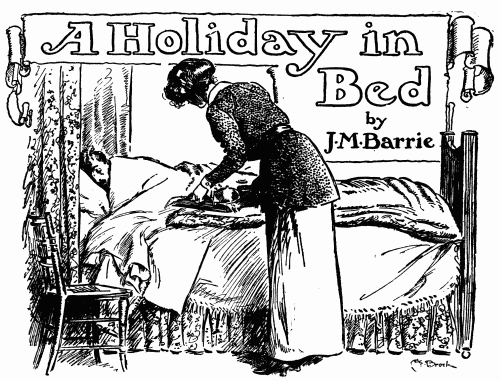
Sympathy is what all the world is craving for, and sympathy is what the ordinary holiday-maker never gets. How can we be expected to sympathise with you when we know you are off to Perthshire to fish? No; we say we wish we were you, and forget that your holiday is sure to be a hollow mockery; that your child will jam her finger in the railway carriage, and scream to the end of the journey; that you will lose your luggage; that the guard will notice your dog beneath the seat, and insist on its being paid for; that you will be caught in a Scotch mist on the top of a mountain, and be put on gruel for a fortnight; that your wife will fret herself into a fever about the way the servant, who has been left at home, is treating her cousins, the milkman, and the policeman; and that you will be had up for trespassing. Yet, when you tell us you are off to-morrow, we have never the sympathy to say, "Poor fellow, I hope you'll pull through somehow." If it is an exhibition you go to gaze at, we never picture you dragging your weary legs from one department to another, and wondering why your back aches. Should it be the seaside, we talk heartlessly to you about the "briny," though we must know, if we would stop to think, that if there is one holiday more miserable than all the others, it is that spent at the seaside, when you wander along the weary beach and fling pebbles at the sea, and wonder how long it will be till dinner-time. Were we to come down to see you, we should probably find you, not on the beach, but moving slowly through the village, looking in at the one milliner's window, or laboriously reading what the one grocer's labels say on the subject of pale ale, compressed beef, or vinegar. There was never an object that called aloud for sympathy more than you do, but you get not a jot of it. You should take the first train home and go to bed for three days.
To enjoy your holiday in bed to the full, you should let it be vaguely understood that there is something amiss with you. Don't go into details, for they are not necessary; and, besides, you want to be dreamy more or less, and the dreamy state is not consistent with a definite ailment. The moment one takes to bed he gets sympathy. He may be suffering from a tearing headache or a tooth that makes him cry out; but if he goes about his business, or even flops in a chair, true sympathy is denied him. Let him take to bed with one of those illnesses of which he can say with accuracy that he is not quite certain what is the matter with him, and his wife, for instance, will want to bathe his brow. She must not be made too anxious. That would not only be cruel to her, but it would wake you from the dreamy state.[3] She must simply see that you are "not yourself." Women have an idea that unless men are "not themselves" they will not take to bed, and as a consequence your wife is tenderly thoughtful of you. Every little while she will ask you if you are feeling any better now, and you can reply, with the old regard for truth, that you are "much about it." You may even (for your own pleasure) talk of getting up now, when she will earnestly urge you to stay in bed until you feel easier. You consent; indeed, you are ready to do anything to please her.
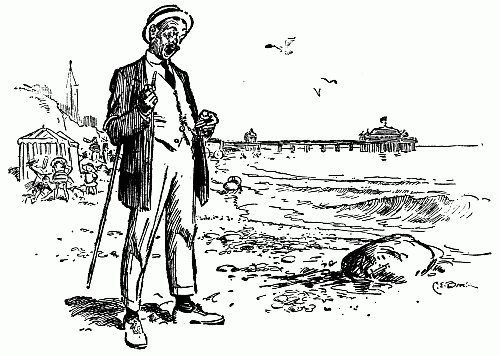 And wonder how long it will be till dinner-time
And wonder how long it will be till dinner-time
The ideal holiday in bed does not require the presence of a ministering angel in the room all day. You frequently prefer to be alone, and point out to her that you cannot have her trifling with her health for your sake, and so she must go out for a walk. She is reluctant, but finally goes, protesting that you are the most unselfish of men, and only too good for her. This leaves a pleasant aroma[4] behind it, for even when lying in bed, we like to feel that we are uncommonly fine fellows. After she has gone you get up cautiously, and, walking stealthily to the wardrobe, produce from the pocket of your greatcoat a good novel. A holiday in bed must be arranged for beforehand. With a gleam in your eye you slip back to bed, double your pillow to make it higher, and begin to read. You have only got to the fourth page, when you make a horrible discovery—namely, that the book is not cut. An experienced holiday-maker would have had it cut the night before, but this is your first real holiday, or perhaps you have been thoughtless. In any case you have now matter to think of. You are torn in two different ways. There is your coat on the floor with a knife in it, but you cannot reach the coat without getting up again. Ought you to get the knife or to give up reading? Perhaps it takes a quarter of an hour to decide this question, and you decide it by discovering a third course. Being a sort of an invalid, you have certain privileges which would be denied you if you were merely sitting in a chair in the agonies of neuralgia. One of the glorious privileges of a holiday in bed is that you are entitled to cut books with your fingers. So you cut the novel in this way, and read on.
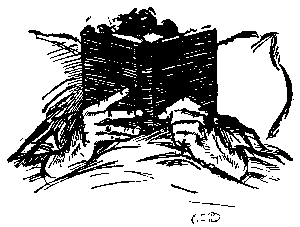 You are in the middle of
a chapter—
You are in the middle of
a chapter—
Those who have never tried it may fancy that there is a lack of incident in a holiday in bed. There could not be a more monstrous mistake. You are in the middle of a chapter, when suddenly you hear a step upon the stairs. Your loving ears tell you that the ministering angel has returned, and is hastening to you. Now, what happens? The book disappears beneath the pillow, and when she enters the room softly you are lying there with your eyes shut. This is not merely incident; it is drama.
What happens next depends on circumstances. She says, in a low voice:
"Are you feeling any easier now, John?"
No answer.
"Oh, I believe he is sleeping."
Then she steals from the room, and you begin to read again.

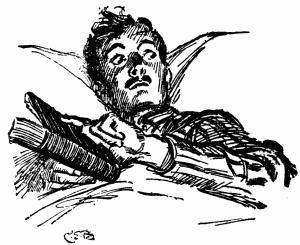 —Suddenly you hear a step
—Suddenly you hear a step
During a holiday in bed one never thinks, of course, of analysing his actions. If you had done so in this instance, you would have seen that you pretended sleep because you had got to an exciting passage. You love your wife, but, wife or no wife, you must see how the passage ends.
Possibly the little scene plays differently, as thus:
"John, are you feeling any easier now?"
No answer.
"Are you asleep?"
No answer.
"What a pity! I don't want to waken him, and yet the fowl will be spoilt."
"Is that you back, Marion?"
"Yes, dear; I thought you were asleep."
"No, only thinking."
"You think too much, dear. I have cooked a chicken for you."
"I have no appetite."
"I'm so sorry, but I can give it to the children."
"Oh, as it's cooked, you may as well bring it up."
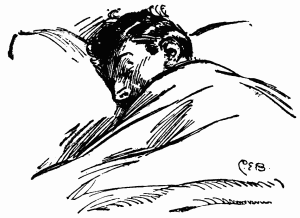 You are lying there with your
eyes shut
You are lying there with your
eyes shut
In that case the reason of your change of action is obvious. But why do you not let your wife know that you have been reading? This is another matter that you never reason about. Perhaps it is because of your craving for sympathy, and you fear that if you were seen enjoying a novel the sympathy would go. Or perhaps it is that a holiday in bed is never perfect without a secret. Monotony must be guarded against, and so long as you keep the book to yourself your holiday in bed is a healthy excitement. A stolen book (as we may call it) is like stolen fruit,[6] sweeter than what you can devour openly. The boy enjoys his stolen apple because at any moment he may have to slip it down the leg of his trousers and pretend that he has merely climbed the tree to enjoy the scenery. You enjoy your book doubly because you feel that it is a forbidden pleasure. Or do you conceal your book from your wife lest she should think you are over-exerting yourself? She must not be made anxious on your account? Ah, that is it.
People who pretend (for it must be pretence) that they enjoy their holiday in the country, explain that the hills or the sea give them such an appetite. I could never myself feel the delight of being able to manage an extra herring for breakfast, but it should be pointed out that neither mountains nor oceans give you such an appetite as a holiday in bed. What makes people eat more anywhere is that they have nothing else to do, and in bed you have lots of time for meals. As for the quality of the food supplied, there is no comparison. In the highlands it is ham and eggs all day till you sicken. At the seaside it is fish till the bones stick in your mouth. But in bed—oh, there you get something worth eating. You don't take three big meals a day, but twelve little ones, and each time it is something different from the last. There are delicacies for breakfast, for your four luncheons and your five dinners. You explain to your wife that you have lost your appetite, and she believes you, but at the same time she has the sense to hurry on your dinner. At the clatter of dishes (for which you have been lying listening) you raise your poor head, and say faintly:
"Really, Marion, I can't touch food."
"But this is nothing," she says, "only the wing of a partridge."
You take a side glance at it, and see that there is also the other wing and the body and two legs. Your alarm thus dispelled, you say:
"I really can't."
"But, dear, it is so beautifully cooked."
"Yes, but I have no appetite."
"But try to take it, John, for my sake."
Then for her sake you say she can leave it on the chair, and perhaps you will just taste it. As soon as she has gone you devour that partridge, and when she comes back she has the sense to say:
"Why, you have scarcely eaten anything. What could you take for supper?"
You say you can take nothing, but if she likes she can cook a large sole, only you won't be able to touch it.
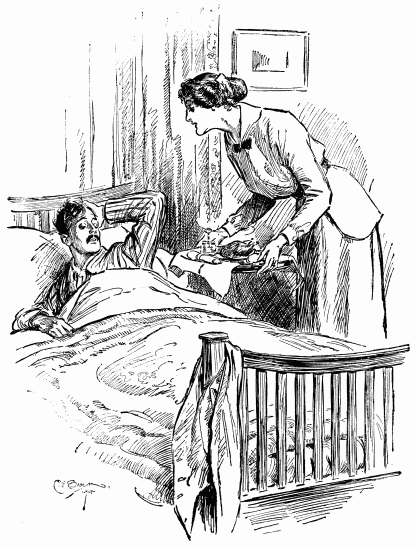 "But try to take it, John, for my sake"
"But try to take it, John, for my sake"
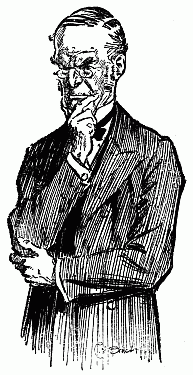 The chances are that he won't
understand your case
The chances are that he won't
understand your case
"Poor dear," she says, "your appetite has completely gone," and then she rushes to the kitchen to cook the sole with her own hands. In half an hour she steals into your room with it, and then you (who have been wondering why she is so long) start up protesting:
"I hope, Marion, this is nothing for me."
"Only the least bit of a sole, dear."
"But I told you I could eat nothing."
"Well, this is nothing, it is so small."
You look again, and see with relief that it is a large sole.
"I would much rather that you took it away."
"But, dear——"
"I tell you I have no appetite."
"Of course I know that; but how can you hope to preserve your strength if you eat so little? You have had nothing all day."
You glance at her face to see if she is in earnest, for you can remember three breakfasts, four luncheons and two dinners; but evidently she is not jesting. Then you yield.
"Oh, well, to keep my health up I may just put a fork into it."
"Do, dear; it will do you good, though you have no caring for it."
Take a holiday in bed, if only to discover what an angel your wife is.
There is one thing to guard against. Never call it a holiday. Continue not to feel sure what is wrong with you, and to talk vaguely of getting up presently. Your wife will suggest calling in the doctor, but pooh-pooh him. Be firm on that point. The chances are that he won't understand your case.

Then Mrs. Clegg C. Mimms rented the Manor House from Lord Manby, and all peace came to an end for us. She described herself on her visiting cards as "the Honourable Mrs. Mimms," and that disturbed us to begin with. We had to meet each other pretty frequently to discuss how she could be the Honourable Mrs. anything. She was plainly and unmistakably an American, and the vicar was of opinion that, since there are no titles in the American Republic, neither Mrs. Mimms nor her late husband could be the descendant of a lord. Hankly, who has seen a great deal of the world, told us that American ambassadors are styled the Right Honourable, and that Mrs. Mimms's husband might[10] have been an ambassador. The Colonel maintained that ambassadors are like bishops and cannot share their official titles with their wives, particularly after they are dead. My own view was that if Mrs. Mimms wanted to be styled "the Honourable" it would be discourteous to deny her the title.
We had hardly settled down again after deciding this point when Mrs. Mimms upset us still more seriously. She gave a Christmas Tree to the village children. At first we thought that this would not matter to any one except the vicar. We were mistaken about that. Mrs. Mimms made us all help. The Colonel and I spent a long afternoon on a step-ladder sticking candles on the branches. Hankly, who is a lean, yellow little man, was made to dress himself up as "Father Christmas." We got no dinner on the evening of the party, and very nearly had to dance with the children afterwards. The presents which Mrs. Mimms distributed to the children were of the most gorgeous and expensive kind. We all agreed that she must be enormously rich, and the Colonel said that she would demoralise the whole village.
She certainly demoralised us. We found ourselves invited to dinner at the Manor House twice, sometimes three times, a week, and had a standing invitation to supper every Sunday night. It was no use refusing the invitations. I tried that twice; but Mrs. Mimms simply came round to my house in her motor and fetched me. The Colonel complained bitterly. He has been writing a book on Chhota Nagpur ever since I knew him, and he said that he hated being interrupted in the evenings. He only dined with Mrs. Mimms in order to avoid unpleasantness with his wife, who wanted to go. Hankly said plainly that Mrs. Mimms had a very good cook, and we all came in the end to accept that as our excuse for dining with her.
It is, I know, scarcely credible, but last Easter she dragged us into private theatricals. By that time we had agreed that Mrs. Mimms, in spite of her annoying lack of repose, was a very kind-hearted woman, and we did not wish to snub her in any way. My own part in the play let me in for a love scene with Mrs. Challenger, the most grotesquely absurd thing imaginable, for the lady is sixty at least and enormously fat. I should never have agreed to do it, however good-hearted Mrs. Mimms might be, if Hankly had not been cast for the part of an heroic Christian curate, and I knew he would look even more foolish than I did when I kissed Mrs. Challenger's left ear. Hankly hated being an heroic Christian curate and did not do the part at all well. We got through the theatricals in June, and after that, except for a couple of picnics every week, we had a comparatively quiet time until the[11] war broke out. Mrs. Mimms broke out at the same time. All festivities, even picnics, stopped at once, of course, and we all began to take life very strenuously. Mrs. Mimms outdid us easily in every form of activity.
She began by erecting a flag-staff at the Manor House gates and hoisting an enormous American flag on it, the largest American flag I have ever seen. The Colonel, who had his motor decorated with a French and a Belgian flag as well as a Union Jack, said that Mrs. Mimms's Stars and Stripes were, under the circumstances, rather bad form. Hankly and I agreed with him, and we made the vicar speak to her about it. She explained to him that she had hoisted it entirely for our good. It was, so she told the vicar, and he told us, the only flag in the world which the Germans would respect, and that when the Uhlans entered our village we could all congregate in perfect safety under its folds. The Colonel was furious—we were all rather angry—at the idea that the Germans would ever set foot in England; but there was no denying that Mrs. Mimms meant to be kind when she hoisted the flag. Besides, she is a difficult woman to argue with, and we did not quite see how we could make her take the thing down.
Hankly and I more or less forgave her, though, as it appeared, the Colonel did not, when she came forward at a meeting summoned by the vicar and offered to turn the Manor House into a hospital for wounded soldiers. The generosity of her proposal actually staggered us. She intended, so she said—and I quite believe it—to turn out all the existing furniture of the house, fit the place up with the latest sanitary devices, hire two surgeons and a competent staff of nurses who should be under her own personal supervision. We at once wired to the War Office and expected to be thanked gratefully. As a matter of fact we never got any official acknowledgment of the offer at all. What we did get—or rather what Mrs. Mimms got—was a letter from Lord Manby's solicitor pointing out that the agreement under which she had taken the Manor House did not allow of her getting rid of the furniture or using the place in any way except as an ordinary dwelling.
I thought that Lord Manby was a little unsympathetic, and that the War Office might very well have replied to our telegram, but the Colonel took quite a different line. He said that Mrs. Mimms was an interfering old woman who deserved to be snubbed. We all hoped that after this set-back she would be a little subdued and allow us to manage our own war in our own way.
For a time she kept tolerably quiet. She contented herself with making shirts and subscribing to various funds like any ordinary woman.[12] She was, so my wife told me, an amazingly rapid worker, and could turn out three shirts while any other woman in the village was making two. Her subscriptions were very generous. Gradually the whole activities of our village centred in the Manor House. Mrs. Mimms put up another flag-staff and flew a large Red Cross from it. Working parties went on in her dining-room from morning to night, and hardly a day passed without a committee meeting. The vicar, Colonel Challenger, Hankly, and I were the committee, and we met whenever Mrs. Mimms summoned us. The vicar was supposed to preside, but it was Mrs. Mimms who suggested the things we did. The Colonel objected, in private, to every suggestion she made, but he never succeeded in carrying a point against her. Once or twice she got us into trouble. There was, for instance, a lot of ill feeling when we sealed up the village pump and set my chauffeur to keep guard over it with a gun, only allowing people to draw water for an hour in the morning and an hour in the evening. Mrs. Mimms had a theory that a German might come in an aeroplane and poison our water supply. That would have been a horrible thing: but the people in the village made a fuss about not being able to get at the pump. Tompkins, the innkeeper, who was particularly objectionable, said that he only used the water for washing and would rather have it poisoned than do without it.
We all began to get rather tired of being rushed into doing things we didn't want to do; but we were none of us able to withstand Mrs. Mimms. The Colonel said that we ought to drive her out of the village altogether, but he never succeeded in suggesting any practical way of doing it.
Fortunately she got tired of making shirts and holding committee meetings after about a month. Then she said she was going up to London to get a few families of Belgian refugees. We were all greatly pleased, for we felt that her energies might be turned into a channel which would save us from making fools of ourselves. I saw her off at the station, and we waited with the greatest curiosity to see what would happen. I suppose the Belgian Consul felt doubtful about Mrs. Mimms when he met her. At all events she came back without a single refugee. Most women would have been a little disappointed at a failure like that, but Mrs. Mimms was as full of energy as ever. She had, it appeared, called at several public offices in London and had been immensely impressed by the Boy Scouts whom she saw waiting about the doors.
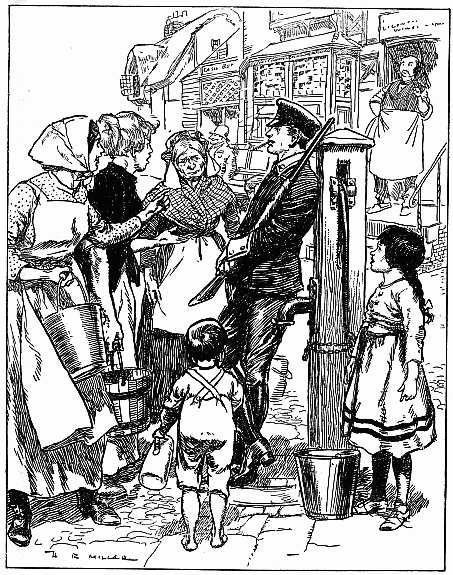 We sealed up the village pump and set my chauffeur to keep guard
We sealed up the village pump and set my chauffeur to keep guard
"They're the cutest things I've seen in England," she said, "and their bare knees are just sweet. I could kiss them all day. I simply must have a couple to stand on guard while the working parties are going on."
I talked to the vicar, Hankly, and the Colonel about this. I did not see how we could possibly provide Mrs. Mimms with Boy Scouts, for there were none in the parish. The vicar said he was sorry that he had not started the organisation long ago, but supposed it was too late to do so now. To my surprise the Colonel, who up to that time had been getting angrier and angrier with Mrs. Mimms, took her side and said that if she wanted Boy Scouts she ought to have them. He proposed that we should enrol four choir boys at once, and offered to buy uniforms for them himself. The vicar was a little doubtful, but Hankly and I backed up the Colonel. We were very tired of the constant committee meetings, and we hoped that if Mrs. Mimms got really interested in Boy Scouts she might let us alone. We acted promptly, and in a week had four boys ready to stand on guard at the doors of the Manor House.
The Colonel gave them a talking to at their first parade. He impressed on them the fact that discipline and strict obedience to orders are the essence of a military manhood. He quoted Tennyson, and made the boys repeat the lines after him:
He succeeded in inspiring them with a tremendous sense of their own importance. My idea was that he was trying to prepare them for having their knees kissed by Mrs. Mimms.
For a time everything went well. The boys got off going to school and were immensely pleased. Mrs. Mimms fed them with dainties at odd hours of the day, and always had a basket of apples in the porch from which they could help themselves. So far as I knew she never attempted to kiss either their knees or any other part of them. The Colonel kept on exhorting them. He paid them a visit every morning, and insisted on their reporting themselves at his house when they went off duty in the evening.
About a fortnight after the boys first went on guard Mrs. Mimms complained to the vicar that she had found one of them concealed under the dining-room table while she was at luncheon. She said that she did not like the feeling that she might kick a boy every time she stretched her leg while she was at meals. The vicar, of course, promised to speak to the boy.
The next day Mrs. Mimms made another complaint. One of the[14]
[15]
boys had climbed up by some creepers, and was found by her maid
sitting on the window-sill of a bedroom early in the morning. It was
not Mrs. Mimms's bedroom, but, as she explained, it might have been.
She had no particular objection, so she told the vicar, to a Boy Scout
in her bedroom at any reasonable hour, but she did not want the child
to break his neck.
Then the postmaster gave me a hint that Mrs. Mimms's letters, which were posted every day by one of the Scouts, showed signs of having been opened and closed again before they came into his hands. He said that if this was being done by the Colonel's orders it was all right, but he thought he ought to tell me about it. I met the vicar in the street immediately afterwards and said I thought the Scouts were getting out of hand and ought to be disbanded at once. He agreed with me.
While we were discussing the matter Hankly came up to us and said he heard that Mrs. Mimms was to be arrested at once as a German spy.
"Tompkins," he said, "is going about the village saying that she ought to be shot."
Tompkins always blamed Mrs. Mimms for the sealing up of the village pump, and had never spoken a good word about her since. The vicar was greatly put out.
"Tut—tut!" he said; "arrested! shot! Nonsense. Mrs. Mimms is a most estimable lady."
"I'm not so sure about that," said Hankly. "Those boys have been watching her lately, and there are several things which look suspicious."
I suppose the vicar and I showed our surprise. Hankly went on to explain.
"She gives the boys peaches and grapes," he said, "and cakes and meringues. Now I put it to you—the apples of course I understand. I might give a boy an apple myself, but I put it to you, vicar, would anybody give boys like that hothouse grapes and peaches unless—well, unless there was something to conceal. It's not a natural thing to do."
"Now I come to think of it," said the vicar, "I did meet one of them yesterday with a peach in his fist."
"There you are," said Hankly triumphantly, "and, anyhow, the police inspector is coming over to-day to look into the matter."
Mrs. Mimms was not actually arrested. The police inspector—acting on information received from the Boy Scouts, Tompkins, and[16] indeed almost every one in the village—made a lot of inquiries about her. He did not succeed in finding out why she called herself "the Honourable," but the questions he asked her made her so angry that she packed up her trunks and left the village at once.
I met the Colonel the day after she left, and told him I was afraid we should all miss her. The Colonel chuckled in a self-satisfied way.
"I told you we ought to get rid of her," he said, "and we have."
"You don't mean to say you think she was really a spy?" I said.
"She was a good deal worse," said the Colonel; "she was a public nuisance."
Later on the Colonel took a kindlier view of Mrs. Mimms.
"Only for her," he said to me a week ago, "we shouldn't have had Boy Scouts here. We have quite a good company now. She did us that much good, anyhow."
The Colonel did her no more than bare justice. Our Scouts, though they have caught no more spies, have improved the general tone of the village. The Colonel is their commanding officer, and, though I do not say so in public, they have done him a lot of good.
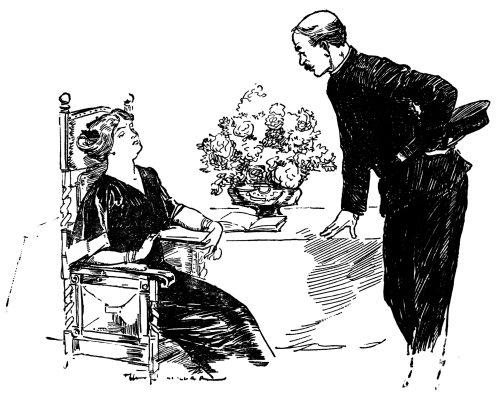
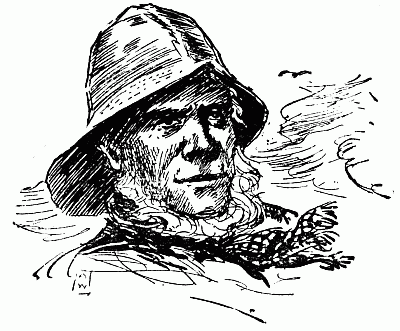
| CHARLIE THE COXA LIFE POEMBY HALL CAINE Painting by CHARLES NAPIER HEMY, R.A. Drawings by ARCH. WEBB |
Years ago, in a terrific gale, a ship from Norway, the St. George, came dead on for the wildest part of our coast, the fierce headland that lies back of the old Castle rock. The sound signal was fired, and Charlie and his brave comrades went out to her. She was reeling on the top of a tremendous sea, and there was no coming near to her side.

It was an awful task to get the crew aboard the lifeboat, but Charlie saved every soul, and lost not a hand of his own. When the "traveller" was rigged and the "breeches" were ready, and the crew of the doomed ship were at the bulwarks waiting to leave her, Charlie sang out over the clamour of the sea:
"How many are you?"
"Twenty-four," came back as answer.
Then Charlie cried, "I can see only twenty-three."
"The other man is hurt. He's dying. No use saving him," the Norseman shouted.
"You'll bring the dying man on deck before a soul of you leaves the ship," cried Charlie.
There was a woman among them, and when the carpenter came scudding down the rope he had a canvas bag on his back.
"No tools here," shouted Charlie.
"It's the child," said the man.
The captain came next. He had left everything else behind him—his money, his instruments, his clothes, his ship—but out of his pocket there peeped the head of a baby's doll.
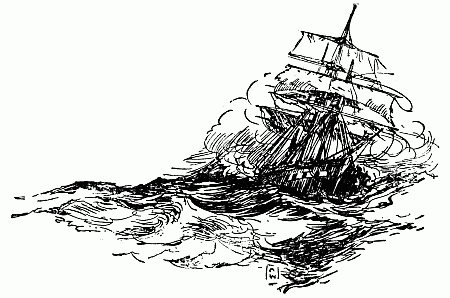
It was a thrilling rescue, but to see it in all its splendour you must have a drop of our[18] Manx blood in you. Our forefathers were from Norway, our first Norse king was named Gorry. He landed on this island, not far from this spot. And on that day of the wreck of the St. George his children's children rescued from the sea the children's children of the kinsmen he had left at home.
Most of our men had Norse names. One of them was a Gorry, lineal descendant beyond doubt of the old sea king. The Norwegian Government felt the touch of great things in this incident. It was not merely that the bravery of the rescue fired their gratitude. Something called to them from that deep place where blood answers to the cry of blood. They sent medals for Charlie and his crew, and the Governor of the island distributed them inside the roofless walls of the old castle of the "Black Dog." It was like grasping hands with the past across the space of a thousand years.
The other day we had another great wind and another brave rescue. The sun had gone down overnight in a sullen red, very fierce and angry in his setting, and out of the black north-east the storm had come up while we slept. In the heavy grey of the dawn the sound-signal fired its double shot over our little town. A Welsh schooner, which had run in for shelter during the dark hours, was riding to an anchor in the bay and flying her ensign for help.
The sea was terrific—a slaty grey, streaked with white foam, like quartz veins. It was coming over the breakwater in sheets that hid it. Sometimes it was flying in clouds to the top of the round tower of the castle. The white sea-fowl were like dark specks darting through it, but no human ear could hear the cry of their thousand throats in the thunderous quake of the breakers on the cavernous rocks.
A crowd of men answered the call, and there was no shortness of hands to man the lifeboat. The big, slow-legged fellows who had been idling on the quay the day before when the sea was calm were struggling, chafing, and quarrelling to go out on it now that it was in storm, for the blood of the old Vikings is in our Manxmen still.
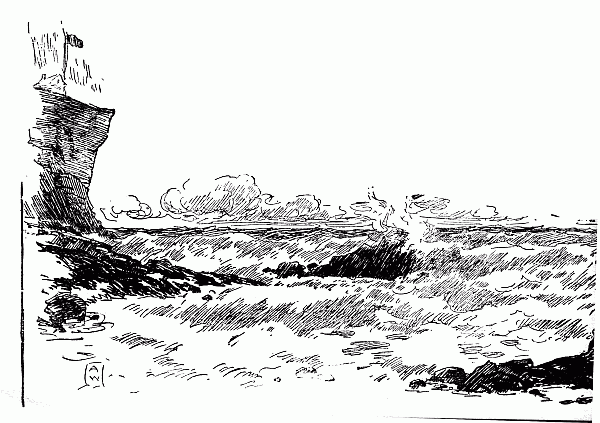
It was a splendid rescue. The crew of the Welshman were brought ashore. Then the abandoned schooner rode three hours[19] longer in the gale, and a hundred men stood and watched her, talking of other winds and other wrecks, and of Peel boys who were out on the sea. At last the ship parted her cables and went rolling like a blinded porpoise dead on for the jagged coast.
Seven men took an open fishing-boat and went after her, and we climbed the Head to look at them. The wind smote us there like an invisible wing, sometimes swirling us out of our course, often bringing us to our knees, and whipping our ears with our hair like rods. Sheets of spray were coming up to us from below and running along the cliffs like driven rain. The sun, which had broken in fierce brilliance from a green rent in the sky, made rainbows in the flying foam.
From the heights we watched the seven men and the open boat. They rose and fell, appeared and disappeared, but they overtook the Welshman before she had drifted on to the coast, boarded her with difficulty, let go another anchor and made her tight. There was nothing else to do, for she was disabled, and her sails were torn to shreds. The new anchor held the ship an hour longer, and then there was no help left for her. She was within a hundred feet of the rocks, and she fell on them with the groan of a living creature.
The instant her head was down the white lions of the sea leapt over her, the water swirled through her bulwarks and plunged down her hatch; her helm was unshipped, her sails were torn from their gaskets, and the floating home wherein men had sailed and sung and slept and laughed and jested was a broken wreck in the heavy wallowings of the waves.
When it was over and we were coming back, drenched through and green with the drift of the sea foam caked thick on our faces, some of us began to think of Charlie. He had not been there that day. A year or more ago, in the prime of a splendid manhood, he was stricken by heart disease. He kept a good heart, nevertheless, and by indomitable will held on for some time. First a little work, then no work at all, only a sail now and then if the sea was calm, but of late hardly ever well enough to take the open air. The old hulk of his poor body had been anchored deep, but she was parting her cables at last.
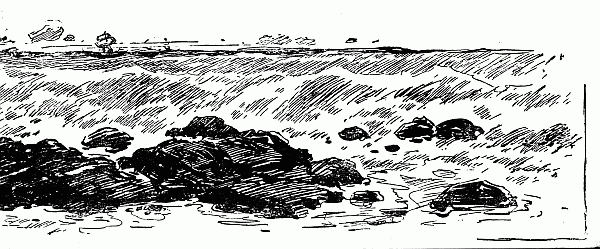
Charlie lay dying while this second rescue was being made. He had not answered the signal for the lifeboat, but he had heard it in the[20] fierce light of morning, and they could not keep him in bed. The soul of the old sea dog leapt to the call, but his ailing body held him down. He wanted to go out. Wasn't he cox? Had the boat ever gone out without him?
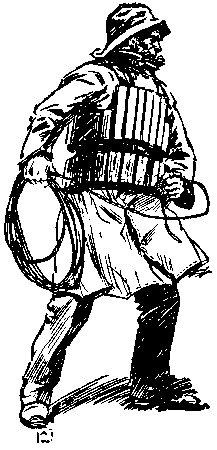
His house is one of the little places like children's Noah's arks which dot the line of this hungry shore. He could hear everything and see a good deal. Often he could hardly keep himself from crying and shouting aloud. In spirit he was out on the boiling surf, dipping, rising, stooping, going over, righting again, clambering back, exulting, glorying, getting nearer the ship, standing off her, rigging the "traveller," and fetching men aboard in the "breeches." And then away from the rolling hulk, and sing ho, my lads, and haul through the white waves for home. But his poor dying body was down on the bed and his face was sickly scarlet.
Charlie's volcanic soul did not go off to the deep of deeps on the big breakers and through the wild noises of the storm. He died later. After the great wind there came a great calm. The air was quiet and full of the odour of seaweed; banks of seaweed were on the shore, and the broken schooner was covered with brown wrack, like any rock of the coast; the sky was round as the inside of a shell, and pale pink like the shadow of flame; the water was smooth, and land and sea lay like a sleeping child. In this broad and steady weather our little town was startled by the double shot again. We went to the windows in surprise, and saw the red flag over the rocket house, which is the signal for the lifeboat.
Charlie was dead. He had just breathed his last, and his rugged comrades, who know nothing of poetry, but are poets nevertheless to the deepest grain of them, had run up the flag mast-high (not half-mast) as signal to the Great Cox of all that here was a soul in the troubled waters of death waiting for the everlasting lifeboat to bear him to the eternal shore.
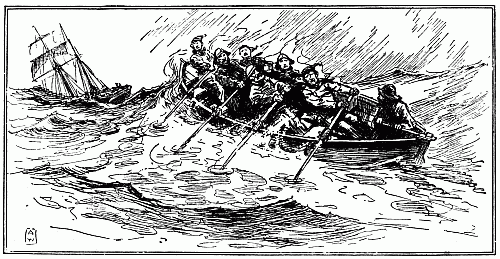
The sea takes some of our bravest and best. Charlie it did not take. Not so sure is it that he who lives by the sword will perish by the sword, as that he who baulks the sea the sea will surely have for its prey. Charlie had battled with the giant time and again, but he has gone to sleep on the land.
We buried him to-day in the little cemetery looking on to the grey water that was more than half his element. The funeral was beautiful in its old simplicity. First a hymn at the door of the house in the little alley by the beach, "Safe in the arms of Jesus," with the coffin on the ground and all standing round; the sea quiet, hardly a breeze as soft as human breath moving its tranquil surface; the deadly rival in its everlasting coming and going making no triumphant clamour now the sea-warrior was down. Then the companions of his dangers, the crew of his boat, a group of stalwart fellows who have never known what it is to be afraid, carrying him up the hill, shoulder high, each in his red stocking cap and his life-belt, emblems of how they had fought the sea and beaten it.
There were some of us whose eyes were wet, but if these brave boys wept at all, it was only for the helpless little ones left behind. For Charlie they did not weep. His spirit is not dead for them—it cannot die. When brave deeds have to be done, they will see its light, like a beacon that does not fail, over the mountains of the fiercest storm; they will hear its voice above the thunder of the loudest waves.
A full moon is shining to-night on the place of Charlie's rest, and if the old Norse story is true, that while the body lies in sight of the sea the spirit lives in the winds above it, Charlie is not done with his old enemy yet. He will come back to this sea-bound land in warning whispers of the mighty and mysterious power that lures men to itself.
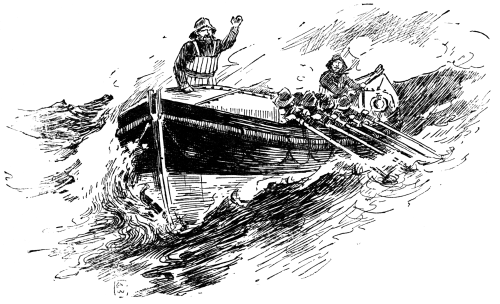
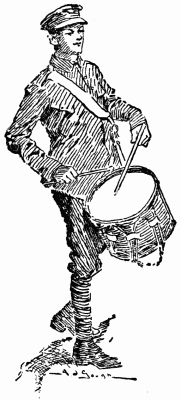
| CANADA'S WORDBY RALPH CONNORDrawings by A. J. GOUGH | 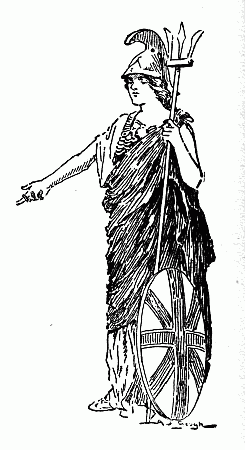
|
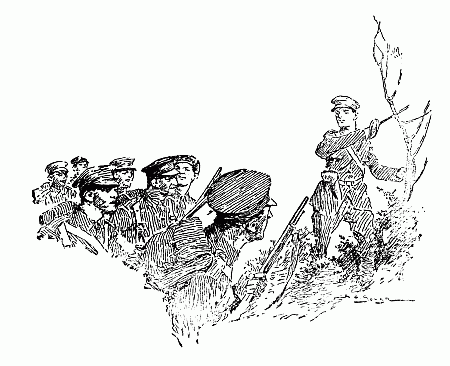
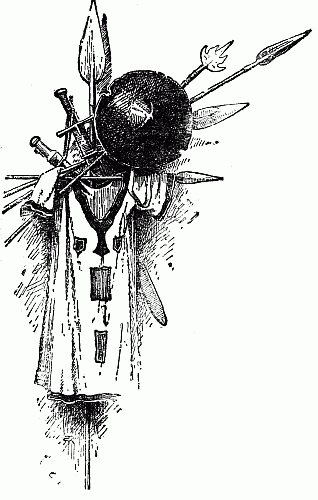
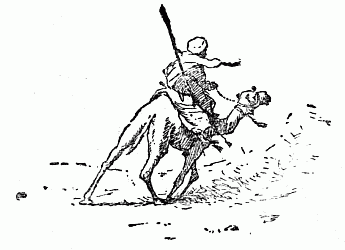
Napoleon had said, and Hilary Joyce had noted, that great reputations are only to be made in the East. Here he was in the East with four tin cases of baggage, a Wilkinson sword, a Bond's slug-throwing pistol, and a copy of "Green's Introduction to the Study of Arabic." With such a start, and the blood of youth running hot in his veins, everything seemed easy. He was a little frightened of the general; he had heard stories of his sternness to young officers, but with tact and suavity he hoped for the best. So, leaving his effects at "Shepherd's Hotel," he reported himself at headquarters. It was not the general, but the head of the Intelligence Department who received him, the chief being still absent upon that business which had called him. Hilary Joyce found himself in the presence of a short, thick-set officer, with a gentle voice and a placid expression which covered a remarkably acute and energetic spirit. With that quiet smile and guileless manner he had undercut and outwitted the most cunning of Orientals. He stood, a cigarette between his fingers, looking at the newcomer. "I heard that you had come. Sorry the chief isn't here to see you. Gone up to the frontier, you know."
"My regiment is at Wady Halfa. I suppose, sir, that I should report myself there at once?"
"No; I was to give you your orders." He led the way to a map upon the wall, and pointed with the end of his cigarette. "You see this place. It's the Oasis of Kurkur—a little quiet, I am afraid, but excellent air. You are to get out there as quick as possible. You'll find a company of the Ninth, and half a squadron of cavalry. You will be in command."
Hilary Joyce looked at the name, printed at the intersection of two black lines without another dot upon the map for several inches around it. "A village, sir?"
"No, a well. Not very good water, I'm afraid, but you soon get accustomed to natron. It's an important post, as being at the junction of two caravan routes. All routes are closed now, of course, but still you never know who might come along them."
"We are there, I presume, to prevent raiding?"

"Well, between you and me, there's really nothing to raid. You are there to intercept messengers. They must call at the wells. Of course you have only just come out, but you probably understand already enough about the conditions of this country to know that[25] there is a great deal of disaffection about, and that the Khalifa is likely to try and keep in touch with his adherents. Then, again, Senoussi lives up that way"—he waved his cigarette to the westward—"the Khalifa might send a messenger to him along that route. Anyhow, your duty is to arrest every one coming along, and get some account of him before you let him go. You don't talk Arabic, I suppose?"
"I am learning, sir."
"Well, well, you'll have time enough to study there. And you'll have a native officer, Ali something or other, who speaks English, and can interpret for you. Well, good-bye—I'll tell the chief that you reported yourself. Get on to your post now as quickly as you can."
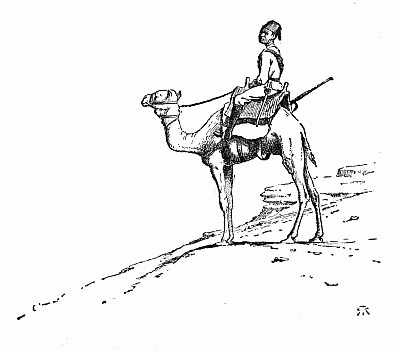
Railway to Baliani, the post-boat to Assouan, and then two day on a camel in the Libyan desert, with an Ababdeh guide, and three baggage-camels to tie one down to their own exasperating pace. However, even two and a half miles an hour mount up in time, and at last, on the third evening, from the blackened slag-heap of a hill which is called the Jebel Kurkur, Hilary Joyce looked down upon a distant clump of palms, and thought that this cool patch of green in the midst of the merciless blacks and yellows was the fairest colour effect that he had ever seen. An hour later he had ridden into the little camp, the guard had turned out to salute him, his native subordinate had greeted him in excellent English, and he had fairly entered into his own. It was not an exhilarating place for a lengthy residence. There was one large, bowl-shaped, grassy depression sloping down to the three pits of brown and brackish water. There, also, was the grove of palm trees beautiful to look upon, but exasperating in view of the fact that Nature has provided her least shady trees on the very spot where shade is needed most. A single wide-spread acacia did something to restore the balance. Here Hilary Joyce slumbered in the heat, and in the cool he inspected his square-shouldered, spindle-shanked Soudanese, with their cheery black faces and their funny little pork-pie forage caps. Joyce was a martinet at drill, and the blacks loved being drilled, so the Bimbashi was soon popular among them. But one day was exactly like another. The weather,[26] the view, the employment, the food—everything was the same. At the end of three weeks he felt that he had been there for interminable years. And then at last there came something to break the monotony.

One evening, as the sun was sinking, Hilary Joyce rode slowly down the old caravan road. It had a fascination for him, this narrow track, winding among the boulders and curving up the nullahs, for he remembered how in the map it had gone on and on, stretching away into the unknown heart of Africa. The countless pads of innumerable camels through many centuries had beaten it smooth, so that now, unused and deserted, it still wound away, the strangest of roads, a foot broad, and perhaps two thousand miles in length. Joyce wondered as he rode how long it was since any traveller had journeyed up it from the south, and then he raised his eyes, and there was a man coming along the path. For an instant Joyce thought that it might be one of his own men, but a second glance assured him that this could not be so. The stranger was dressed in the flowing robes of an Arab, and not in the close-fitting khaki of a soldier. He was very tall, and a high turban made him seem gigantic. He strode swiftly along, with head erect, and the bearing of a man who knows no fear.
Who could he be, this formidable giant coming out of the unknown? The precursor possibly of a horde of savage spearmen. And where could he have walked from? The nearest well was a long hundred miles down the track. At any rate the frontier post of Kurkur could not afford to receive casual visitors. Hilary Joyce whisked round his horse, galloped into camp, and gave the alarm. Then, with twenty horsemen at his back, he rode out again to reconnoitre. The man was still coming on in spite of these hostile preparations. For an instant he hesitated when first he saw the cavalry, but escape was out of the question, and he advanced with the air of a man who makes the best of a bad job. He made no resistance, and said nothing when the hands of two troopers clutched at his shoulders, but walked quietly between their horses into camp. Shortly afterwards the patrol came in again. There were no signs of any dervishes. The man was alone. A splendid trotting camel had been found lying dead a little way down the track. The mystery of the stranger's arrival was explained. But why, and whence, and whither?—these were questions for which a zealous officer must find an answer.

Hilary Joyce was disappointed that there were no dervishes. It would have been a great start for him in the Egyptian army had he fought a little action on his own account. But even as it was, he had a rare chance of impressing the authorities. He would love to show his[27] capacity to the head of the Intelligence, and even more to that grim chief who never forgot what was smart, or forgave what was slack. The prisoner's dress and bearing showed that he was of importance. Mean men do not ride pure-bred trotting camels. Joyce sponged his head with cold water, drank a cup of strong coffee, put on an imposing official tarboosh instead of his sun-helmet, and formed himself into a court of inquiry and judgment under the acacia tree. He would have liked his people to have seen him now, with his two black orderlies in waiting, and his Egyptian native officer at his side. He sat behind a camp-table, and the prisoner, strongly guarded, was led up to him. The man was a handsome fellow, with bold grey eyes and a long black beard.
"Why!" cried Joyce, "the rascal is making faces at me." A curious contraction had passed over the man's features, but so swiftly that it might have been a nervous twitch. He was now a model of Oriental gravity. "Ask him who he is, and what he wants?" The native officer did so, but the stranger made no reply, save that the same sharp spasm passed once more over his face. "Well, I'm blessed!" cried Hilary Joyce. "Of all the impudent scoundrels! He keeps on winking at me. Who are you, you rascal? Give an account of yourself! D'ye hear?" But the tall Arab was as impervious to English as to Arabic. The Egyptian tried again and again. The prisoner looked at Joyce with his inscrutable eyes, and occasionally twitched his face at him, but never opened his mouth. The Bimbashi scratched his head in bewilderment.
"Look here, Mahomet Ali, we've got to get some sense out of this fellow. You say there are no papers on him?"
"No, sir; we found no papers."
"No clue of any kind?"
"He has come far, sir. A trotting camel does not die easily. He has come from Dongola, at least."
"Well, we must get him to talk."
"It is possible that he is deaf and dumb."
"Not he. I never saw a man look more all there in my life."
"You might send him across to Assouan."
"And give some one else the credit? No, thank you. This is my bird. But how are we going to get him to find his tongue?"
The Egyptian's dark eyes skirted the encampment and rested on the cook's fire. "Perhaps," said he, "if the Bimbashi thought fit——" He looked at the prisoner and then at the burning wood.
"No, no; it wouldn't do. No, by Jove, that's going too far."

"A very little might do it."
"No, no. It's all very well here, but it would sound just awful if ever it got as far as Fleet Street. But, I say," he whispered, "we might frighten him a bit. There's no harm in that."
"No, sir."
"Tell them to undo the man's galabeeah. Order them to put a horseshoe in the fire and make it red-hot." The prisoner watched the proceedings with an air which had more of amusement than of uneasiness. He never winced as the black sergeant approached with the glowing shoe held upon two bayonets.
"Will you speak now?" asked the Bimbashi, savagely. The prisoner smiled gently and stroked his beard.
"Oh, chuck the infernal thing away!" cried Joyce, jumping up in a passion. "There's no use trying to bluff the fellow. He knows we won't do it. But I can and I will flog him, and you can tell him from me that if he hasn't found his tongue by to-morrow morning I'll take the skin off his back as sure as my name's Joyce. Have you said all that?"
"Yes, sir."
"Well, you can sleep upon it, you beauty, and a good night's rest may it give you!" He adjourned the Court, and the prisoner, as imperturbable as ever, was led away by the guard to his supper of rice and water. Hilary Joyce was a kind-hearted man, and his own sleep was considerably disturbed by the prospect of the punishment which he must inflict next day. He had hopes that the mere sight of the koorbash and the thongs might prevail over his prisoner's obstinacy. And then, again, he thought how shocking it would be if the man proved to be really dumb after all. The possibility shook him so that he had almost determined by daybreak that he would send the stranger on unhurt to Assouan. And yet what a tame conclusion it would be to the incident! He lay upon his angareeb still debating it when the question suddenly and effectively settled itself. Ali Mahomet rushed into his tent.
"Sir," he cried, "the prisoner is gone!"
"Gone!"
"Yes, sir, and your own best riding camel as well. There is a slit cut in the tent, and he got away unseen in the early morning."

The Bimbashi acted with all energy. Cavalry rode along every track; scouts examined the soft sand of the wadys for signs of the fugitive, but no trace was discovered. The man had utterly disappeared. With a heavy heart, Hilary Joyce wrote an official report of the matter and forwarded it to Assouan. Five days later there came a curt order from the chief that he should report himself there. He feared the worst from the stern soldier, who spared others as little as he spared himself. And his worst forebodings were realised. Travel-stained and weary, he reported himself one night at the general's quarters. Behind a table piled with papers and strewn with maps the famous soldier and his Chief of Intelligence were deep in plans and figures. Their greeting was a cold one.
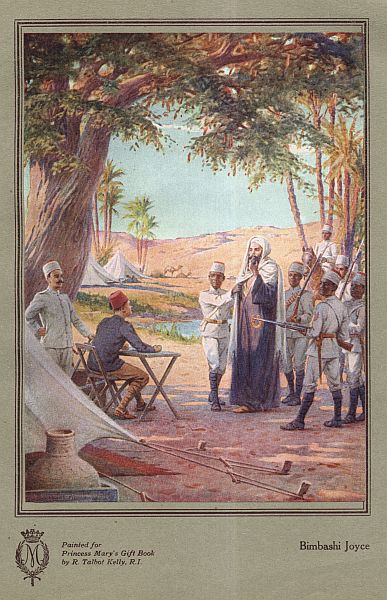
"I understand, Captain Joyce," said the general, "that you have allowed a very important prisoner to slip through your fingers."
"I am sorry, sir."
"No doubt. But that will not mend matters. Did you ascertain anything about him before you lost him?"
"No, sir."
"How was that?"
"I could get nothing out of him, sir."
"Did you try?"
"Yes, sir; I did what I could."
"What did you do?"
"Well, sir, I threatened to use physical force."
"What did he say?"
"He said nothing."
"What was he like?"
"A tall man, sir. Rather a desperate character, I should think."
"Any way by which we could identify him?"
"A long black beard, sir. Grey eyes. And a nervous way of twitching his face."
"Well, Captain Joyce," said the general, in his stern, inflexible voice, "I cannot congratulate you upon your first exploit in the Egyptian army. You are aware that every English officer in this force is a picked man. I have the whole British army from which to draw. It is necessary, therefore, that I should insist upon the very highest efficiency. It would be unfair upon the others to pass over any obvious want of zeal or intelligence. You are seconded from the Royal Mallows, I understand?"
"Yes, sir."
"I have no doubt that your colonel will be glad to see you fulfilling your regimental duties again." Hilary Joyce's heart was too heavy for words. He was silent. "I will let you know my final decision to-morrow morning." Joyce saluted and turned upon his heel.
"You can sleep upon that, you beauty, and a good night's rest may it give you!"

Joyce turned in bewilderment. Where had those words been used before? Who was it who had used them? The general was standing erect. Both he and the Chief of the Intelligence were laughing. Joyce stared at the tall figure, the erect bearing, the inscrutable grey eyes.
"Good Lord!" he gasped.
"Well, well, Captain Joyce, we are quits!" said the general, holding out his hand. "You gave me a bad ten minutes with that infernal red-hot horseshoe of yours. I've done as much for you. I don't think we can spare you for the Royal Mallows just yet awhile."
"But, sir; but——!"
"The fewer questions the better, perhaps. But of course it must seem rather amazing. I had a little private business with the Kabbabish. It must be done in person. I did it, and came to your post in my return. I kept on winking at you as a sign that I wanted a word with you alone."
"Yes, yes. I begin to understand."
"I couldn't give it away before all those blacks, or where should I have been the next time I used my false beard and Arab dress? You put me in a very awkward position. But at last I had a word alone with your Egyptian officer, who managed my escape all right."
"He! Mahomet Ali!"
"I ordered him to say nothing. I had a score to settle with you. But we dine at eight, Captain Joyce. We live plainly here, but I think I can do you a little better than you did me at Kurkur."
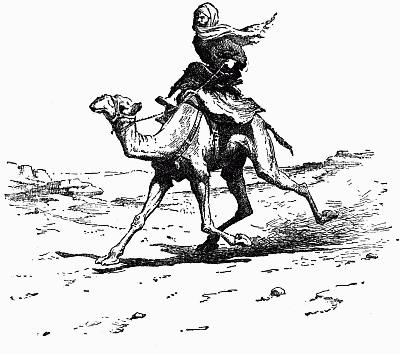
But we must not take an unfair advantage of the animal's ugly appearance in order to provoke unnatural excitement, for what I am about to tell is history and not a fairy-tale: proper, genuine history. I will lose no time in saying that the creature is quite harmless to any of us, even the smallest. By this I do not mean to suggest that it has not a very fierce and brutal temper; only, the victims of its bloodthirsty instincts move in a world so tiny that we tread it under foot unnoticed. It is an ogre, ever hungering after fresh meat, like the famous ogre of your fairy-tales: you know, the one who welcomed Hop-o'-my-Thumb and his brothers to his house one evening, meaning to put them all in a pie like so many pigeons; in short, just the sort of ogre who makes your blood run cold.

Our little monster, then, wants its dinner, a thing not always easy to find in this world, especially for an ogre. Hunger is gnawing at its inside; it must eat or die. Its usual prey is the Ant, a good runner, whose nimble legs promptly take to flight and baffle the clumsy, corpulent hunter's attempts to attack her. You might as well tell the Tortoise to run and catch the Gazelle. Our ogre possesses no greater agility in comparison with the Ant; and moreover there is another reason that makes it quite impossible for him to run after anything:[32] like the Crab, he can only really walk backwards, which is not exactly the way to overtake your quarry when it's in front of you.
To be fat and heavy, to walk backwards and to be obliged to have live Ant for one's dinner is a difficult, a very difficult problem. What would you do in such a case? Come, try to find something! Rack your brains! You can think of nothing? Well, never mind: plenty of others, including myself, could not think of anything either.
Everyday common-sense, expressed in proverbs, tells us over and over again that necessity is the mother of invention. This great truth, which we have learnt by personal experience, we shall learn once more from the Ant-hunter. But first let us give him a name, to simplify our story. Naturalists call him the Ant-lion, a very happy term, which reminds us that, like the Lion, he lives by carnage, slaughtering live prey, in this case Ants. Now that we have christened him we can go on.
When he wants his dinner, the Ant-lion says to himself:
"You're a fat little beggar, you know, short-legged and slow-moving; you'll never catch Ants by running after them. On the other hand, you can walk backwards, that's capital; you have a head flattened like a navvy's shovel, that's first-rate; your pincers are long and grip like a knife, that's perfect, absolutely perfect. We'll use that talent for walking backwards; we'll use those tools, the shovel and tongs; we'll make craft take the place of the agility which we lack; and the dinner will come along."
No sooner said than done. In a nice dry spot, warmed by the sun and sheltered from the rain by an overhanging rock, the wily animal selects a place where Ants are incessantly moving to and fro on household matters. Gravely, with the mathematical accuracy of an engineer tracing the foundation of a well-planned building, the Ant-lion walks backwards, with his body dug into the sand; he turns and turns and in this way hollows out a groove shaped like a perfect circle. Then, still moving backwards and still digging deeper and deeper into the sand, he repeats the circuit many times over, but gradually coming nearer the centre, where he arrives in the end. If any obstacle, such as a large bit of gravel, which would spoil the work, makes its appearance, the Ant-lion takes it on his flat head and, with a vigorous jerk of his neck, flings it to a distance over the edge of the hole. We should use a shovel in exactly the same way to throw out the rubbish when digging.

The result of this labour is a sort of funnel, two inches wide and a little less in depth. For that matter, each Ant-lion scoops himself out one proportioned to his size: the larger ones, the giants of the family, produce one almost big enough to hold an orange; the younger and smaller ones are content with a hollow which a walnut would fill. But, whether great funnels or modest dents, all these cavities are constructed on one and the same principle: the slope is very steep and formed of extremely loose sand; nothing, however light, can set foot upon it without producing a landslip, followed by a headlong fall.
When the work is finished, the scoundrel buries himself in the sand, right at the bottom of the funnel; his pincers alone appear outside, ever ready to snap, but nevertheless hidden as far as possible. And now the Ant-lion remains completely motionless and waits; he waits for hours, for days, for weeks, if necessary, for his patience is unequalled; he waits for his dinner to come to him, as he cannot go after his dinner himself.
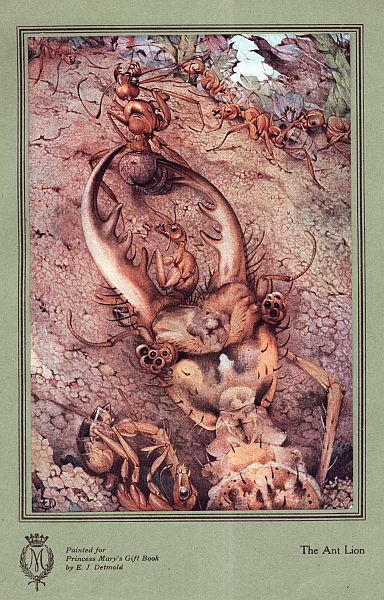
Let us do as he does and wait, very attentively. What will happen? See, an Ant comes trotting along, suspecting no harm, bringing a little honey in her crop for her mates, who are working at a distance, just as the goodwife, on the stroke of noon, brings the reaper his midday meal in the fields. In her hurry, or perhaps in her heedlessness, she has not seen the precipice. She steps upon it, but only just on the edge. It makes no difference: as soon as her foot is on the perfidious slope, the sand gives way and the poor thing is dragged down. If our eyes were sharp enough, we should see signs of fierce delight betrayed by the formidable jaws at the bottom.
Thank goodness! A microscopic bit of straw has interfered with the landslide. The fall ends in the middle of the slope; and the Ant, recovering her balance, tries to scramble back to the top. The sand trickles under her feet; no matter: she goes to work with so much prudence, she so skilfully makes use of the smallest solid support, she is so careful to move sideways instead of going straight up the slope that it looks as though the climb ought to be achieved without fresh impediment. Her knees, her delicate feelers seem atremble with excitement. One more effort, only a little effort, and the thing is done. The edge is there, close by; the Ant must reach it.

Alas, she does not reach it! Suddenly from the sky there falls upon the poor wretch, thick as hailstones, a rain of grains of sand, which, for the tiny Ant, is as bad as a regular rain of pebbles. Who[34] is the brute that takes delight in thus stoning the distressed Ant, who clings in her despair now to this side, now to that, as best she may, so as not to roll to the bottom of the precipice? The brute is the Ant-lion, the ruffian, lying in ambush down in his funnel. See what he is doing. He takes on his flat head a load, a shovelful of sand, and flings it in the air towards the Ant, with a sudden, quick jerk of the neck, like the movement of a spring. The shovelfuls follow rapidly, one after the other. Whoosh! And whoosh! Do you want another? There's one! You don't want another? There's one all the same!
What can the Ant do, I ask you, on the slope of that terrible trap, where the ground falls from under her in a rushing torrent, while a hail of pebbles dashes down from above? In vain she struggles, with all the pluck of despair: for each step forward she takes three back, coming nearer and nearer to the dreadful jaws that are waiting for her at the bottom of the funnel. Bruised and dazed with the stoning, she rolls over and over, right into the jaws. The jaws seize her and everything disappears under the sand; not a trace remains of the recent tragedy.
Peacefully buried in the sand of his lair, the Ant-lion devours his astutely-captured prey. When the meal is over, there remains a dry carcass, which must be thrown away, for, if left in the funnel, it might frighten any game in future and betray the hunter in his ambush. A jerk of the shovel, that is to say, a toss of the flat head, flings it outside the hole.
Then the Ant-lion repairs the damage done to his trap, removes the coarser grains of sand, touches up the slopes to make them ready for a new slide. He buries himself as I have described and awaits the coming of the next Ant.
That is how the Ant-lion secures his dinner. And yet there are people who say that animals have no sense!
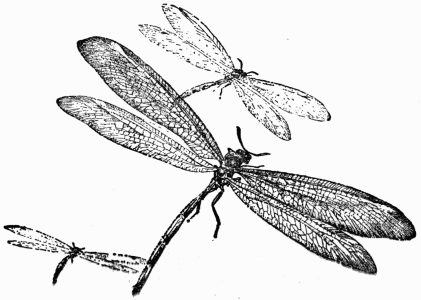
"Still, the German hosts are very numerous, and their artillery is magnificent," said Mrs. Veale, who, much as she longed for the defeat of Germany, longed for the defeat of Mrs. Batterby still more.
Little Miss Skipworth hastened, as usual, to thrust in the olive-branch. "Dear Mrs. Batterby is thinking of the superior courage of our brave English soldiers," she explained gently.
But Mrs. Batterby could not stand being Bowdlerised, or even translated. "No, I wasn't, Matilda; at least not at that particular minute, though nobody admires the courage of the British Army more than I do, and always have done, and especially with Lord Kitchener at their head and in action against the enemy. I've got a very high opinion of the British soldier myself; none higher: much too high, in fact, to allow him to wear a collar to his bed-jacket like the one you are making, Matilda, without speaking a word in his defence."
Matilda collapsed at once: she was composed of the most collapsible material ever provided for the manufacture of souls. "What is wrong with my collar, Mrs. Batterby? I thought I was exactly copying the pattern sent to us by the Red Cross. Anyway, I was trying to do so."
"Trying and succeeding are two different things, which I should have thought you'd have found out by this time, Matilda, and you five-and-forty, if you are a day! Give me the collar, and I'll fix it for you, or else the wounded soldier that wears it will wish he had died in the trenches before he had the chance of putting it on."
It was the afternoon of the Red Cross weekly working-party, held in the village of Summerglade, in the early stages of the Great War. The party was a small one, consisting of Mrs. Batterby, a farmer's wife, in whose parlour the meeting was held; Mrs. Veale, the wife of the village doctor; Mrs. Windybank, a gloomy widow; and Miss Skipworth, an ingenuous and tender-hearted spinster. Between Mrs. Batterby and Mrs. Veale there existed a bitter and abiding warfare.
"May I ask what you were thinking of—if not of the bravery of our own dear soldiers—when you expressed your assurance of the ultimate success of the Allied Forces?" asked Mrs. Veale, with her needle in her fingers and the light of battle in her eye.
"By all means," replied Mrs. Batterby; "and, a civil question demanding a civil answer, I don't mind telling you that I feel sure we shall win, because we know that God is on our side and is fighting for us."
"But their numbers are so great and their guns so magnificent," repeated Mrs. Windybank with a lugubrious sigh. "I sometimes fear that they will win in the end, and we shall all be blown up by Zeppelins and trampled underfoot. I'm sure I pray every morning that our armies may win, but I tremble when I think of the forces against us."
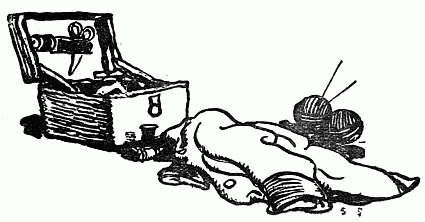
"So did the Prophet's servant till his eyes were opened and he saw the mountain full of horses and chariots," replied Mrs. Batterby. "But some folk's eyes seem made not to open, like the stained-glass windows in Summerglade Church."
"It is right to pray, but we must beware of presumptuousness in our prayers," said Mrs. Veale sententiously.
"We'd much better beware of want of faith," retorted the hostess.
"But it is difficult to have faith when things seem going against us," said Matilda Skipworth.
"Stuff and nonsense, Matilda! It's when things seem going against us that our faith is really any compliment to the Almighty. I can't see anything very complimentary to Him when every morning I pray with faith, 'Give us this day our daily bread,' knowing all the time that it's in the larder with a damp cloth over it. But it's when people pray that particular prayer, with no bread in the house and no money to pay for any, that their faith is any compliment to God or worthy of His acceptance."
"I know my faith is very feeble and my prayers are unworthy," sighed Miss Skipworth, "but I do try to believe. Still, I cannot help envying the Prophet's servant who saw the horses and[37] the chariots fighting on his side. I wish we could see the angel hosts fighting for us. I do so wish that we had appearances of that kind nowadays: it would make faith so much easier and life altogether so much more beautiful."
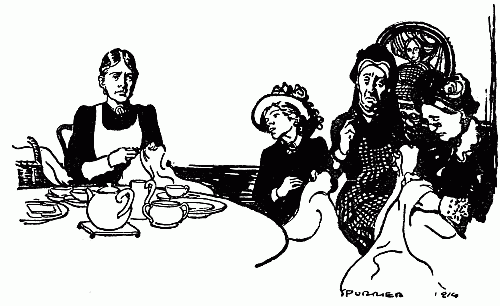
"But it would not be in accordance with God's teaching in these later times. Such assistance to faith as the appearance of saints and angels would not be at all in accordance with our modern religious thought, and I am sure that the Almighty would not permit it," said Mrs. Veale.
"I am not so sure of that," retorted Mrs. Batterby. "I think that visions of angels are granted to-day to those that have eyes to see them, just as they were in Old Testament times."
"Oh! Mrs. Batterby," exclaimed Matilda in excitement, "do you really believe that?"
"I do. But I don't believe that the angels appear as you would expect them, Matilda—all got up in harps and crowns and flaming swords. I believe that when they come nowadays they look so commonplace and what you might call ordinary-looking, that only those folks that have the eye of faith can perceive them at all. They can see them all right, mind you! But they can't recognise them as the angels of God."
"How I should like to see somebody who had actually seen an angel!" sighed Miss Skipworth.
"Did you ever come across any one who had enjoyed such an experience, Mrs. Batterby?" asked Mrs. Veale in a sceptical tone.
"Yes, I did, Mrs. Veale—that is, if you can say that you ever came across yourself."
"Oh, how interesting!—how very interesting!" cried Miss Skipworth. "But you don't look at all the sort of person that would see angels and spirits."
Mrs. Batterby took the last remark as a compliment; as indeed it was intended. "That's just my point, Matilda. The real angels don't[38] look like the Scripture-picture sort of angels; and they don't appear to the high-flown, star-gazing sort of people who are always looking for them."
"Do tell us what you saw, Mrs. Batterby," besought the emotional Matilda.
"And also what calamity it foretold," added Mrs. Windybank. "I always believe that supernatural appearances precede some terrible misfortune."
"Well, my experience, or whatever you call it, happened five-and-thirty years ago, and no calamity has happened to me since. On the contrary, it taught me that no calamity could happen to me as long as I lay safe in my Heavenly Father's Hand. That's just the lesson that I learnt from it."
"Do tell us the story," urged Miss Skipworth.
"I will, Matilda, if you'll get on with your bed-jacket, and not leave off your sewing whenever anybody speaks, as if your hearing lay in your fingers, and you couldn't sew and listen at the same time.
"Well, when I was a young woman I lived with an aunt in Merchester who kept a stationer's shop; and every Sunday I used to walk over to see my mother who lived at a village about three miles off, she being a widow and keeping the post-office there and my two little sisters as well.
"It was one Sunday in September—one of those deceitful sort of days that look like summer, and then take you all of a heap by getting dark before you can say Jack Robinson—and I had been spending the day with my mother as usual; I stayed for the evening service, it being the Sunday-school Anniversary and a special preacher for the occasion; quite a young man, but one of the finest preachers I ever heard. Though it was five-and-thirty years ago, I remember that sermon as if I'd heard it last Sunday."
"What was it about?" asked Mrs. Windybank. "For my part, I always enjoy funeral-sermons the most; but I've heard some very sweet ones in times of war, and on the last Sundays in the Old Year."
"It was on the very subject that Matilda was speaking about—in fact, it was her conversation that recalled the whole incident to my mind. The text was, 'Jacob went on his way, and the angels of God met him'; and the preacher said—what I've just being saying to you—that the angels of God meet us far oftener than we think; only we are so busy looking out for them to come in our own particular way that we don't recognise them. Unless they are in their flowing robes with their harps and halos and fiery swords, we don't know that they are[39] angels at all: which is just as stupid of us as if we didn't believe we'd seen the Queen, unless we'd seen her with her crown on. I remember that this impressed us very much: Queen Victoria had just been to Merchester to lay the foundation-stone of some public building or other (I forget what), and we had all cried at seeing her in a widow's bonnet; it seemed to make her so much more real and human than if she'd had her crown on. I'm sure that black bonnet brought her nearer to our hearts than all the Crown Jewels out of the Tower of London could have done; and taught us to love and reverence her as a woman as well as obey and serve her as a Queen. And so, as the young minister said, it ought to be with the angels; because when the Lord came among us, He came as One of ourselves, and led us by the paths that we were used to.
"Well, the sermon was so grand, and the hymn after the sermon so beautiful—I remember it was a six-lines-eight, sung to the tune called Stella, and mother and I swayed to it till we kept bumping against each other—that by the time we got out of chapel it was quite dark—so dark that mother didn't like the idea of my walking to Merchester alone, as it was three miles at the least, and along a very lonely road. But there was nobody to go with me, and I was bound to get back to aunt's that night, for some special reason that I forget now; so—like it or not like it—I had to go, though I was very timid."
"Oh, how dreadful! I should have been terrified," groaned Miss Skipworth. "I don't wonder that you were frightened."
"I shouldn't have minded if I'd been your age, Matilda: surely a woman of five-and-forty is old enough to go anywhere by herself! But I was only eighteen, and that makes all the difference."
Matilda returned a soft answer—or, to be more accurate, a soft question.
"Then did you venture, Mrs. Batterby?"
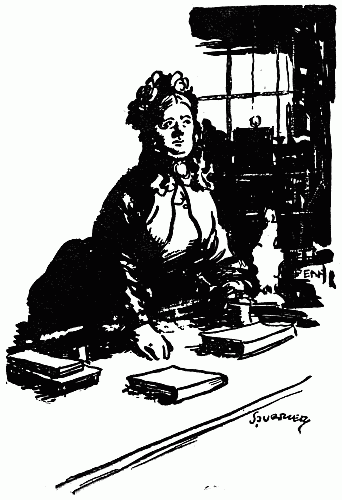
"Of course I did: there was nothing else to do; and I didn't want mother to know I was frightened for fear of worrying her. But I didn't like it, I can tell you; and I started with my heart in my mouth, ready to jump at my own shadow. And then it came into my mind (I remember it as if it had happened last[40] night) that I was a poor sort of Christian to enjoy a sermon and then make no sort of effort to put it into practice; in fact, that I was only a hearer of the Word, and not a doer, letting God's message go in at one ear and out at the other, leaving nothing behind it. So I set to to pray that as I went on my way the angels of God might meet me, as they met Jacob, and save me from all harm. And what with the excitement of the sermon, and my own fears, and the darkness of the road, I got worked up to such a pitch that I shouldn't have been surprised if a white-robed angel with shining wings had flown over the hedge and perched beside me."
"Which, of course, no angel did," interrupted Mrs. Veale.
"That is as may be," retorted Mrs. Batterby darkly. "In the middle of my prayer I heard a rustle in the hedge on the side of the road, which, of course, I thought was a thief lying in wait to waylay me and murder me, and I prayed harder and harder. But then, in the fading light, I perceived that it was no thief, but a huge yellow collie dog, such as they have for minding sheep."
"Oh dear!" said Miss Skipworth; "I should have been as much afraid of a strange dog as of a strange man, if I'd been you."
"Fortunately, however, you weren't me, nor ever likely to be, which seems fortunate for all parties concerned," replied her hostess dryly. "And as for being afraid of a dog—why! I'd been accustomed to dogs from a child, though I'm not the one to deny that collies are uncertain in temper and apt to snap at strangers unawares. So I spoke kindly to this one, in case it should take me for a thief come after its master's sheep; though where the sheep were I hadn't a notion, there being nothing but cornfields ready for cutting on both sides of the road, the harvest being very late that year."
"It was rather foolish, to my thinking, to speak to it at all," remarked Mrs. Windybank. "I had a friend once who spoke to a strange collie; and it bit her thimble finger so badly that she was never able to sew properly again."
"Then she must have said the wrong thing to it," replied Mrs. Batterby; "and it served her right. I know when folks say the wrong thing to me, I'd give anything to be able to bite their thimble finger, and dogs feel the same as we do. But to get on with my story. The dog came up to me quite friendly-like, and didn't attempt to snap or anything; but though it came close to me, it wouldn't let me touch or pet it. It shied away the moment I put out my hand to fondle it. So—being accustomed to dogs and their ways—I treated it as it evidently wished to be treated, and just talked to it pleasantly as it trotted along by my side."
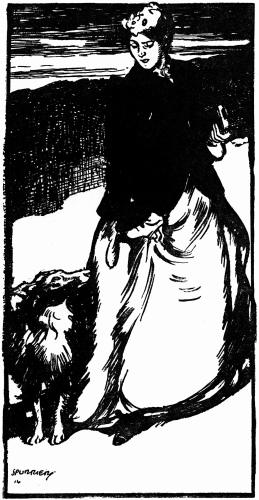 "For my part, I believe it was one of the angels of God"
"For my part, I believe it was one of the angels of God"
"Then it followed you?" asked Miss Skipworth.
"Yes; all the way to Merchester, just as if it had been my own dog. When there was nobody in sight, it ran backwards and forwards and scampered about by itself; but whenever we met anybody—and we met some nasty-looking tramps, I can tell you, that I should have been terrified to meet alone—it came close to me, looking that big and fierce that the tramps kept well to the other side of the road, as far away from us as they could; and it stalked by me till they were out of sight, as is the way of collies when they scent danger ahead. I can't tell you how delighted I was to have found such a splendid pet; and I made up my mind to take it home with me and keep it, unless some one claimed it; as aunt and I had long wanted a house-dog to take care of the shop at nights. And, besides, I thought it would be such a nice companion for me on all the long country-walks which I was so fond of taking out of shop-hours."
"And did any one ever come and claim it?" asked Miss Skipworth with breathless interest.
"No; never. It followed me all the way to Merchester, wagging its tail whenever I spoke to it, and looking up at me with its soft brown eyes as friendly as never was; but it never let me touch it, though I tried to pat it once or twice."
"And you took it home with you, the dear creature?"
Mrs. Batterby shook her head. "It followed me right into Merchester; but when I was safe in the town among all the gas-lamps and the people and the traffic, it turned round and scampered back along the road by which we had come. I whistled to it to come back, but it took no notice; and the last I saw of it was its yellow coat disappearing into the darkness."
Miss Skipworth gave a deep sigh. "And you never saw it again?"
"Never."
"And you never found out who it belonged to?"
A look came into Mrs. Batterby's eyes that was new to Miss Skipworth. "I wouldn't say that. As a matter of fact, I believe I did find out Who it belonged to."
"I suppose it was the sheep-dog of one of the neighbouring farmers," suggested Mrs. Veale.
"Some might suppose so; but I don't," replied Mrs. Batterby, still with that wonderful smile in her sharp grey eyes. "For my part, I believe it was one of the angels of God."
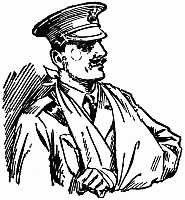
| A MODEL SOLDIER[1]BY CHARLES GARVICE
Author of "Nance," etc. Drawings by J. H. HARTLEY | 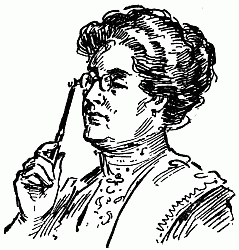
|
"Dad, I've had an adventure."
She made the assertion with seeming gravity, but her father glanced at her dancing eyes with a mixture of interest and a suspicion of being spoofed; for past experiences of his light-hearted, mischief-loving daughter had taught him to be wary; so he said nothing, but continued to chalk in the rough sketch on the easel.
"Behold in me a heroine of romance!" said Kitty, striking an attitude and regarding the toes of her dainty boots with her head on one side; and her father, as he glanced at her again, noted vaguely her pose and expression for future use; for Kitty served frequently as a model, and her pretty face and svelte figure had appeared in numerous magazines as the heroine of all sorts of stories.
"Father, I have saved a fellow creature's life," she went on. "Told in the language of popular fiction it would run thus: 'A young girl of pleasing appearance was seen going down one of our leading thoroughfares. She was of meek and modest demeanour——'"
"I thought you said the adventure happened to you, Kitty," said Mr. Thorold.
"'The road was crowded with the carriages and motor-cars of the wealthy and noble,'" continued Kitty, disregarding the mild sarcasm; "'the young girl, lost "in maiden meditation, fancy-free," was startled suddenly by a cry of anguished terror. Raising her downcast eyes, she saw a pretty young thing running across the road right in front of an approaching motor-car, from the occupant of which, a lady of mature age and buxom form, the cry had arisen. Without a thought of her own fair young life, the maiden rushed forward, seized[44] the young thing in her arms and carried it in safety to the pavement. The magnificent 2,000-h.p. motor-car pulled up beside her, and the richly dressed lady, with a gasp of relief and admiration, expressed her appreciation of the young girl's heroism, demanded her name and address, and, handing her a card, desired the rescuer to call. The heroine, murmuring something inaudible, blushed sweetly and, making her way through the small but loudly cheering crowd which had collected, modestly disappeared.'"

"All very well," grumbled Mr. Thorold; "but you'll be brought home on a stretcher some day, Kit. You're too venturesome by far. What became of the child?"
"Oh, it wasn't a child; it was a collie pup."
"I thought you said 'fellow-creature,'" remarked her father plaintively.
"All dogs are my fellow-creatures," declared Kitty simply.
"I am a credulous as well as a sinfully indulgent parent," said Mr. Thorold, stepping back to view his sketch; "but I don't believe a word of your story."
"'Documentary evidence was instantly forthcoming,'" retorted Kitty, extending a tiny paw with a card inserted delicately between her fingers.
Her father took it, read aloud: "Lady Hawborough, 209, Belgrave Square," and then emitted a low whistle.
"My word, Kitty, you've gone and done it!" he said. "If this is the Lady Hawborough—and Nature, with all her audacity, cannot have made two of them—you've run up against a celebrity of the deepest dye."
"Oh?" said Kitty. "Never heard of her. What's she celebrated for?"
"For good works—which means, in most cases, a disposition and a capacity for interfering in the affairs of other people. And her ladyship is one of the biggest and most incorrigible interferers in this crank of a world of ours. She is immensely rich; she is also 'powerful,' as the novelists say; she is a tyrant to her relations, a terror to her friends, and a well-meaning, charitable bugbear to the world in general."
"Oh!" said Kitty, somewhat dismayed. "But how is it you are so intimately acquainted with the history and characteristics of this lady of lofty rank and goodly oof?"
"My dear Kitty, 'oof' is not nearly such a good word as 'wealth.'"
"Maybe, but it's easier to pronounce," retorted Kitty.
"Oh, I don't know," said Mr. Thorold, as if he were weary of the subject. "Heard some one at the Club talking about her; seen her name in the papers. Take my advice and don't call. She'll enlist you in one of her gangs of workers, hustle you into a hospital as a nurse, make you into a district visitor, or turn you a lecturer on vegetarianism or some other fad."
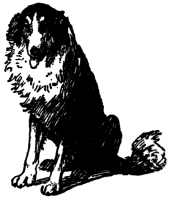
"Oh no, she won't," said Kitty, with sublime confidence; "not that I should object to being a nurse—that is, if I hadn't already to look after an aged and infirm parent. Yes; much as I value your advice, Dad, I think I'll call. I'll go to-morrow; and if I come back, say, in a Salvation Army kit, and banging a tambourine—and, mind you! I might do worse: I've a whole-hearted admiration for the S.A. and the uniform is distinctly fetching—you can indulge in the exquisite pleasure of exclaiming, 'I told you so!' What are you on this morning, Dad?" she asked, going to him, putting her arm round his neck, and giving him a little hug.
"Sketch for an illustration for the Long Acre Magazine," he said, with a kind of resignation; for your most gifted artist has to do pot-boilers nowadays: and generally he does them well.
"The girl's all right, anyhow," said Kitty. "Where's the man?"
"Oh, I'm going to stick him in directly," said Mr. Thorold. "He's to be a soldier, and I've got a young fellow coming as a model presently. Ran against him in a rather extraordinary way. He called on me yesterday with an introduction from Bloxham: said he had never sat as model before; but that he was hard up, and would do his best. Fine young fellow, and a nice taking sort of chap altogether."
"Burglar in disguise, coming to inspect the premises, no doubt," surmised Kitty cheerfully.
"Well, he's welcome to anything he takes a fancy to," remarked Mr. Thorold.
"Oh, well!" she said. "I'm off to consult Selinar-Ann as to whether it's to be bread-and-butter pudding or a baked roly-poly; expect me back, or what remains of me, in an hour."
Carefully rumpling her father's already disordered hair, she screwed up his patient face between her hands, kissed him and ran out, singing as she went.
In less than an hour she re-entered the studio, still singing; but the song snapped off suddenly, and she stood just within the doorway, staring with wide-open eyes at a young soldier in khaki who stood on the model's dais, one arm in a sling, the other extended with a sword in the hand, in the kind of attitude beloved by the populace, and forming the picture which bears inevitably the legend, "Charge!"
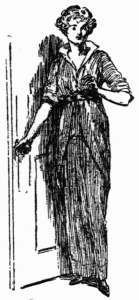
The young man turned his eyes—he dared not move anything else—and, at sight of the stricken maiden, his tanned face grew the colour of a healthy beetroot.
"Getting on famously, Kit," remarked Mr. Thorold in a preoccupied manner. "Arm a little higher, if you please, Captain——Pardon, didn't catch your name."
"Barnard," said the model, in a small voice quite inconsistent with his fine and manly proportions.
"Ah, thank you! Could you—er—put on something of a scowl? You're wounded, you know, and you're leading a forlorn hope, or something of the sort."
The young man's good-looking face assumed as much of a scowl as it was capable of doing, and Mr. Thorold dashed it on the paper.
"Capital! Now you can rest a minute. I've got to go and get some more ochre. Perhaps you'd like a drink?"
"Thank you; I should," confessed the young man, with a slight huskiness.
"All right; I'll bring it," said Mr. Thorold; and, as he was leaving the room, he said over his shoulder, "My daughter; Captain Barnard."
Kitty closed the door carefully; then, seating herself on the divan, she rested her chin in her hand and, regarding the young man severely, she demanded sternly:
"Perhaps you'll be kind enough to inform me of the—the meaning of this?"
He had seated himself on the edge of the dais and was wiping his face, as if he were just going through a dangerous action, with the enemy pressing on all sides.
"I beg your pardon?" he faltered, with meekness in his voice, mien, and eye.
"I asked you why you are masquerading here?" she said, uncompromisingly.
"Well, come to that, I'm not masquerading. This is my own kit; I'm a soldier, as you know. This is a genuine wound, not a fake; and I'm really hard up: had a run of bad luck lately. No harm in earning an honest shilling."
"But why come to my father, this particular studio, to earn it?" demanded Kitty, cutting short his feeble attempts at plausible explanation.
"Oh, well," he replied desperately: "you see, when I met you at the Thomsons' the other night, and asked you if I might have the[47] honour of calling on you, you said that your father was a very busy man and that you yourself had no time for receiving visitors."
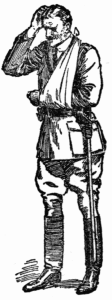
"Well?" demanded Kitty, as icily as before.
"Well," he resumed, looking down and then up at her, as if he could not keep his eyes from her face, stern and almost ferocious as it was, "well, I asked the Thomsons who your father was, and when they told me, I thought—I thought——Well, don't you know, it seemed to me that he might want a model. War pictures are all the go now, aren't they? And so——" He broke down, made a little gesture with his unwounded arm, and blurted out, "Of course you know why I've come. I wanted to see you again. I told you so the other night; like my cheek, of course, but—I don't know how it is—I feel as if I'd got to see you, to know you. Look here, Miss Kitty—I beg your pardon, all the Thomsons call you that—I hope you won't mind my saying that I've fallen in love with you?"
"Excuse me; I mind it very much," Kitty informed him with distressing promptitude; but her eyes wavered and the colour came into her face and made it, in the unfortunate young man's opinion, more maddeningly fascinating than ever.
"Oh, well, I'm sorry," he said, but without much penitence in his tone; "but the truth should always be told, shouldn't it? And it is the truth."
"Is it?" queried Kitty. "You've seen me only once before, and then only for an hour or two."
"Two hours and three-quarters," he said, as if he were a stickler for accuracy; "and I fell in love with you after the first quarter of an hour. That being the case—as it certainly is—what was I to do? I shall have to go back to the regiment as soon as this old arm of mine is right; and it's getting right quickly; and I felt that I couldn't go without at any rate telling you what—what was the matter with me."
"You speak as if—as if love were a disease," said Kitty, with an attempt at mockery which was an abject failure.
"So it is," he declared, "and I've got it bad—very bad indeed. I'll ask you to believe me, Miss Kitty—I mean Miss Thorold—that I haven't had you out of my mind for one moment since we parted."
"It's a pity you haven't something better to think of," said Kitty.
"There I disagree with you," observed the young man stoutly. "I couldn't have anything better to think of, and I don't want to. I shall think of you for the rest of my natural life. One moment, Miss Kitty, before you refuse me. I ought to tell you that I'm a poor young captain, in a marching regiment, with no prospects."
"The allurement is irresistible——" began Kitty, with admirable gravity.
"I'm delighted to hear it," he said. "So you accept me?"
"The politeness of a soldier should have compelled you to hear me out. I was going to add, that it would be irresistible if I were in love with you; but——"
"Don't go on, I beg of you!" he implored. "I'm not such a fat-headed idiot as to suppose that you are in love with me. What I wanted to ask you was to give me a show. You see, I've arranged with Mr. Thorold to stand, not only for this picture, but for an oil-painting, which I suppose—don't know much about art—will take some time."
"You have? Well, of all the——!"
"Quite so," he said meekly. "You see, it will give me a chance of trying to explain to you that, if you refuse me, it will be—oh, worse than a conical bullet in a particularly vital spot. All I ask is that you will look in now and again, and—and give me an opportunity of—of——"
"Bothering me to death," finished Kitty for him.
"No; bothering you into an engagement—which is sometimes a serious affair, but not always fatal," he said frankly. "Come, Miss Kitty, don't be hard on me! It's not much to ask——"
"Oh, isn't it?" interjected Kitty with fine irony. "Thank you. Captain Barnard."
"If you were in love with me—absurd idea, of course! but I'm just putting the case—I'd come and sit with you and give you any amount of chances."
Kitty heard her father's returning footsteps, and she stood up and looked from side to side, and then at this meekly audacious young man, with a mixture of astonishment and bewilderment—and something else I cannot define—in her really wonderful eyes.
"Well, of all the cool——" she said again. But he cut her short.
"That's all right," he said breathlessly; "thank you ever so much. Your father's coming. I'm to be here at eleven o'clock every morning."
"And you think," said Kitty, as hurriedly, "that, by simply sitting here and regarding you in that absurd attitude, I shall fall in——?"
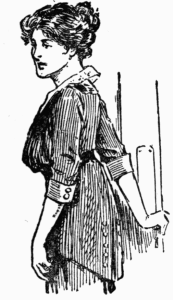
"Oh, no; not at all. Fortune will have pity on me and give me an opportunity for seeing you for a minute or two alone. Besides, perhaps—I only say perhaps, mind!—you might be induced to lunch at an A.B.C. shop," he jerked out in a rapid whisper, as the innocent parent returned with his yellow ochre.
Kitty went up to her room, flung herself into a chair in her favourite attitude, with her chin in her hands, and stared at nothing—no, not nothing, but at the handsome face and manly form of a wounded soldier.
Of course, she would not go near the studio while he was there. Consequently, the next morning, at half-past eleven, she entered with refreshment on a tray; and, with downcast eyes and a blush, informed her father that she had left his soda-and-milk in the dining-room because a change of scene and air would be good for him.
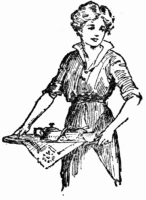
She was still rosy with shame when the model sprang from the dais, caught her hand, and declared fervently that she was an angel.
"No, I am a sly and deceitful, not to say forward, girl," said Kitty. "But I've only made an opportunity to tell you that I'm not coming into the studio again while you're here."
"That's all right," he responded cheerfully. "Come in just about this time. And I've found a jolly little A.B.C. shop where we can get some lunch to-day: second turning to the right, in the corner—I should like you to be able to tell me, quite quietly, why you find it necessary to refuse me. I think that's only fair to you."
"And I think," said Kitty emphatically, "that you possess the concentrated cheek—I am sorry there is no stronger word—of the whole British Army; and I decline your invitation."
She kept him waiting at the A.B.C. shop for a good quarter of an hour.
In the afternoon Kitty presented herself at 209, Belgrave Square, and was shown into what a house-agent would call "the magnificent and spacious salon." Lady Hawborough was seated in a capacious chair, knitting for dear life; on a small table beside her was an orderly disorder of blue books, reports of charitable societies, vegetarian tracts, and the debris of her morning's correspondence. She received Kitty with more than graciousness; for her ladyship, notwithstanding her crankiness, was the owner of that organ the possession of which we are led to believe atones for all minor faults, not to say crimes—a "good heart."
Besides, she had been immensely taken with Kitty, and admired genuinely the pluck and readiness which the girl had displayed in the rescue of the puppy: of course, Lady Hawborough was a prominent member of the S.P.C.A.
She gave Kitty some tea, patted her hand several times, and proceeded to put her through a kindly, but searching, catechism; and,[50] before tea was over, had obtained sufficient information respecting Kitty's life to convince her that the girl was a fitting object of her ladyship's benevolence. It is true that, every now and then, Kitty caught a glimpse of the somewhat masterful spirit which her ladyship displayed in her favourite occupation of ordering the lives of all who came in contact with her; but Kitty was not so stupid as to fail to recognise the presence of the aforesaid good heart, or not to credit the old lady with the amiable intention which smiled behind the mask of tyranny.
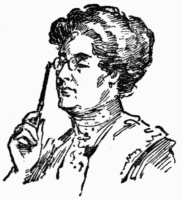
"She's not at all a bad sort," Kitty informed her father on her return home. "Oh, I daresay she's fond of interfering and all that; but she can't interfere with me; I'm not her relation—I was going to say 'Thank goodness,' but I really do like her, Dad. She's coming to see some of your pictures some day."
"Oh, my great aunt!" groaned Mr. Thorold, who, like a true artist, had a loathing for the necessary, but sometimes maddening, art patron.
The drawing for the Long Acre Magazine being duly finished, Mr. Thorold began on the more important battle-piece.
"I think I'm going to make a hit with this, Kitty," he said to his daughter one morning, as he was preparing for the arrival of his admirably punctual and singularly patient model. "You see, I've got a splendid young chap to stand for it. He's the real thing, instead of a coster dressed up in an officer's uniform. And he's a pleasant chap, too," he continued meditatively. "A modest, well-mannered young fellow: no swank or swagger; in fact, a gentleman. By the way, Kitty, you might remember that little fact, and not be quite so short and sharp with him when he speaks to you."
"Oh, it won't hurt him," retorted Kitty, turning her back quickly. "From what I have seen of him, I should say that Captain Barnard would not be easily snubbed."
"And you try pretty hard," remarked her father. "For instance, yesterday there was no occasion for you to tell him to shut up when he observed that it was a fine day."
"All I said was that a model was much more effective when he kept his mouth closed," said Kitty.
"That strikes me as being pretty much the same thing," said her father. "He looked quite crushed."
"Do him good," murmured Kitty. "Besides, he can talk the hind leg off an army mule when he likes."
"How do you know?" asked her parent, with mild surprise.
"Oh, I'm only drawing inferences from—from his general appearance," said Kitty, looking a trifle confused.
"Going out to lunch again to-day?" demanded her father, repiningly, as, clad in outdoor things, she passed him in the passage a couple of hours later.
"Sorry, dear; got a pressing engagement. Besides, you never eat anything. There! did it miss its nurse? Never mind! I'll be in all the evening." She scrunched up his face, gave him what she called her "screw" kiss, and departed to the A.B.C. shop.
By this time, it must be confessed, the fortress besieged by Captain Barnard with such ingenuous strategy, but manly courage, had surrendered; and to-day the wounded soldier had brought a pretty but inexpensive ring with him.
"It's all I can afford, dearest," he said, as he slipped it on the finger.
"It's a perfect duck," she returned, touching the ring with her lips—a wicked and maddening thing to do; for you can't kiss a girl in an A.B.C. shop, however much in love with her you may be.
"And to-morrow I'll tell your father. What—what do you think he'll say, darling?"
"I know what he'll say, but I couldn't repeat it, because I've been properly brought up," replied Kitty.
"But he won't refuse his consent, won't chuck me out?" cried her lover, aghast.
"No; because, strange as it may seem, he's really fond of me. Oh, I don't deserve it; for he's the dearest dad that ever had a hussy and a minx for a daughter. No, he won't throw you out, at any rate until the picture's finished. And perhaps you'll be tired of me—I mean, I shall be tired of you—we shall be tired of each other, before that time."
"I'll risk that," he said confidently, pressing her hand under the table.

That afternoon Kitty, in a state of perfect bliss, paid one of her frequent visits to Lady Hawborough, with whom she had now become great friends; in fact, the old lady had grown quite fond of the girl; and the extent of this affection was proved that afternoon to Kitty by an extraordinary mischance. The footman had shown her into a small ante-room, which Lady Hawborough called her "study"; the adjoining apartment was divided from that in which Kitty was waiting by a pair of folding doors, and, one of these being partly open, Kitty heard the rustling of dresses, followed by Lady Hawborough's clear and very distinct voice saying:
"Must you go, dear? I'm so sorry, because I wanted you to see her. She's quite a nice girl—in fact, a really sweet little soul. Oh, yes, of course, I've plans for her," she continued, as if in response to a remark by the other lady. "I'm afraid she has not many opportunities; the father is a struggling artist and they don't move in society, of course. I'm thinking of—in fact, I've made up my mind to marry her to Archibald."
"Lucky Archibald!" observed the other lady.
"Yes; I think he will be," assented Lady Hawborough, with a complacency she always exhibited when disposing of the fate of those belonging to her. "He is a good boy, a little wild, perhaps, but really no harm in him; and it's time he was married. I'm a little anxious about him, because he's so—so impetuous, like all the Hawboroughs." Her ladyship's "dearest friend" could not have accused her of impetuosity; and Kitty could almost see the other lady smile. "He is the sort of boy who might fall in love with a barmaid or a ballet girl and marry her."
"Then this young lady doesn't come within the category of undesirables?"
"Oh, dear, no," said Lady Hawborough. "She's quite a lady and will suit Archibald very nicely. I am very pleased with him; he has been doing so well lately: quite distinguished himself; you've heard, of course? It was in the papers. I am going to look after him."
Kitty had been listening with burning face and twitching lips. She had been so astonished as to be incapable of carrying out her desire to spring to the door and declare her presence, and escape from the position of an eavesdropper; but she recovered sufficiently to rise and confront Lady Hawborough as, on having said farewell to her visitor, she entered the room.
"Why, my dear!" said her ladyship, almost embarrassed, "I didn't know that you were here: have you been waiting long?"
"Long enough to hear what you said," replied Kitty bluntly, her face pale now, her eyes flashing. "I couldn't help listening. I'm sorry. Yet it's just as well, because, Lady Hawborough, I don't think you have any right to—to dispose of me in the way you intended doing.—I don't know who 'Archibald' is."
"Archibald is my nephew," said Lady Hawborough stiffly; and when Lady Hawborough was stiff, the common or kitchen poker compared with her was a soft and flexible article. "My nephew and heir. He is a very good and brave young man."
"He may be a saint for all I care," said Kitty; "but I don't want[53] to marry him, and I won't. In fact, I'm——" She was going to say "engaged," but she was really too angry to confide in Lady Hawborough "—I'm resolved not to do so. I am afraid you will think me very ungrateful, and that—well, that this is the end of our friendship."
"I think you are stating the situation very accurately," said Lady Hawborough, whose face was exceeding red.
"I'm sorry," said Kitty, rather wistfully and sadly, her resentment waning; for the old lady had been very kind to her, and Kitty saw that even this absurd intention of hers sprang from a benevolent desire to benefit her protégée. "I want to thank you for all your goodness to me, and——Good-bye, Lady Hawborough."
She held out her hand, but Lady Hawborough appeared not to see it, and Kitty got outside the "stately and desirable mansion" and hastened home to enjoy a good cry.
When she made her appearance in the studio next morning, she found her father seated on his stool in an attitude of profound dismay, his long figure bowed, his rumpled hair clutched in his hands, his painting-brush between his teeth.
On the dais stood the wounded soldier, his face flushed, an expression of keen discomfort all over him.
"Here, look here, Kitty!" wailed her distracted parent. "Just listen to what this young man's been telling me? He says that you and he have got engaged! Heavens!"
"Quite true, father," said Kitty calmly, but with a blush.
"Oh, my goodness! And he tells me that he's poor, and has nothing to live on excepting his pay and a small allowance."
"That's true also, I believe, father," said Kitty. "I'm sorry; but it can't be helped. You'll have to paint me as 'The Mendicant's Bride.'"
"Don't joke about it, you foolish, abandoned girl!" groaned Mr. Thorold.
"But you don't want me to cry about it, Dad dear," said Kitty, going to him, taking the brush from between his teeth, and putting her arm round his neck. "Haven't you got anything to say for yourself?" she asked, addressing the discomfited young man.
"Not a word," he returned. "Said all I've got to say. And look at the effect of it!"
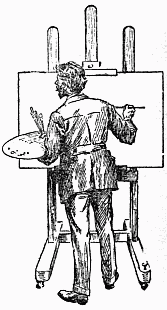
"Yes," she retorted. "You've broken the heart of an affectionate and devoted parent. You're a wicked young man.—Oh, dad dear, do get up and go on with your work! You know as well as I do that you're not going to make us unhappy? Say, 'Bless you, my children!'[54] like a good father, and let's all go up and mingle our tears over a lunch at the Floriani."
"Ripping idea!" cried the infatuated lover, who would have said the same if Kitty had proposed they should lunch in the moon.
"Oh, well," said Mr. Thorold, a trifle more cheerfully, and with a shrug of resignation. "But I shall not go unavenged. Young man, you do not know what lies before you. She will make a slave of you, as she has made a slave of me; this girl is a tyrant of the most outrageous kind. You will not possess a soul of your own; you will——"
"Bravo, Dad!" interrupted Kitty. "But it will be quite time enough to give me away when we get to the church. There's your hat, on the bust there."
"And now we'll go on the bust ourselves," said the young man joyously. "I say, how jolly it all is! Would you mind my kissing her, sir?"
He was in the middle of the somewhat lengthy act, when the door opened, and Selinar-Ann announced in awe-stricken tones:
"Lidy 'Awborough!" And her ladyship swept in.
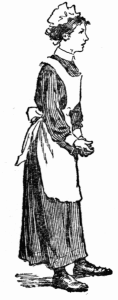
With his arm still round Kitty, her lover stared at the portly dame as if she were a gorgon. Kitty, with a stifled exclamation of astonishment, freed herself with difficulty from the young man's grasp, and, with blushing face, hastened to greet the august visitor, whom Mr. Thorold was regarding with an air of patient resignation.
But Lady Hawborough put out one hand to keep Kitty back, and, fixing her lover with a stony stare, exclaimed sepulchrally:
"Archibald!"
There was a profound silence for a moment; then Kitty, staring in her turn at her lover, echoed the objectionable word; for it was a name she detested.
"Archibald! His name's Harry!"
"His name is Archibald," said Lady Hawborough sternly. "I ought to know; for he is my nephew."
"Your nephew!" gasped Kitty.
The young man, having recovered from a fright which no shrapnel built by Krupp could have caused him, now came forward with hand extended.
"How are you, Aunt?—yes, it's my aunt, right enough. Didn't I tell you? Must have forgotten to mention it: ought to be ashamed of myself, for Aunt Philippa's been awfully good to me. Aunt, this young lady is——"
"I know quite well enough who she is, Archibald," broke in Lady[55] Hawborough severely. "What I want to know is—What does this mean?"
"Oh, I see!" he stammered. "Oh, well, it means—of course, you saw when you came in? It means that Kitty here—Miss Thorold, allow me to introduce you to my aunt. Mr. Thorold, my aunt, Lady Hawborough. Aunt Philippa, Mr. Thorold: he is the father of this young lady, Kitty here, who has done me the very great honour of promising to marry me. Sounds impossible; but it's true!"
Lady Hawborough stalked to the nearest chair and, with stately dignity seated herself on it, very much as a judge might take his place on the dreadful bench.
"Girl," she said, in her deepest tones, "why have you tricked, deceived me?"
Then, suddenly, as if influenced by a peculiar expression in Kitty's eyes, an expression which conveyed a kind of warning, her ladyship faltered, opened her lips once or twice, then said, in quite a different tone, indeed, almost meekly:
"This—this is quite a surprise. You will forgive me if I am a little upset. I think I ought to have been prepared. However, as you young people have taken the matter into your own hands——"
"Just what we have done, haven't we, Kitty?" exclaimed her lover, as if he were proclaiming the supernal wisdom of his relative.
"—there is no more to be said," concluded Lady Hawborough rather lamely. "At least, I should like to have a word or two with Miss—Miss Thorold—I mean, Kitty——"
"Outside, Eliza!" cried Harry, otherwise Archibald, joyously, as, catching the bewildered Mr. Thorold by the arm, he walked, almost danced, him out.
Kitty did not wait for any question.
"You see," she said, explaining the significance of her warning look, "it was just as well not to tell these foolish men everything. It might happen that if Harry—I mean Archibald—knew that you had meant to insist upon his marrying me—well, men get huffy so quickly, don't they?—he might refuse to do so now."
"Well, he might, but I don't think it's very likely, my dear," said Lady Hawborough; and she patted the little hand that lay on her knee. "But I think you are right. We will not say anything about—yesterday. You're a clever little thing," she added, kissing her.
"Can we come in?" demanded Harry, a few minutes later. "Aunt, we're all going up to the Floriani to get some lunch. Come with us, like a good soul!"
"The—Flo—Floriani! What is it?" asked her ladyship fearsomely.
"It's a restaurant in Soho, where you get a thorough blow-out—I mean a Continental lunch—for one-and-nine," her nephew informed her. "Come on, Aunt Philippa!"
Lady Hawborough shuddered. "I should be delighted, Archibald dear, but—but I think you'd better all go round to Belgrave Square with me. It—it would be safer."
It was after lunch, when the two young and silly lovers were in the very ante-room where Kitty had overheard Lady Hawborough's fell designs, that Kitty, holding his head back from her for a moment, asked:
"But why does she call you Archibald?"
"Because it's my name, or one of 'em," he replied. "Harry Archibald Stephen Fitzwilliam——"
"Oh, stop, stop! I shall feel as if I were marrying half a dozen men. But you haven't told me why she calls you Archibald; and has thus caused all this confusion!"
"Oh, because a lawyer chap who bolted with a lot of her money was called Henry; and, moreover, a bishop we've got in the family, and a chap my aunt's very proud of, is called Archibald."
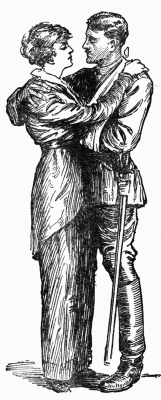
"She'll have to drop that name, Harry," said Kitty firmly. "I can't bear it. Do you think she will?"
"I'm perfectly certain she will, if you've made up your mind she shall," he returned, with an air of profound conviction; "for it's plain to me you've captured the aunt as well as the nephew. Yes, it's a fair cop." "She's a dear," murmured Kitty, very close to his ear.
[1] Copyright in Great Britain, the Colonies, and the United States of America by Charles Garvice, 1914. Dramatic and other rights reserved.
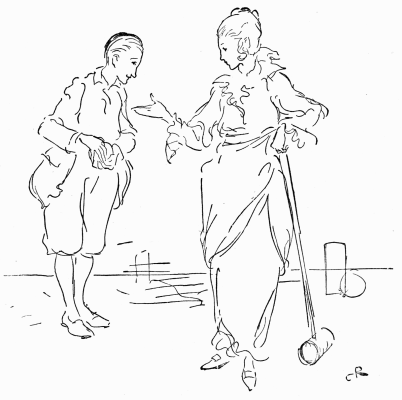
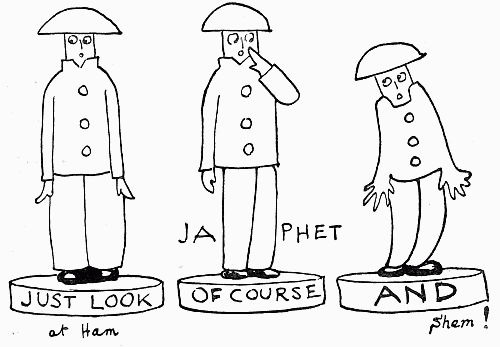
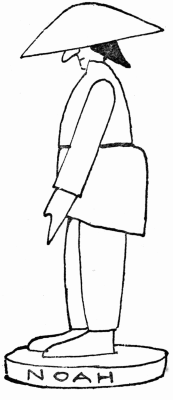
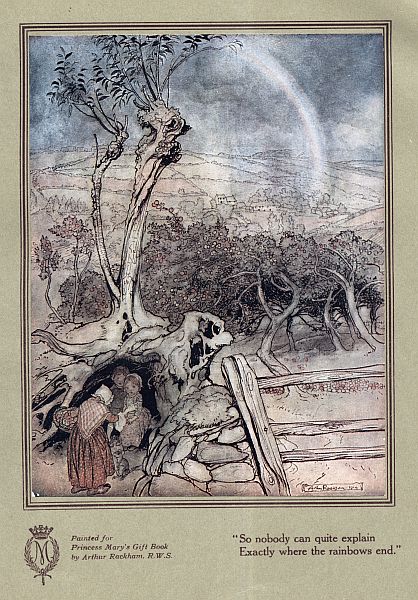
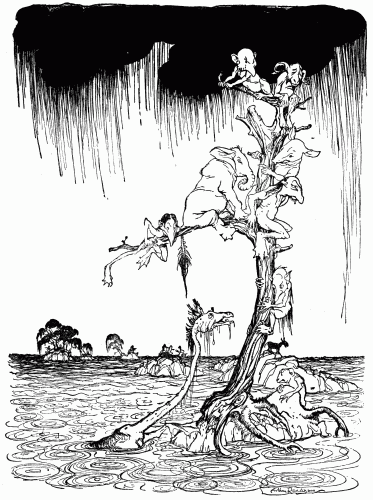
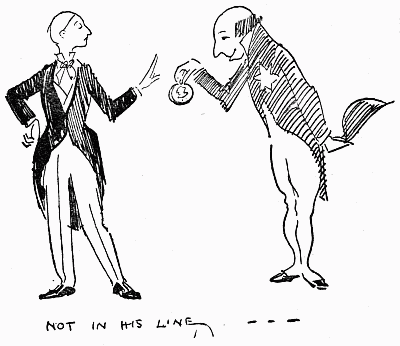
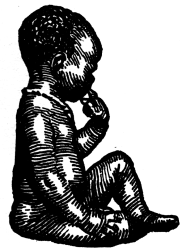
One of these notes—it is contained in a book, much soiled and worn, that evidently its owner had carried about with him for years—reminds me of a conversation I had with Mr. Quatermain long ago when I was his guest in Yorkshire. The note itself is short; I think that he must have jotted it down within an hour or two of the event to which it refers. It runs thus:
"I wonder whether in the 'Land Beyond' any recognition is granted for acts of great courage and unselfish devotion—a kind of spiritual Victoria Cross. If so I think it ought to be accorded to that poor old savage, Magepa, at least it would be if I had any voice in the matter. Upon my word he has made me feel proud of humanity. And yet he was nothing but a 'nigger,' as so many call the Kaffirs."
For a while I, the Editor, wondered to what this entry could allude. Then of a sudden it all came back to me. I saw myself, as a young man, seated in the hall of Quatermain's house one evening after dinner. With me were Sir Henry Curtis and Captain Good. We were smoking, and the conversation had turned upon deeds of heroism. Each of us detailed such acts as he could remember which had made the most impression on him. When we had finished, old Allan said:
"With your leave I'll tell you a story of what I think was one of the bravest things I ever saw. It happened at the beginning of the Zulu war, when the troops were marching into Zululand. Now at that time, as you know, I was turning an honest penny transport-riding for Government, or rather for the military authorities. I hired them three wagons with the necessary voorloopers and drivers, sixteen good salted[64] oxen to each wagon, and myself in charge of the lot. They paid me—well, never mind how much—I am rather ashamed to mention the amount. I asked a good price for my wagons, or rather for the hire of them, of a very well satisfied young gentleman in uniform who had been exactly three weeks in the country, and, to my surprise, got it. But when I went to those in command and warned them what would happen if they persisted in their way of advance, then in their pride they would not listen to the old hunter and transport-rider, but politely bowed me out. If they had, there would have been no Isandhlwana disaster."
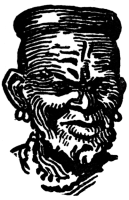
He brooded awhile, for, as I knew, this was a sore subject with him, one of which he would rarely talk. Although he escaped himself, Quatermain had lost friends on that fatal field. He went on:
To return to old Magepa. I had known him for many years. The first time we met was in the battle of the Tugela. I was fighting for the king's son, Umbelazi the Handsome, in the ranks of the Amawombe regiment—I mean to write all that story, for it should not be lost.[2] Well, as I have told you before, the Amawombe were wiped out; of the three thousand or so of them I think only about fifty remained alive after they had annihilated the three of Cetewayo's regiments that set upon them. But Magepa was one who survived.
I met him afterwards at old King Panda's kraal and recognised him as having fought by my side. Whilst I was talking with him the Prince Cetewayo came by; to me he was civil enough, for he knew how I chanced to be in the battle, but he glared at Magepa, and said:
"Why, Macumazahn, is not this man one of the dogs with which you tried to bite me by the Tugela not long ago? He must be a cunning dog also, one who can run fast, for how comes it that he lives to snarl when so many will never bark again? Ow! if I had my way I would find a strip of hide to fit his neck."
"Not so," I answered; "he has the king's peace and he is a brave man—braver than I am, anyway, Prince, seeing that I ran from the ranks of the Amawombe, while he stood where he was."
"You mean that your horse ran, Macumazahn. Well, since you like this dog, I will not hurt him"; and with a shrug he went his way.
"Yet soon or late he will hurt me," said Magepa, when the Prince had gone. "U'Cetewayo has a memory long as the shadow thrown by a tree at sunset. Moreover, as he knows well, it is true that I ran, Macumazahn, though not till all was finished and I could do no more[65] by standing still. You remember how, after we had eaten up the first of Cetewayo's regiments, the second charged us and we ate that up also. Well, in that fight I got a tap on the head from a kerry. It struck me on my man's ring which I had just put on, for I think I was the youngest soldier in that regiment of veterans. The ring saved me; still, for a while I lost my mind and lay like one dead. When I found it again the fight was over and Cetewayo's people were searching for our wounded that they might kill them. Presently they found me and saw that there was no hurt on me.
"'Here is one who shams dead like a stink-cat,' said a big fellow, lifting his spear.
"Then it was that I sprang up and ran, I who was but just married and desired to live. He struck at me, but I jumped over the spear, and the others that they threw missed me. Then they began to hunt me, but, Macumazahn, I, who am named 'The Buck' because I am swifter of foot than any man in Zululand, outpaced them all and got away safe."
"Well done, Magepa," I said. "Still, remember the saying of your people, 'At last the strong swimmer goes with the stream and the swift runner is run down.'"
"I know it, Macumazahn," he answered, with a nod, "and perhaps in a day to come I shall know it better."
I took little heed of his words at the time, but more than thirty years afterwards I remembered them.
Such was my first acquaintance with Magepa. Now, friends, I will tell you how it was renewed at the time of the Zulu war.
As you know, I was attached to the centre column that advanced into Zululand by Rorke's Drift on the Buffalo River. Before war was declared, or at any rate before the advance began, while it might have been and many thought it would be averted, I was employed transport-riding goods to the little Rorke's Drift station, that which became so famous afterwards, and incidentally in collecting what information I could of Cetewayo's intentions. Hearing that there was a kraal a mile or so the other side of the river, of which the people were said to be very friendly to the English, I determined to visit it. You may think this was rash, but I was so well known in Zululand, where for many years, by special leave of the king, I was allowed to go whither I would quite unmolested, that I felt no fear for myself so long as I went alone.
Accordingly one evening I crossed the drift and headed for a kloof in which I was told the kraal stood. Ten minutes' ride brought me in sight of it. It was not a large kraal; there may have been six or eight[66] huts and a cattle enclosure surrounded by the usual fence. The situation, however, was very pretty, a knoll of rising ground backed by the wooded slopes of the kloof. As I approached I saw women and children running to the kraal to hide, and when I reached the gateway for some time no one would come out to meet me. At length a small boy appeared who informed me that the kraal was "empty as a gourd."
"Quite so," I answered; "still, go and tell the headman that Macumazahn wishes to speak with him."
The boy departed, and presently I saw a face that seemed familiar to me peeping round the gateway. After a careful inspection its owner emerged.
He was a tall, thin man of indefinite age, perhaps between sixty and seventy, with a finely-cut face, a little grey beard, kind eyes and very well shaped hands and feet, the fingers, which twitched incessantly, being remarkably long.
"Greeting, Macumazahn," he said. "I see you do not remember me. Well, think of the battle of the Tugela, and of the last stand of the Amawombe, and of a certain talk at the kraal of our Father-who-is-dead" (that is, King Panda), "and of how he who sits in his place" (he meant Cetewayo) "told you that if he had his way he would find a hide rope to fit the neck of a certain one."
"Ah!" I said, "I know you now; you are Magepa the Buck. So the Runner has not yet been run down."
"No, Macumazahn, not yet; but there is still time. I think that many swift feet will be at work ere long."
"How have you prospered?" I asked him.
"Well enough, Macumazahn, in all ways except one. I have three wives, but my children have been few and are dead, except one daughter, who is married and lives with me, for her husband, too, is dead. He was killed by a buffalo, and she has not yet married again. But enter and see."

So I went in and saw Magepa's wives, old women all of them. Also, at his bidding, his daughter, whose name was Gita, brought me some maas, or curdled milk, to drink. She was a well-formed woman, very like her father, but sad-faced, perhaps with a prescience of evil to come. Clinging to her finger was a beautiful boy of something under two years of age, who, when he saw Magepa, ran to him and threw his little arms about his legs. The old man lifted the child and kissed him tenderly, saying:
"It is well that this toddler and I should love one another, Macumazahn, seeing that he is the last of my race. All the other[67] children here are those of the people who have come to live in my shadow."
"Where are their fathers?" I asked, patting the little boy (who, his mother told me, was named Sinala) upon the cheek, an attention that he resented.
"They have been called away on duty," answered Magepa shortly; and I changed the subject.

Then we began to talk about old times, and I asked him if he had any oxen to sell, saying that this was my reason for visiting his kraal.
"Nay, Macumazahn," he answered, in a meaning voice. "This year all the cattle are the king's."
I nodded and replied that, as it was so, I had better be going; whereon, as I half expected, Magepa announced that he would see me safe to the drift. So I bade farewell to the wives and the widowed daughter, and we started.
As soon as we were clear of the kraal Magepa began to open his heart to me.
"Macumazahn," he said, looking up at me earnestly, for I was mounted and he walked beside my horse, "there is to be war. Cetewayo will not consent to the demands of the great White Chief from the Cape"—he meant Sir Bartle Frere. "He will fight with the English; only he will let them begin the fighting. He will draw them on into Zululand and then overwhelm them with his impis and stamp them flat, and eat them up; and I, who love the English, am very sorry. Yes, it makes my heart bleed. If it were the Boers now, I should be glad, for we Zulus hate the Boers; but the English we do not hate; even Cetewayo likes them; still he will eat them up if they attack him."
"Indeed," I answered; and then, as in duty bound, I proceeded to get what I could out of him, and that was not a little. Of course, however, I did not swallow it all, since I suspected that Magepa was feeding me with news that he had been ordered to disseminate.
Presently we came to the mouth of the kloof in which the kraal stood, and here, for greater convenience of conversation, we halted, for I thought it as well that we should not be seen in close talk on the open plain beyond. The path here, I should add, ran past a clump of green bushes; I remember they bore a white flower that smelt sweet, and were backed by some tall grass, elephant-grass I think it was, among which grew mimosa trees.
"Magepa," I said, "if in truth there is to be fighting, why don't[68] you move over the river one night with your people and cattle, and get into Natal?"

"I would if I could, Macumazahn, who have no stomach for this war against the English. But there I should not be safe, since presently the king will come into Natal too, or send thirty thousand assegais as his messengers. Then what will happen to those who have left him?"
"Oh, if you think that," I answered, "you had better stay where you are."
"Also, Macumazahn, the husbands of those women at my kraal have been called up to their regiments, and if their wives fled to the English they would be killed. Again, the king has sent for nearly all our cattle, 'to keep it safe.' He fears lest we Border Zulus might join our people in Natal, and that is why he is keeping our cattle 'safe.'"
"Life is more than cattle, Magepa. At least you might come."
"What! And leave my people to be killed? Macumazahn, you did not use to talk so. Still, hearken. Macumazahn, will you do me a service? I will pay you well for it. I would get my daughter Gita and my little grandson Sinala into safety. If I and my wives are wiped out it does not matter, for we are old. But her I would save, and the boy I would save, so that one may live who will remember my name. Now, if I were to send them across the drift, say at the dawn, not to-morrow, and not the next day, but the day after, would you receive them into your wagon and deliver them safe to some place in Natal? I have money hidden, fifty pieces of gold, and you may take half of these and also half of the cattle if ever I live to get them back out of the keeping of the king."
"Never mind about the money, and we will speak of the cattle afterwards," I said. "I understand that you wish to send your daughter and your little grandson out of danger, and I think you wise, very wise. When once the advance begins, if there is an advance, who knows what may happen? War is a rough game, Magepa. It is not the custom of you black people to spare women and children, and there will be Zulus fighting on our side as well as on yours; do you understand?"
"Ow! I understand, Macumazahn. I have known the face of war and seen many a little one like my grandson Sinala assegaied upon his mother's back."
"Very good. But if I do this for you, you must do something for me. Say, Magepa, does Cetewayo really mean to fight, and if so, how?[69] Oh yes, I know all you have been telling me, but I want not words, but truth from the heart."
"You ask secrets," said the old fellow, peering about him into the gathering gloom. "Still, 'a spear for a spear and a shield for a shield,' as our saying runs. I have spoken no lie. The king does mean to fight, not because he wants to, but because the regiments swear that they will wash their assegais, they who have never seen blood since that battle of the Tugela in which we two played a part; and if he will not suffer it, well, there are more of his race! Also he means to fight thus," and he gave me some very useful information; that is, information which would have been useful if those in authority had deigned to pay any attention to it when I passed it on.
Just as he finished speaking I thought that I heard a sound in the dense green bush behind us. It reminded me of the noise a man makes when he tries to stifle a cough, and frightened me. For if we had been overheard by a spy, Magepa was as good as dead, and the sooner I was across the river the better.
"What's that?" I asked.
"A bush buck, Macumazahn. There are lots of them about here."
Not being satisfied, though it is true that buck do cough like this, I turned my horse to the bush, seeking an opening. Thereon something crashed away and vanished into the long grass. In those shadows, of course, I could not see what it was, but such light as remained glinted on what might have been the polished tip of the horn of an antelope or—an assegai.
"I told you it was a buck, Macumazahn," said Magepa. "Still, if you smell danger, let us come away from the bush, though the orders are that no white man is to be touched as yet."
Then, while we walked on towards the ford, he set out with great detail, as Kaffirs do, the exact arrangements that he proposed to make for the handing over of his daughter and her child into my care. I remember that I asked him why he would not send her on the following morning, instead of two mornings later. He answered because he expected an outpost of scouts from one of the regiments at his kraal that night, who would probably remain there over the morrow and perhaps longer. While they were in the place it would be difficult for him to send away Gita and her son without exciting suspicion.

Near the drift we parted, and I returned to our provisional camp and wrote a beautiful report of all that I had learned, of which report, I may add, no one took the slightest notice.
I think it was the morning before that whereon I had arranged[70] to meet Gita and the little boy at the drift that just about dawn I went down to the river for a wash. Having taken my dip I climbed on to a flat rock to dress myself, and looked at the billows of beautiful, pearly mist which hid the face of the water, and considered—I almost said listened to—the great silence, for as yet no live thing was stirring.
Ah! if I had known of the hideous sights and sounds that were destined to be heard ere long in this same haunt of perfect peace! Indeed, at that moment there came a kind of hint or premonition of them, since suddenly through the utter quiet broke the blood-curdling wail of a woman. It was followed by other wails and shouts, distant and yet distinct. Then the silence fell again.
Now, thought I to myself, that noise might very well have come from old Magepa's kraal; luckily, however, sounds are deceptive in mist.
Well, the end of it was that I waited there till the sun rose. The first thing on which its bright beams struck was a mighty column of smoke rising to heaven from where Magepa's kraal had stood!
I went back to my wagons very sad, so sad that I could scarcely eat my breakfast. While I walked I wondered hard whether the light had glinted upon the tip of a buck's horn in that patch of green bush with the sweet-smelling white flowers a night or two ago. Or had it perchance fallen upon the point of the assegai of some spy who was watching my movements! In that event yonder column of smoke and the horrible cries which preceded it were easy to explain. For had not Magepa and I talked secrets together, and in Zulu.
On the following morning at the dawn I attended at the drift in the faint hope that Gita and her boy might arrive there as arranged. But nobody came, which was not wonderful, seeing that Gita lay dead, stabbed through and through, as I saw afterwards (she made a good fight for the child), and that her spirit had gone to wherever go the souls of the brave-hearted, be they white or black. Only on the farther bank of the river I saw some Zulu scouts who seemed to know my errand, for they called to me, asking mockingly where was the pretty woman I had come to meet?
After that I tried to put the matter out of my head, which indeed was full enough of other things, since now definite orders had arrived as to the advance, and with these many troops and officers.
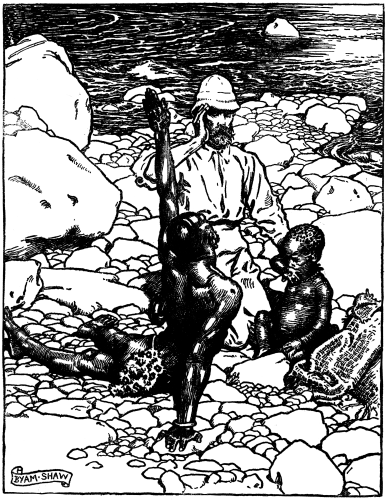 "Then he lifted himself upon one arm, and
with the other saluted"
"Then he lifted himself upon one arm, and
with the other saluted"
It was just then that the Zulus began to fire across the river at such of our people as they saw upon the bank. At these they took aim, and, as a result, hit nobody. A raw Kaffir with a rifle, in my[72] experience, is only dangerous when he aims at nothing, for then the bullet looks after itself, and may catch you. To put a stop to this nuisance a regiment of the friendly natives—there may have been several hundred of them—was directed to cross the river and clear the kloofs and rocks of the Zulu skirmishers who were hidden among them. I watched them go off in fine style.

Towards evening some one told me that our impi, as he grandiloquently called it, was returning victorious. Having at the moment nothing else to do, I walked down to the river at a point where the water was deep and the banks were high. Here I climbed to the top of a pile of boulders, whence with my field-glasses I could sweep a great extent of plain which stretched away on the Zululand side till at length it merged into hills and bush.
Presently I saw some of our natives marching homewards in a scattered and disorganised fashion, but evidently very proud of themselves, for they were waving their assegais and singing scraps of war-songs. A few minutes later, a mile or more away, I caught sight of a man running.
Watching him through the glasses I noted three things: first, that he was tall; secondly, that he ran with extraordinary swiftness; and, thirdly, that he had something tied upon his back. It was evident, further, that he had good reason to run, since he was being hunted by a number of our Kaffirs, of whom more and more continually joined in the chase. From every side they poured down upon him, trying to cut him off and kill him, for as they got nearer I could see the assegais which they threw at him flash in the sunlight.
Very soon I understood that the man was running with a definite object and to a definite point; he was trying to reach the river. I thought the sight very pitiful, this one poor creature being hunted to death by so many. Also I wondered why he did not free himself from the bundle on his back, and came to the conclusion that he must be a witch-doctor, and that the bundle contained his precious charms or medicines.
This was while he was yet a long way off, but when he came nearer, within three or four hundred yards, of a sudden I caught the outline of his face against a good background, and knew it for that of Magepa.
"My God!" I said to myself, "it is old Magepa the Buck, and the bundle in the mat will be his grandson, Sinala!"
Yes, even then I felt certain that he was carrying the child upon his back.
What was I to do? It was impossible for me to cross the river at that place, and long before I could get round by the ford all would be finished. I stood up on my rock and shouted to those brutes of Kaffirs to let the man alone. They were so excited that they did not hear my words; at least, they swore afterwards that they thought I was encouraging them to hunt him down.
But Magepa heard me. At that moment he seemed to be failing, but the sight of me appeared to give him fresh strength. He gathered himself together and leapt forward at a really surprising speed. Now the river was not more than three hundred yards away from him, and for the first two hundred of these he quite outdistanced his pursuers, although they were most of them young men and comparatively fresh. Then once more his strength began to fail.
Watching through the glasses I could see that his mouth was wide open, and that there was red foam upon his lips. The burden on his back was dragging him down. Once he lifted his hands as though to loose it; then with a wild gesture let them fall again.
Two of the pursuers who had outpaced the others crept up to him—lank, lean men of not more than thirty years of age. They had stabbing spears in their hands, such as are used at close quarters, and these of course they did not throw. One of them gained a little on the other.
Now Magepa was not more than fifty yards from the bank, with the first hunter about ten paces behind him and coming up rapidly. Magepa glanced over his shoulder and saw, then put out his last strength. For forty yards he went like an arrow, running straight away from his pursuers, until he was within a few feet of the bank, when he stumbled and fell.
"He's done," I said, and, upon my word, if I had a rifle in my hand I think I would have stopped one or both of those bloodhounds and taken the consequences.
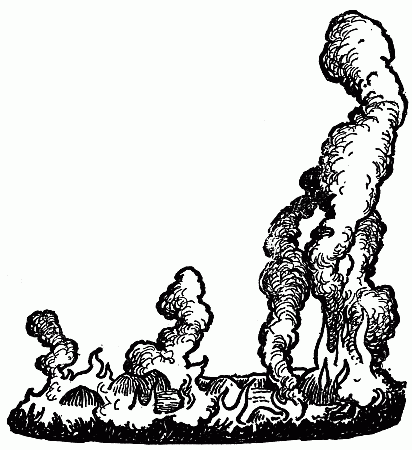
But, no! Just as the first man lifted his broad spear to stab him through the back on which the bundle lay, Magepa leapt up and wheeled round to take the thrust in his chest. Evidently he did not wish to be speared in the back—for[74] a certain reason. He took it sure enough, for the assegai was wrenched out of the hand of the striker. Still, as he was reeling backwards, it did not go through Magepa, or perhaps it hit a bone. He drew out the spear and threw it at the man, wounding him. Then he staggered on, back and back, to the edge of the little cliff.
It was reached at last. With a cry of "Help me, Macumazahn!" Magepa turned, and before the other man could spear him, leapt straight into deep water. He rose. Yes, the brave old fellow rose and struck out for the other bank, leaving a little line of red behind him.
I rushed, or rather sprang and rolled down to the edge of the stream, to where a point of shingle ran out into the water. Along this I clambered, and beyond it up to my middle. Now Magepa was being swept past me. I caught his outstretched hand and pulled him ashore.
"The boy!" he gasped; "the boy! Is he dead?"
I severed the lashings of the mat that had cut right into the old fellow's shoulders. Inside of it was little Sinala, spluttering out water, but very evidently alive and unhurt, for presently he set up a yell.
"No," I said, "he lives, and will live."
"Then all is well, Macumazahn." (A pause.) "It was a spy in the bush, not a buck. He overheard our talk. The king's slayers came. Gita held the door of the hut while I took the child, cut a hole through the straw with my assegai, and crept out at the back. She was full of spears before she died, but I got away with the boy. Till your Kaffirs found me I lay hid in the bush, hoping to escape to Natal. Then I ran for the river, and saw you on the further bank. I might have got away, but that child is heavy." (A pause.) "Give him food, Macumazahn, he must be hungry," (A pause.) "Farewell. That was a good saying of yours—the swift runner is outrun at last. Ah! yet I did not run in vain." (Another pause, the last.) Then he lifted himself upon one arm and with the other saluted, first the boy Sinala and next me, muttering, "Remember your promise, Macumazahn."
"That is how Magepa the Buck died. I never saw any one carrying weight who could run quite so well as he," and Quatermain turned his head away as though the memory of this incident affected him somewhat.
"What became of the child Sinala?" I asked presently.
"Oh, I sent him to an institution in Natal, and afterwards was able to get some of his property back for him. I believe that he is being trained as an interpreter."
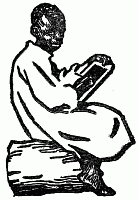
[2] For this story see the book named "Child of Storm," by H. Rider Haggard.

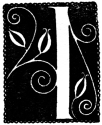
So this was how the Spartans felt about their warriors; and you can imagine their indignation as well as their dismay when, in the year 371 b.c., news reached Sparta that their army had been defeated at the battle of Leuctra by the Bœotians, a rival Grecian State, and that three hundred men had saved their lives in flight. The news was brought at the moment when some great festival was being celebrated in the city. The Ephors commanded the names of the slain to be made known to their relatives, and the women were forbidden to mourn. But the mother of Eucrates could not at first hide her grief, and her neighbours said among themselves:
"Why should she be sorrowful? Her son has died bravely. If he had disgraced himself by flight, then only would she have the right to mourn."
The old man Phidon came in to see her, and found her spinning, busily engaged at her work, it is true, but with tears in her saddened eyes. He was a very stern old man, a Spartan every inch of him, and he spoke harshly to poor Ione.
"Ione," he said, "not one single tear should course down your[76] cheeks, not one single pang of grief should assail your heart. I it is who should weep. I it is who should mourn. For Callias, my grandson, is not amongst the slain. Unlike your brave son Eucrates, my Callias has not died at his post of duty. He lives, and by living he has brought dishonour and shame on his family. How can I meet him? What can I say to him? Nay, I will not look upon his face. I will not vouchsafe one word of greeting to him. His father was the glory of my life, but he is the soul of its shame. The gods have been cruel to me in my old age; but they have been merciful to you, Ione. For your son, death with honour. For my Callias, life with dishonour. His father won the crown of wild olive in the Olympic games, and earned the right of fighting by the king's side, and died there; and I was proud of him. But woe is me that I cannot be proud of Callias."
And, Spartan mother as she truly was, Ione knew well that here was a grief far greater than her own loss of her beloved son. She brushed her last tear aside, and tried to comfort old Phidon, whom she had known all her life. Her son Eucrates and this very Callias had been friends together ever since they were children; and in the days gone by, Phidon and Ione's father had fought side by side for Sparta.
"May be, Phidon," she said, "the gods have spared Callias and his comrades, so that they may yet serve Sparta, and help her to triumph over her enemies."
But he shook his head, and would hear no word of comfort, though, as the days went by, it seemed to ease his stern spirit to sit beside her, and watch her at her work. And then she would speak to him of Callias, and urge him not to be over hard on the lad when he returned.
"You must pardon him, Phidon," she said. "Perchance he will live to do great things for Sparta."
But the old man said proudly: "Nay, Ione, never a word will I speak to Callias again."
And it was in vain that Ione pleaded for the friend of Eucrates, always imploring the old man to believe that the gods in their wisdom had preserved Callias for some splendid act of service and sacrifice yet to come.
Full of these thoughts, and haunted by Phidon's unyielding severity, she had a strange dream one night. She dreamed that King Agesilaus was willing to pardon all those three hundred soldiers who had fled from the field of Leuctra; but that Phidon interposed, and standing in the Public Assembly, gave his vote against the pardon.
"My own grandson is one of the survivors," he cried. "Sparta may pardon him, but I never will."
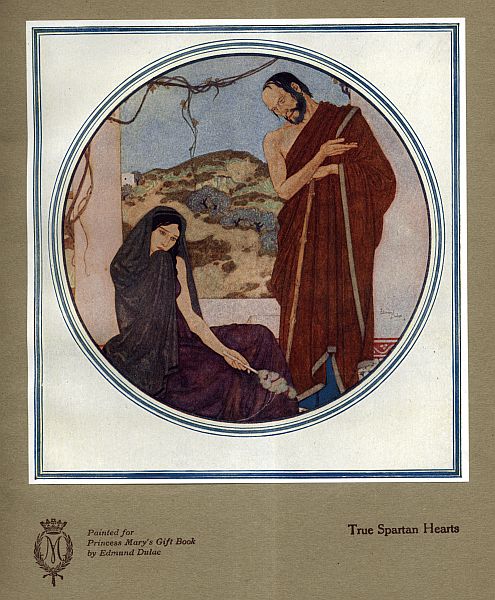
The next day she told her dream to Phidon, and described to him how with her mind's eye she had seen Callias standing lonely and forsaken, the only one of the three hundred survivors who had been spurned and unforgiven. His loneliness stabbed her to her heart, more even than the loss of her son; and because there was no one else, she had been impelled to stand by his side, to greet him, to encourage him, to reassure him. And just as he lifted his head, bowed in grief and shame, she awoke. When Phidon had heard her dream-story, his stern heart was softened.
"I will not turn from Callias," he said. "It may be that you are right, Ione. It may be that the gods will yet give him some great and glorious chance. I will steel my heart to receive him."
So Ione triumphed at last. And truly her dream would seem to have been some kind of divination, for, two or three days afterwards, a decree was proposed by the king, and passed in the Assembly, to the effect that all those who had fled from the field of Leuctra were to be pardoned and received home without dishonour.
Ordinarily all survivors of a defeat were subject to penalties of civil offence, and so this was quite an unusual proceeding; but no doubt it was thought dangerous to take stern measures against such a large number of Spartan citizens. Well, whatever the reason was, there were many glad hearts in Sparta that day, and old Phidon himself owned in secret to Ione that he longed to see Callias once more.
"For I must needs forgive him wholeheartedly," he said, "since Sparta has forgiven him; but with my last breath I would tell you and all the world that I would far, far rather he had fallen by the side of the brave Eucrates. That would have been my glory."
As soon as news had come of the defeat of the Spartan army, the whole remaining military force of Sparta was sent to the rescue, and after some time returned to Sparta, bringing back the survivors from the disastrous field of Leuctra.
Then Spartan hearts were softened, and mothers, wives, and sisters stood waiting to greet those whom the gods had spared for further service. But Ione sat at home spinning. There were no tears in her eyes now, and her countenance was lit up by a calm pride. She had learnt to be glad that she had no one to meet that day.
Suddenly the door opened, and Phidon came in. His manner was strangely excited.
"Callias is not amongst us," he cried. "I have asked for him, and no one knows. Could there have been some mistake, I wonder? Is it possible that——"
At that moment there came a loud knock at the door, and Ione opened it to Timotheus, a neighbour's son.
"Greetings to the mother of Eucrates," he said, as he stood before Ione. "I am from Leuctra. I saw Eucrates fighting in the thickest of the fray. I saw him fall; and there fell another by his side, fighting as gallantly as he—his comrade in death as well as in life."
"And who was it that died with my brave son?" asked Ione, whose hands were pressed together deep into her breast, and whose face was ashen, though tearless.
"It was Callias," answered the young man. "Farewell, honoured mother of Eucrates. I must go and seek Phidon to tell him."
But Phidon rose to his full height, and there was a smile of triumph on his face and a new life in his bearing.
"Phidon has heard the news," he said, "and he thanks the gods for this crowning mercy. For though in his inmost heart he would fain have seen the face of his grandson once more, there was something dearer to him than the face of Callias—it was the honour of Callias."
Then, turning to Ione, he said: "Now we can think of them together, and share our pride in them, Ione."
For one fleeting moment Ione saw a vision of her young, fair son falling before the foe, but her voice never faltered as she said: "Yes, we can share our pride in them."
That was the true Spartan tribute to the heroes of Leuctra.
You see, the Spartans would not admit of despair in their lives; they believed that while there was yet strength in the body, there must needs be hope in the heart that the victory would be won. And so it was the duty of a true Spartan to fight and conquer and live, or to die, striving to conquer to the very last, with no thought of any possibility of failure.
What do you think about this grand old Spartan code of honour? Do you not think that we ourselves, each in our own way, young and old, man and woman, boy and girl, may find something helpful in it to bring to the service of our country?
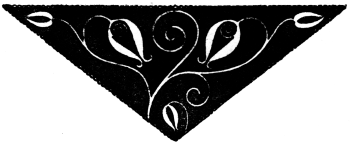
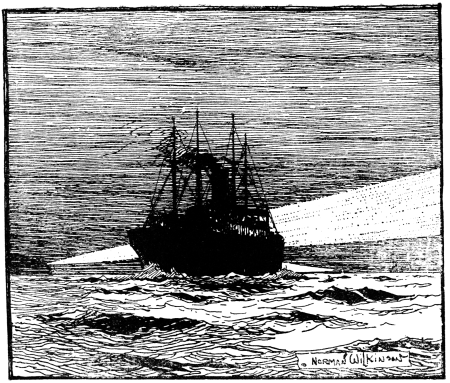 Ship
Ship
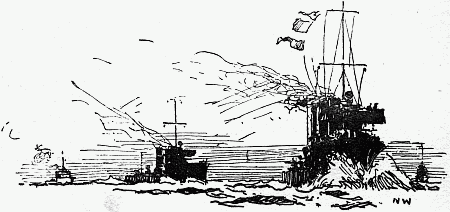
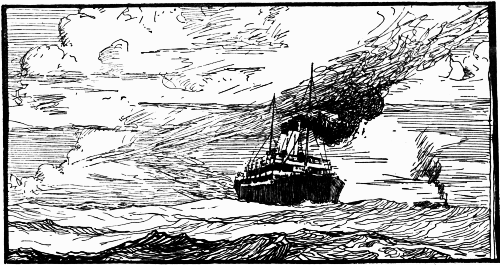
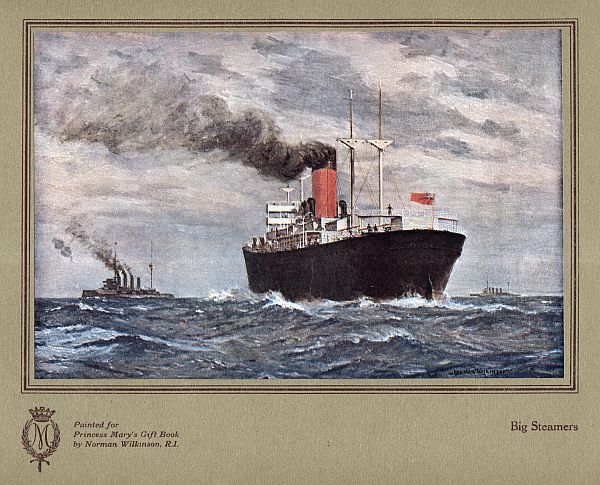
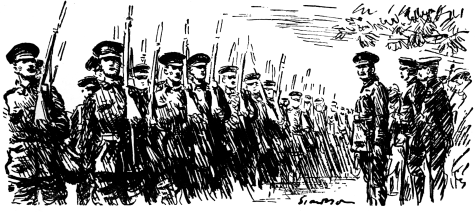
The men had given up a great deal to come and join the Territorial Forces, but it had not yet thoroughly dawned on them any more than on the rest of England, how great was the crisis, and none of the battalions had come out in sufficient strength to be sent out on foreign service.
The inspection by the great General took a long time, and when the order came for rank after rank to lie down, they did so with obvious relief. At last the inspection was over, and all the battalions were asked to converge on one point. At this point a waggon was placed, and all the five thousand men lay down round it, the Generals and their staffs lying behind it. It was a fine sight from the waggon to see those five thousand fine fellows lying there in the light of the setting sun, but was it possible to rouse them to see the country's urgent need?
I began by painting the beauty and the glory of England, the loveliest place in the world, for you may go all over the world, children, and you will never find anything so glorious or welcome on your return as the white cliffs of Dover, and the railway run through the hop gardens of Kent.
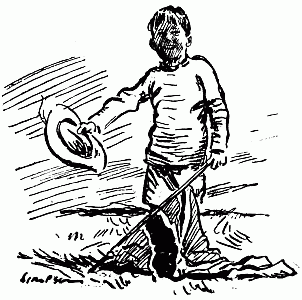
But what touched them most was the thought of what England stood for in the life of the world. It always has been, and always will be, the Home of Freedom. Let a slave once reach a British man-of-war—he is free. Britannia's daughters are rallying to her now because she has given them[82] Freedom, for they see that she is the champion in this war of the Freedom of the World against a universal Tyranny.
Then I turned to what they themselves owed to England, their homes, their faith, their security to work, their happy friendships, and their love of wife, mother, and children. What they had not realised up to now was that all this was in deadly peril for the first time for a hundred years!
One mistake of our Fleets, one crushing defeat in France, and the foe would be upon us; the fate of Belgium would be the fate of England!
What more glorious than to follow the example of those who had fought and died for England?
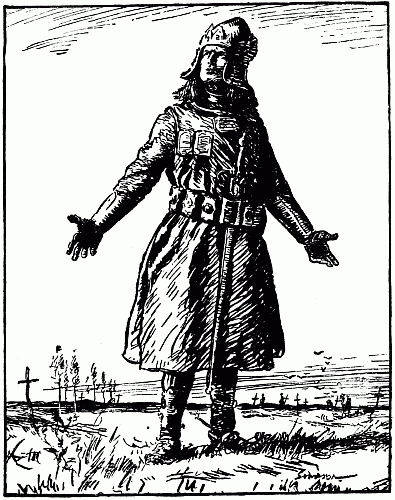
In spite of the presence of the Generals a great cheer broke from the five thousand men when I said, "I would rather die than see England a German province"; but finding that they were allowed to cheer, as deep a cheer followed the statement that, if it came to the last Waterloo, it was far better to slip across the silver streak and fight it on the other side than let an invaders foot for the first time for a thousand years stain our native land.
In the evening all the four battalions present volunteered for foreign service, and as four more at the neighbouring Camp had volunteered the day before in answer to a similar appeal, eight battalions were added to the fighting strength abroad of the British Army.
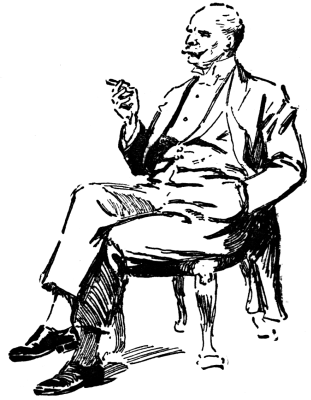
The conversation died away at once, and every one about that dinner table in the Rue St. Florentin looked at him expectantly. He played nervously with the stem of his wineglass for a few moments, as though the complete silence distressed him. Then he resumed with a more diffident air:
"War no doubt inspires noble actions and brings out great qualities in men from whom you expected nothing. But there is another side to it which becomes apparent, not at once, but after a few months of campaigning. Your nerves get overstrained, fatigue and danger tell their tale. You lose your manners, sometimes you degenerate into a brute. I happen to know. Thirty years have passed since the siege of Paris, yet even to-day there is no part of my life which I regret so much as the hours between eleven and twelve o'clock of Christmas night in the year 'seventy. I will tell you about it if you like, although the story may make us late for the opera."
"It will not matter if we are a little late," said his hostess, the Baroness Hammerstein, and her guests agreed with her.
"It is permitted to smoke?" asked the Colonel. For a moment the flame of a match lit up and exaggerated the hollows and the lines upon his lean, rugged face. Then, drawing in his chair to the table, he told his story.
I was a lieutenant of the fifth company of the second battalion of the 103rd Regiment, which belonged to the 23rd Infantry Division. It is as well to be exact. That division was part of the 12th Army Corps under the Crown Prince of Saxony, and in the month of December formed the south-eastern segment of our circle about Paris. On Christmas night I happened to be on duty at a forepost in advance[84] of Noisy-le-Grand. The Centigrade thermometer was down to twelve degrees below zero, and our little wooden hut with the sloping roof, which served us at once as kitchen, mess-room, and dormitory, seemed to us all a comfortable shelter. Outside its door the country glimmered away into darkness, a great white silent plain of snow. Inside, the camp-bedsteads were neatly ranged along the wall where the roof was lowest. A long table covered with a white cloth—for we were luxurious on Christmas night—occupied the middle of the floor; in a corner stood a fine big barrel of Bavarian beer which had arrived that morning as a Christmas present from my mother at Leipzig. We were none of us anxious to turn out into the bitter cold, I can tell you. But we were not colonels in those days, and while the Hauptmann was proposing my mother's health the door was thrust open and an orderly muffled up to the eyes stood on the threshold at the salute.
"The Herr Oberst wishes to see the Herr Lieutenant von Altrock," said he, and before I had time even to grumble he turned on his heels and marched away.
I took down my great-coat, drew the cape over my head, and went out of the hut. There was no wind, nor was the snow falling, but the cold was terrible, and to me who had come straight from the noise of my companions the night seemed unnaturally still. I plodded away through the darkness. Behind me in the hut the Hauptmann struck up a song, and the words came to me quite clearly and very plaintively across the snow:
I wondered whether in the morning, like that comrade, I should be a man to be mentioned in the past tense. For more than once a sentinel had been found frozen dead at his post, and I foresaw a long night's work before me. My Colonel had acquired a habit of choosing me for special services, and indeed to his kindness in this respect I owed my commission.
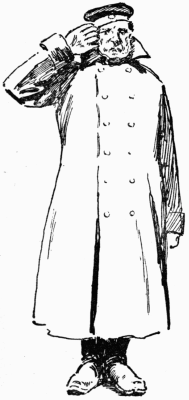
I found him sitting at a little table drawn close to the fire in a bare, dimly-lighted room. A lamp stood on the table, and he was peering at a crumpled scrap of paper and smoothing out its creases. So engrossed was he, indeed, in his scrutiny that it was some minutes before he raised his head and saw me waiting for his commands.
"Lieutenant von Altrock," he said, "you must ride to Raincy."
Raincy was only five miles distant, as the crow flies. Yes, but the French had made a sortie on the 21st, they had pushed back our lines, and they now held Ville Evrart and Maison Blanche between Raincy and Noisy-le-Grand. I should have to make a circuit; my five miles became ten. I did not like the prospect at all. I liked it still less when the Colonel added:
"You must be careful. More than one German soldier has of late been killed upon that road. There are francs-tireurs about. And you must reach Raincy."
It was a verbal message which he gave me, and I was to deliver it in person to the commandant of the battery at Raincy.
"There is a horse ready for you at the stables," said the Colonel, and with a nod he turned again to his scrap of paper. I saluted and walked to the door. As my hand was on the knob he called me back.
"What do you make of it?" he asked, holding the paper out to me. "It was picked out of the Marne in a sealed wine-bottle."
I took the paper, and saw that a single sentence was written upon it in a round and laborious hand with the words misspelt. The meaning of the sentence seemed simple enough. It was apparently a message from a M. Bonnet to his son in the Mobiles at Paris, and it stated that the big black cat had had five kittens.
"What do you make of it?" repeated the Colonel.
"Why, that M. Bonnet's black cat has kittens," said I.
I handed the paper back. The Colonel looked at it again, shrugged his shoulders, and laughed.
"Well, after all, perhaps it does mean no more than that," said he.
But for the Colonel's suspicions I should not have given another thought to that misspelt scrawl. M. Bonnet was probably some little peasant engrossed in domestic affairs, who thought that no message could be more consoling to his son locked up in Paris than this great news about the black cat.
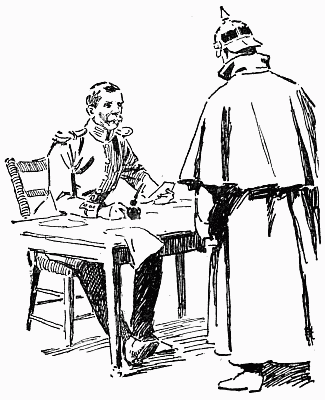
The wildest rumours were flying about our camp at that time, as I think will always happen when you have a large body of men living under a great strain of cold and privation and peril. They perplexed the seasoned officers and they were readily swallowed by the youngsters, of whom I was one. Now, this scrap of paper happened to fit in with the rumour which most of all exercised our imaginations.
It was known that in spite of all our[86] precautions news was continually leaking into Paris which we did not think it good for the Parisians to have. On that very Christmas Day they already knew that General Faidherbe, at Pont Noyelles, had repulsed a portion of our first army under General Manteuffel. How did they know? We were not satisfied that pigeons and balloons completely explained the mystery. No, we believed that the news passed somewhere through our lines on the south-east of Paris—news in cipher which was passed on and on to a house close to our lines, whence, as occasion served, it was carried into Paris.
That was the rumour. There may have been truth in it, or it may have been entirely false. But, at all events, it had just the necessary element of fancy to appeal to the imagination of a very young man, and as I walked to the stables and mounted the horse which the Colonel had lent me, I kept wondering whether this message, so simple in appearance, had travelled so, and was covering its last stage between the undiscovered château and Paris in the sealed wine-bottle. I tried to make out what the black cat stood for in the cipher, and whose identity was concealed under the pseudonym of M. Bonnet. So I rode down the slope of Noisy-le-Grand.
But at the bottom of the slope these speculations passed entirely from my mind. In front, hidden away in the darkness, lay the dangers of Ville Evrart and Maison Blanche. German soldiers had ridden along this path and had not returned; the francs-tireurs were abroad. Yet I must reach Raincy. Moreover, in my own mind, I was equally convinced that I must return. I saw the little beds against the wall of the hut under the sloping roof. I rode warily, determined to sleep in one of them that night, determined to keep my life if it could be kept.
I crossed the Marne and turned off the road into a forest path. Ville Evrart with its French garrison lay now upon my left behind the screen of trees. Fortunately there was no moon that night and a mist hung in the air. The snow, too, deadened the sound of my horse's hoofs. But I rode, nevertheless, very gently and with every sense alert. Each moment I expected the challenge of a sentinel in French.
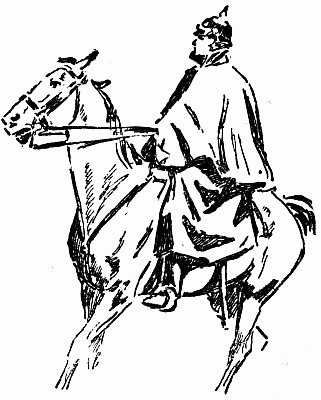
I came to the end of the wood and rode on to Chesnay. Here the country was more open, and I had passed Ville Evrart. But I did not feel any greater security. I was possessed with a sort of rage to get my business done and live—yes, at all costs live. A mile beyond Chesnay I came to cross-roads,[87] and within the angle which the two roads made a little cabin stood upon a plot of grass. I was in doubt which road to take. The cabin was all dark, and riding up to the door I hammered upon it with the butt of my pistol. It was not immediately opened. There must indeed have been some delay, since the inmates were evidently in bed. But I was not in any mood to show consideration. I wanted to get on—to get on and live. A little window was within my reach. I dashed the butt of the pistol violently through the glass.
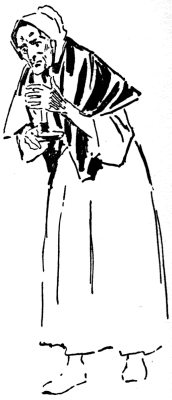
"Will that waken you, eh?" I cried, and almost before I had finished I heard a shuffling footstep in the passage and the door was opened. A poor old peasant-woman, crippled with rheumatism, stood in the doorway shading a lighted candle with a gnarled, trembling hand. In her haste to obey she had merely thrown a petticoat over the shoulders of her nightdress, and there she stood with bare feet, shivering in the cold, an old bent woman of eighty, and apologised.
"I am sorry, monsieur," she said meekly. "But I cannot move as quickly as I could when I was young. How can I serve monsieur?"
Not a word of reproach about her broken window. You would think that the hardest man must have felt some remorse. I merely broke in upon her apologies with a rough demand for information.
"The road upon your right leads to Chelles, monsieur," she answered. "That upon your left to Raincy."
I rode off without another word. It is not a pretty description which I am giving to you, but it is a true one. That is my regret, it is a true one. I forgot that old peasant-woman the moment I had passed the cabin. I thought only of the long avenues of trees which stretched across that flat country, and which could hide whole companies of francs-tireurs. I strained my eyes forwards. I listened for the sound of voices. But the first voice which I heard spoke in my own tongue.
It was the voice of a sentry on the outposts of Raincy, and I could have climbed down from my saddle and hugged him to my heart. Instead, I sat impassively in my saddle and gave him the countersign. I was conducted to the quarters of the commandant of artillery and I delivered my message.
"You have come quickly," he said. "What road did you take?"
"That of Chesnay and Gagny."
The commandant looked queerly at me.
"Did you?" said he. "You are lucky. You will return by Montfermeil and Chelles, Lieutenant von Altrock, and I will send an escort with you. Apparently we are better informed at Raincy than you at Noisy-le-Grand."
"I knew there was danger, sir," I replied.
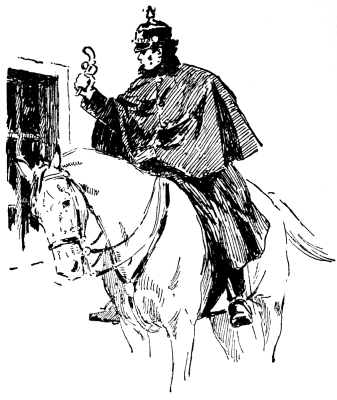
A regiment of dragoons was quartered at Raincy, and from it two privates and a corporal were given me for escort. In the company of these men I started back by the longer road in the rear of our lines. And it was a quarter to ten when I started. For I noticed the time of a clock in the commandant's quarters. I should think that it must have taken three-quarters of an hour to reach Montfermeil, for the snow was deep here and the mist very thick. Beyond Montfermeil, however, we came to higher ground; there were fewer drifts of snow, and the night began to clear, so that we made better going. We were now, of course, behind our lines, and the only risk we ran was that a few peasants armed with rifles from a battlefield or a small band of francs-tireurs might be lurking on the chance of picking off a straggler. But that risk was not very great now that there were four of us. I rode therefore with an easier mind, and the first thing which entered my thoughts was—what do you think? The old peasant-woman's cabin with the broken window? Not a bit of it. No, it was M. Bonnet's black cat. Had M. Bonnet's cat five kittens? Or was that intended to inform the people in Paris how many companies of recruits had joined one of the French armies still in the field—say, General Faidherbe's, at Bapaume, and so to keep up their spirits and prolong the siege? I was still puzzling over this problem when in a most solitary place I came suddenly upon a château with lighted windows. This was the Château Villetaneuse. I reined in my horse and stopped. My escort halted behind me. It was, after all, an astonishing sight. There were many châteaux about Paris then, as there are now, but not one that I had ever come across was inhabited by more than a caretaker. The owners had long since fled. Breached walls, trampled gardens, gaping roofs, and silence and desertion—that is what we meant when we spoke of a château near Paris in those days. But here was one with lighted windows on the first and second stories staring out calmly on the snow as though never a Prussian soldier had crossed the Rhine. A thick clump of trees sheltered it behind, and it faced the eastern side of the long ridge of Mont Guichet, along the foot of which I rode—the side farthest from Paris. From the spot where I and my escort had halted an open park stretched level to the door. The house had, no doubt, a very homelike look on that cold night. It should have spoken to me, no doubt, of the well-ordered family life and the gentle occupations of women. But I was thinking of M. Bonnet's black cat. Was this solitary château the undiscovered last station on the underground road through which the news passed into Paris? If not, why was it still inhabited? Why did the lights blaze out upon the snow so late?
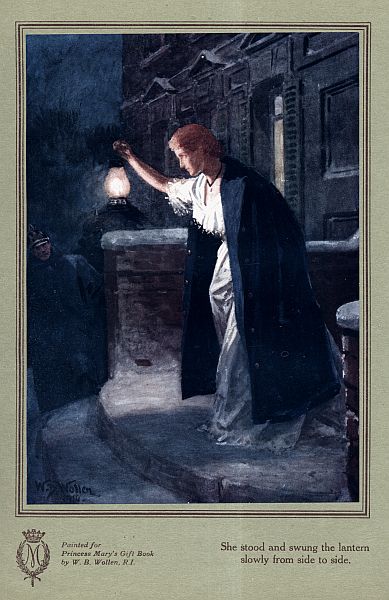
I commanded my escort to be silent. We rode across the park, and half-way to the door we came upon a wire fence and a gate. There we dismounted, and walked our horses. We tethered them to a tree about twenty yards from the house. I ordered one of my dragoons to go round the house, and watch any door which he might find at the back. I told the other two to stay where they were, and I advanced alone to the steps, but before I had reached them the front door was thrown open, and a girl with a lantern in her hand came out.
She held the lantern high above her head and peered forward, so that the light fell full upon her hair, her face, and dress. She was a tall girl and slight of figure, with big, dark eyes, and a face pretty and made for laughter. It was very pale now, however, and the brows were drawn together in a frown. She wore a white evening frock, which glistened in the lantern light, and over her bare shoulders she had flung a heavy black military cloak. So she stood and swung the lantern slowly from side to side as she stared into the darkness, while the lights and shadows chased each other swiftly across her white frock, her anxious face, and the waves of her fair hair.
"Whom do you expect at this hour, mademoiselle?" I asked.
I was quite close to her, but she had not seen me, for I stood at the bottom of the steps, and she was looking out over my head. Yet she did not start or utter any cry. Only the lantern rattled in her hand. Then she stood quite still for a moment or two, and afterwards lowered her arm until the light shone upon me.
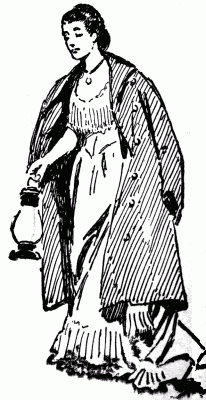
"You are Prussian?" she said.
"A lieutenant of foot," I answered. "You have nothing to fear."
"I am not afraid," she replied quietly.
"Whom do you expect?"
"No one," she replied. "I thought that I heard the rattle of iron as though a horse moved and a stirrup rang. It is lonely here since our neighbours have fled. I came out to see."
"The lantern then, was not a signal, mademoiselle?" I asked.
She looked at me in perplexity, and certainly the little piece of acting, I thought, was very well done.
"A signal?" she repeated. "To whom?"
"To some man hiding in the woods of Mont Guichet, a signal to him that he may come and fetch the news for Paris which has lately—very lately—been brought to the house."
She bent forward and peered down at me, drawing the cloak closer about her neck.
"You are under some strange mistake, monsieur," she said. "No news for Paris has been brought to this house by any one."
"Indeed?" I answered. "And is that so?" Then I stretched out my hand and said triumphantly: "You will tell me perhaps that the cloak upon your shoulders is a woman's cloak?"
And she laughed! It was humiliating; it is always humiliating to a young man not to be taken seriously, isn't it? There was I thinking that I had fairly cross-examined her into a trap, and she laughed indulgently. And she explained indulgently, too.
"The cloak I am wearing belongs to a wounded French officer who was taken prisoner and released upon parole. He is now in our house."
"Then I think I will make his acquaintance," I said, and over my shoulder I called to the corporal. As he advanced to my side, a look of alarm came into the girl's face.
"You are not alone," she said, and suddenly her face became wistful and her voice began to plead. "You have not come for him? He has done no harm. He could not, even if he would. And he would not, for he has given his parole. Oh, you are not going to take him away?"
"That we shall see, mademoiselle."
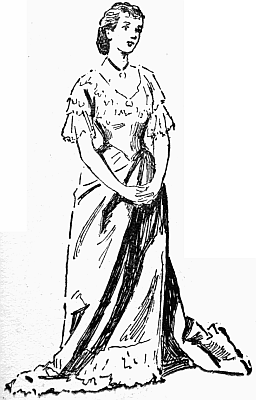
I left one dragoon at the door. I ordered the corporal to wait in the hall, and I followed the girl up the stairs to the first floor. All her pride had gone; she led the way with a submission of manner which seemed to me only a fresh effort to quiet my suspicions. But they were not quieted. I distrusted her; I believed that I had under my fingers the proof of that rumour which flew about our camp. She stopped at a door, and as she turned the handle she said:
"This is my own room, monsieur. We all use it now, for it is warmer than the others, and all our servants but one have fled."
It was a pretty room, and cheery enough to one who came into it from the darkness and the snow. A piano stood open in a corner with a rug thrown upon it to protect the strings from the cold; books lay upon the tables, heavy curtains were drawn close over the windows,[91] there were cushioned sofas and deep arm-chairs, and a good fire of logs blazed upon the hearth. These details I took in at once. Then I looked at the occupants. A young man lay stretched upon a sofa close to the fire with a wrap covering his legs. The wrap was raised by a cradle to keep off its weight. His face must have been, I think, unusually handsome when he had his health; at the moment it was so worn and pale, and the eyes were so sunk, that all its beauty had gone. The pallor was accentuated by a small black moustache he wore and his black hair. He lay with his head supported upon a pillow, and was playing a game of chess with an old lady who sat at a little table by his side. I advanced to the fire and warmed my hands at it.
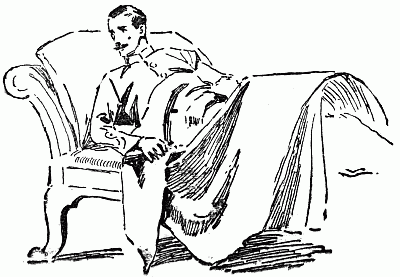
"You, sir, are the wounded officer on parole?" I said in French. The officer bowed.
"And you, madame?" I asked of the old lady. The sight of my uniform seemed to have paralysed her with terror. "Come, come, madame," I exclaimed impatiently; "it is a simple question."
"Monsieur, you frighten her," said the young lady. "It is my aunt, the Baroness Granville."
"You tell me nothing of yourself," I said to her, and she looked at me in surprise.
"Since you have come with an escort to this house I imagined you must know to whom it belonged. I am Sophie de Villetaneuse."
"Exactly," I replied, as though I had known all along, and had merely asked the question to see whether she would speak the truth. "Now, mademoiselle, will you please explain to me how it is that while your neighbours have fled you remain at your château?"
"It is quite simple," she answered. "My mother is bed-ridden. She could not be moved. She could not be left alone."
"You will pardon me," said I, "if I test that statement."
The wounded officer raised himself upon his elbow as though to protest, but Mademoiselle de Villetaneuse put out a hand and checked him. She showed me a face flushed with anger, but she spoke quite quietly.
"I will myself take you to my mother's room."
I laughed. I said: "That is just what I expected. You will take me to your mother's room and leave your friends here to make any little preparations in the way of burning awkward papers which they may think desirable. Thank you, no! I am not so easily caught."
Mademoiselle Sophie was becoming irritated.
"There are no awkward papers!" she exclaimed.
"That statement, too, I shall put to the test."
I went to the door, and standing so that I could still keep an eye upon the room, I called the corporal.
"You will search the house thoroughly," I said, "and quickly. Bring me word how many people you find in it. You, mademoiselle, will remain in the room with us."
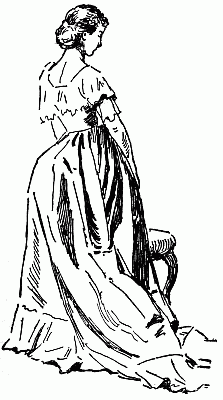
She shrugged her shoulders as I closed the door and came back into the room.
"You were wounded, monsieur," I said to the Frenchman. "Where?"
"In the sortie on Le Bourget."
"And you came here the moment you were released on your parole?"
The wounded officer turned with a smile to Mademoiselle Sophie.
"Yes, for here live my best friends."
He took her hand, and with a Frenchman's grace he raised it to his lips and kissed it. And I was suddenly made acquainted with the relationship in which these two, youth and maid, stood to one another. Mademoiselle Sophie had cried out on the steps against the possibility that I might have come to claim my prisoner. But though she spoke no word, she was still more explicit now. With the officer that caress was plainly no more than a pretty way of saying thanks; it had the look of a habit, it was so neatly given, and he gave it without carelessness, it is true, but without warmth. But she received it very differently. He did not see, because his head was bent above her hand, but I did.
I saw the look of pain in her face, the slight contraction of her shoulders and arms, as if to meet a blow. The kiss hurt her—no, not the kiss, but the finished grace with which it was given, the proof, in a word, that it was a way of saying "Thanks"—and nothing more. Here was a woman who loved and a man who did not love, and the woman knew.
I resumed my questions:
"Your doctor, monsieur, is in the house?"
"At this hour? No."
"Ah. That is a pity."
The young man lifted his head from his pillow and looked me over from head to foot with a stare of disdain.
"I do not quite understand. You doubt my word, monsieur!"
"Why not?" I asked sharply.
It was quite possible that the cradle, this rug across his legs, the pillow, were all pretences. This young officer might very well have brought in a cipher message to the Château Villetaneuse. Mademoiselle Sophie might very well have waved her lantern at the door to summon a fresh messenger.
"No; why should I not doubt your word?" I repeated.
He turned his face to the old lady. "It is your move, Baronne," he said, and she placed the piece she held upon a square of the board. Mademoiselle Sophie took her stand by the table between the players, and the game went on just as though there were no intruder in the room. It was uncomfortable for me. I shifted my feet. I tried to appear at my ease; finally I sat down in a chair. They took no notice of me whatever. I was very glad when at last the corporal opened the door. He had searched the house—he had found no one but Madame de Villetaneuse and an old servant who was watching by her bed.
"Very well," said I, and the corporal returned to the hall.
Mademoiselle Sophie moved away from the chess-table. She came and stood opposite to me, and though her face was still, her eyes were hard with anger.
"And now perhaps you will tell me to what I owe your visit?" she said.
"Certainly," I returned. I fixed my eyes on her, and I said slowly, "I have come to ask for more news of M. Bonnet's black cat."
Mademoiselle Sophie stared as if she was not sure whether I was mad or drunk, but was very sure I was one or the other. The young Frenchman started upon his couch, with the veins swelling upon his forehead and a flushed face.
"This is an insult," he cried savagely, and no less savagely I answered him.
"Hold your tongue!" I cried. "You forget too often that though you are on parole you are still a prisoner."
He fell back upon the sofa with a groan of pain, and the girl hurried to his side.
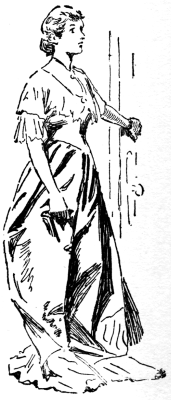
Meanwhile I had been looking about the room for a box or a case where the cipher messages might be hid. I saw nothing of the kind. Of course they might be hidden between the pages of a book. I went from table to table, taking them by the boards and shaking the leaves. Not a scrap of paper tumbled out. There was another door in the room besides that which led on to the landing.
"Mademoiselle, what room is that?" I asked.
"My bedroom," she answered simply, and with a gesture full of dignity she threw open the door.
I carried the mud and snow and the grime of a camp without a[93]
[94]
scruple of remorse into that neat and pretty chamber. Mademoiselle
Sophie followed me as I searched wardrobe and drawer and box. At
last I came to one drawer in her dressing-table which was locked. I
looked suddenly at the young lady. She was watching me out of the
corners of her eyes with a peculiar intentness.
"Open that drawer, mademoiselle," I said.
"It contains only some private things."
"Open that drawer or I burst it open."
"No," she cried, as I jerked the handle. "I will open it."
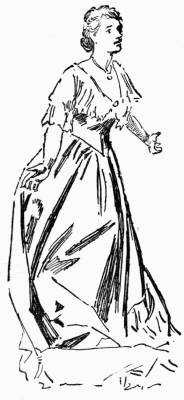
She fetched the key out of another drawer which was unlocked, and fitted it into the lock of the dressing-table. And all the while I saw that she was watching me. She meant to play me some trick, I was certain. So I watched, too, and I did well to watch. She turned the key, opened the drawer, and then snatched out something with extraordinary rapidity and ran as hard as she could to the door—not the door through which we had entered, but a second door which gave on to the passage. She ran very fast and she ran very lightly, and she did not stumble over a chair as I did in pursuit of her. But she had to unlatch the door and pull it open. I caught her up and closed my arms about her. It was a little carved ebony box which she held, the very thing for which I searched.
"I thought so," I cried, with a laugh. "Drop the box, mademoiselle. Drop it on the floor!"
The noise of our struggle had been heard in the next room. The Baroness rushed through the doorway.
"What has happened?" she cried. "Mon Dieu! you are killing her!"
"Drop that box, mademoiselle!"
And as I spoke she threw it away. She threw it through the doorway; she tried to throw it over the banisters of the stairs, but my arms were about hers, and it fell in the passage just beyond the door. I darted from her and picked it up. When I returned with it she was taking a gold chain from her neck. At the end of the chain hung a little gold key. This she held out to me.
"Open it here," she said in a low, eager voice.
The sudden change only increased my suspicions, or rather my conviction, that I had now the proof which I needed.
"Why, if you are so eager to show me the contents, did you try to throw it away?" I asked.
"I tried to throw it down into the hall," she answered.
"My corporal would have picked it up."
"Oh, what would that matter?" she exclaimed impatiently. "You would have opened it in the hall. That was what I wanted. Open it here! At all events open it here!"
The very urgency of her pleading made me determined to refuse the plea.
"No, you have some other ruse, mademoiselle," said I. "Perhaps you wish to gain time for your friend in the next room. No, we will return there and open it comfortably by the fire."
I kept a tight hold upon the box. I shook it. To my delight I felt that there were papers within it. I carried it back to the fireside and sat down on a chair. Mademoiselle Sophie followed me close, and as I fixed the little gold key into the lock she laid her hand very gently upon my arm.
"I beg you not to unlock that box," she said; "if you do you will bring upon me a great humiliation and upon yourself much remorse. There is nothing there which concerns you. There are just my little secrets. A girl may have secrets, monsieur, which are sacred to her."
She was standing quite close to me, and her back was towards the French officer and her aunt. They could not see her face, and they could hardly have heard more than a word here and there of what she said. I answered her only by turning the key in the lock. She took her hand from my arm and laid it on the lid to hinder me from opening it.
"I wore the key on a chain about my neck, monsieur," she whispered. "Does that teach you nothing? Even though you are young, does it teach you nothing? I said that if you unlocked that box you would cause me great humiliation, thinking that would be enough to stop you. But I see I must tell you more. Read the letters, monsieur, question me about them, and you will make my life a very lonely one. I think so. I think you will destroy my chance of happiness. You would not wish that, monsieur. It is true that we are enemies, but some day this war will end, and you would not wish to prolong its sufferings beyond the end. Yet you will be doing that, monsieur, if you open that box."
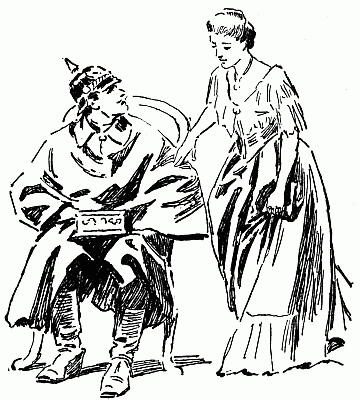
It seems now almost impossible to me that I could have doubted her sincerity: she spoke with so much simplicity, and so desperate an appeal looked out from her dark eyes. Ever since that Christmas night I can see her quite clearly at will, standing as she then stood—all the sincerity of her which I would not acknowledge, all the appeal which I would not hear; and I see her many times when for my peace[96] I would rather not. She was pleading for her pride, and to do that the better she laid her pride aside; yet she never lost her dignity. She was pleading for her chance of happiness, foreseeing that it was likely to be destroyed, without any reason or any profit to a living being, by a stranger who would the next moment pass out of her life. Yet there was no outcry, and there were no tears. Had it been a trick—I ask the ladies—would there not have been tears?
But I thought it a trick and a cheap one. She was trying to make me believe that there were love-letters in the box—compromising love-letters. Now, I knew that there were no love-letters in the box. I had seen the Frenchman's pretty way of saying thanks. I had noticed how the caress hurt her just through what it lacked. He was the friend, you see, and nothing more; she was the lover and the only lover of the pair.
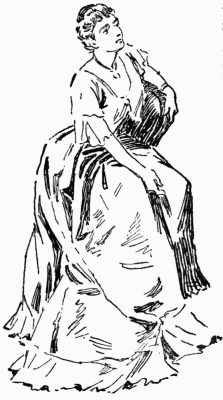
I opened the box accordingly. Mademoiselle Sophie turned away abruptly, and sitting down in a chair shaded her eyes with her hand. I emptied the letters out on to a table, turning the box upside down, and thus the first which I took up and read was the one which lay at the very bottom. As I read it it seemed that every suspicion I had formed was established. She had hinted at love-letters, she had spoken of secrets sacred to a girl; and the letter was not even addressed to her. It was addressed to Madame de Villetaneuse; it was a letter which, if it meant no more than what was implied upon the surface, would have long since found destruction in the waste-paper basket. For it purported to be merely the acceptance of an invitation to dinner at the town house of Madame de Villetaneuse in the Faubourg St. Germain. It was signed only by a Christian name, "Armand," and the few sentences which composed the letter explained that M. Armand was a distant kinsman of Madame de Villetaneuse who had just come to Paris to pursue his studies, and who, up till now, had no acquaintance with the family.
I looked at Mademoiselle Sophie sternly. "So all this pother was about a mere invitation to dinner! Once let it be known that M. Armand will dine with Madame de Villetaneuse in the Faubourg St. Germain, and you are humiliated, you lose your chance of happiness, and I, too, shall find myself in good time suffering the pangs of remorse," and I read the letter slowly aloud to her, word by word.
She returned no answer. She sat with her hand shading her face, and she rocked her head backwards and forwards continually and rather[97] quickly, like a child with a racking headache. Of course, to my mind all that was part of the game. The letter was dated two years back, but the month was December, and, of course, to antedate would be the first precaution.
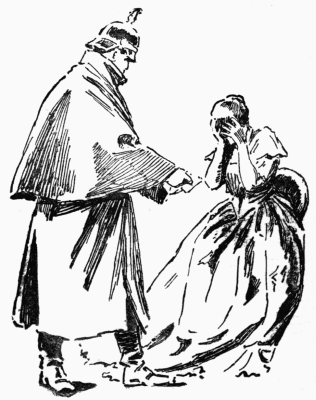
"Come, mademoiselle," I said, changing my tone, "I invite you very seriously to make a clean breast of it. I wish to take no harsh measures with you if I can avoid them. Tell me frankly what news this letter, plainly translated, gives to General Trochu in Paris."
"None," she answered.
"Very well," said I, and I took up the next letter. Ah, M. Armand writes again a week later. It was evidently a good dinner, and M. Armand is properly grateful.
The gratitude, indeed, was rather excessive, rather provincial. It was just the effusion which a young man who had not yet learned self-possession might have written on his first introduction to the highest social life of Paris. Certainly the correspondence was very artfully designed. But what did it hide? I puzzled over the question; I took the words and the dates, and it seemed to me that I began to see light. So much stress was laid upon the dinner, that the word must signify some event of importance. The first letter spoke of a dinner in the future. I imagined that it had not been possible to pass this warning into Paris. The second letter mentioned with gratitude that the dinner had been successful. Well, suppose "dinner" stood for "engagement"! The letter would refer to the sortie from Paris which pushed back our lines and captured Ville Evrart and Maison Blanche. That seemed likely. Madame de Villetaneuse gave the dinner; General Trochu made the sortie. Then "Madame de Villetaneuse" stood for "General Trochu." Who would be Armand? Why, the French people outside Paris—the provincials! I had the explanation of that provincial expression of gratitude. Ah, no doubt it all seems far-fetched now that we sit quietly about this table. But put yourself in the thick of the war and take twenty years off your lives! Suppose yourselves young and green, eager for advancement, and just off your balance from want of sleep, want of food, want of rest, want of everything. There are very few things which would seem far-fetched. It seemed to me that I was deciphering these letters with absolute accuracy. I saw myself promoted to captain, seconded to the staff.
I went on with the letters, hoping to find an[98] explanation there. The third letter was addressed to Mademoiselle de Villetaneuse, who had evidently written to M. Armand on behalf of her mother, inviting him to her box at the opera. M. Armand regretted that he had not been fortunate enough to call at a time when mademoiselle was at home, and would look forward to the pleasure of seeing her at the Opera.
"Mademoiselle," I cried, "what does the Opera stand for?"
Mademoiselle Sophie laughed disdainfully.
"For music, monsieur, for art, for refinement, for many things you do not understand."
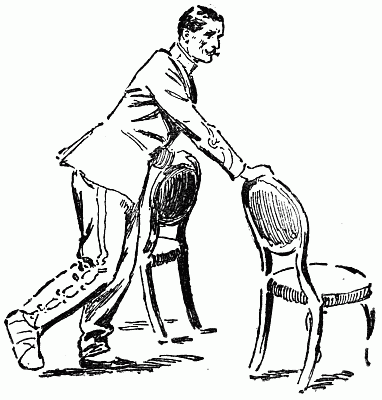
I sprang up in excitement. What did it matter what she said? M. Armand stood for the Army of the Loire. It was that army which had been expected at Ville Evrart. Here was a pledge that it would come to the help of Paris at the next sortie. That was valuable news—it could not but bring recognition to the man who brought evidence of it into the Prussian lines. I hurriedly read through the other letters, quoting a passage here and there, trying to startle Mademoiselle de Villetaneuse into a confession. But she never changed her attitude, she did not answer a word.
Her conduct was the more aggravating, for I began to get lost among these letters. They were all in the same handwriting; they were all signed "Armand," and they seemed to give a picture of the life of a young man in Paris during the two years which preceded the war. They recorded dinner-parties, visits to the theatres, examinations passed, prizes won and lost, receptions, rides in the Bois, and Sunday excursions into the country. All these phrases, these appointments, these meetings, might have particular meanings. But if so, how stupendous a cipher! Besides, how was it that none of these messages had been passed into Paris? Very reluctantly I began to doubt my own conjecture. I read some more letters, and then I suddenly turned back to the earlier ones. I compared them with the later notes. I began to be afraid the correspondence, after all, was genuine, for the tone of the letters changed and changed so gradually, and yet so clearly, that the greatest literary art could hardly have deliberately composed them. I seemed to witness the actual progress of M. Armand, a hobbledehoy from the provinces, losing his awkwardness, acquiring ease and polish in his contact with the refinement of Paris. The last letters had the postmark of Paris, the first that of Auvergne.
They were genuine, then. And they were not love-letters. I looked at Mademoiselle Sophie with an increased perplexity. Why did she now sit rocking her head like a child in pain? Why had she so struggled to hinder me from opening them? They recorded a beginning of acquaintanceship and the growth of that into friendship between a young man and a young girl—nothing more. The friendship might eventually end in marriage, no doubt, if left to itself, but there was not a word of that in the letters. I was still wondering, when the French officer raised himself from his sofa and dragged himself across the room to Mademoiselle Sophie's chair. His left trouser leg had been slit down the side from the knee to the foot and laced lightly so as to make room for a bandage. He supported himself from chair to chair with evident pain, and I could not doubt that his wound was as genuine as the letters.
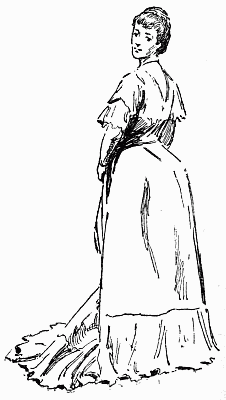
He bent down and gently took her hand away from her face.
"Sophie," he said, "I did not dare to think that you kept this place for me in your thoughts. A little more courage and I should long since have said to you what I say now. I beg your permission to ask Madame de Villetaneuse to-morrow for your hand in marriage."
My house of cards tumbled down in a second. The French officer was M. Armand. With the habit women have of treasuring tokens of the things which have happened, Mademoiselle Sophie had kept all these trifling notes and messages, and had even gathered to them the letters written to her mother, so that the story might be complete. But without M. Armand's knowledge; he was not to know; her pride must guard her secret from him. For she was the lover and he only the friend, and she knew it. Even in the little speech which he had just made, there was just too much formality, just too little sincerity of voice. I understood why she had tried to throw the ebony box down into the hall so that I might open it there—I understood that I had caused her great humiliation. But that was not all there was for me to understand.
In answer to Armand she raised her eyes quietly, and shook her head.
"You wish to spare me shame," she said, "and I thank you very much. But it is because of these letters that you spoke. I must think that. I must always think it."
"No!" he exclaimed.
"But yes," she replied firmly. "If monsieur had not unlocked that box—I don't know—but some day perhaps—oh, not yet, no, not yet—but some day perhaps you might have come of your own accord and[100] said what you have just said. And I should have been very happy. But now you never must. For you see I shall always think that the letters are prompting you."
And M. Armand bowed.
I had taken from her her chance of happiness. The friendship between them might have ended in marriage if left to itself. But I had not left it to itself.
"Mademoiselle," I said, "I am very sorry."
She turned her dark eyes on me.
"Monsieur, I warned you. It is too late to be sorry." And as I stood shuffling awkwardly from one foot to the other, in great remorse as she had foretold, she added, gently, "Will you not go, monsieur?"
I went out of the room, called together my escort, mounted and rode off. It was past midnight now, and the night was clear. But I thought neither of the little beds under the slope of the roof nor of any danger on the road. There might have been a franc-tireur behind every tree. I would never have noticed it until one of them had brought me down. Remorse was heavy upon me. I had behaved without consideration, without chivalry, without any manners at all. I had not been able to distinguish truth when it stared me in the face, or to recognise honesty when it looked out from a young girl's dark eyes. I had behaved, in a word, like the brute six months of war had made of me. I wondered with a vague hope whether after all time might not set matters right between M. Armand and Mademoiselle Sophie. And I wonder now whether it has. But even if I knew that it had, I should always remember that Christmas night of 1870 with acute regret. The only incident, indeed, which I can mention with the slightest satisfaction is this: On the way back to Noisy-le-Grand I came to a point where the road from Chelles crossed the road from Montfermeil. I halted at a little cabin which stood upon a grass-plot within the angle of the roads, and tying up all the money I had on me in a pocket-handkerchief I dropped the handkerchief through a broken window-pane.
The Colonel let the end of his cigar fall upon his plate, and pushed back his chair from the table. "But I see we shall be late for the opera," he said, as he glanced at the clock.
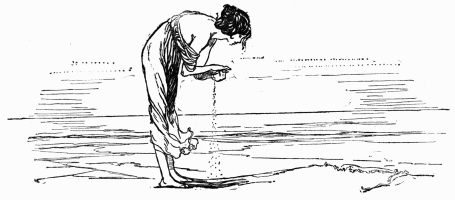
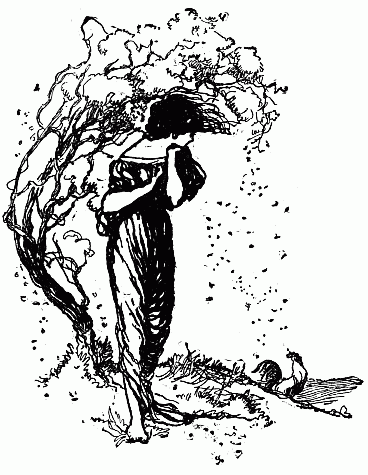
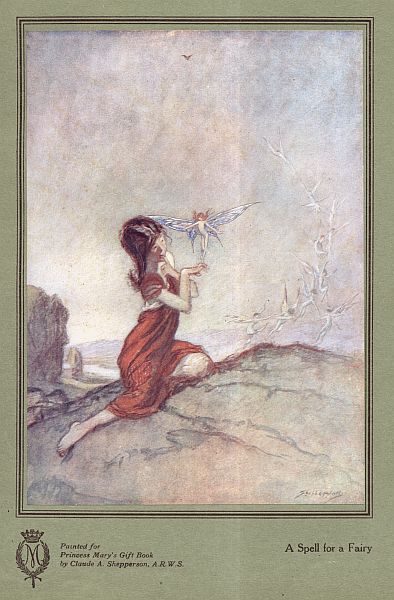
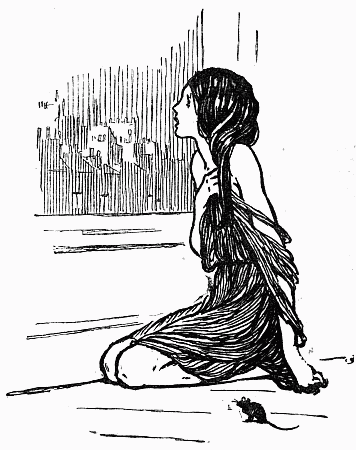
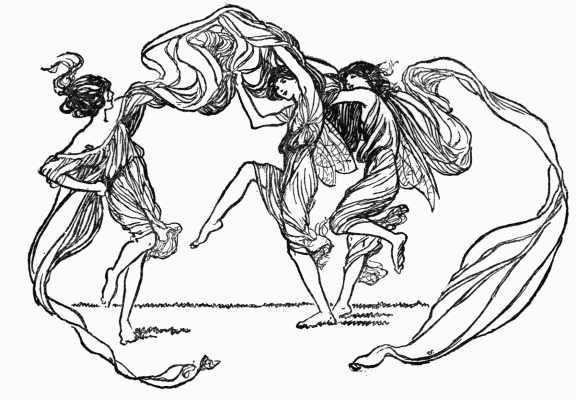
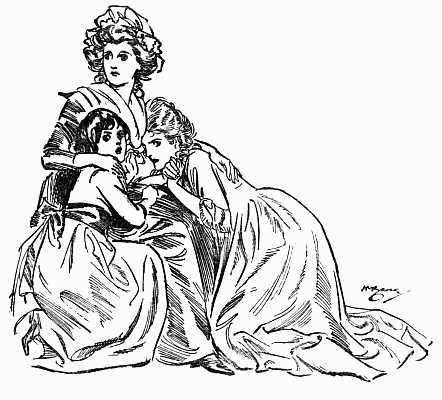
| OUT OF THE JAWS OF DEATHA TALE OF THE SCARLET PIMPERNEL BY BARONESS ORCZY Painting by A. C. MICHAEL and Drawings by H. M. BROCK, R.I. Copyright, 1914, by the Baroness Orczy in the U.S.A. |
Ah! that seems very, very long ago now. No doubt you know better than I do all that happened in our beautiful land of France and in lovely Paris about that time: goods and property confiscated, innocent men, women, and children condemned to death for acts of treason which they had never committed.
It was in August last year that they came to "Mon Repos" and arrested papa, maman, and us four young ones and dragged us to Paris, where we were imprisoned in a narrow and horrible, dank vault in the Abbaye, where all day and night through the humid stone walls we heard cries and sobs and moans from poor people who no doubt were suffering the same sorrows and the same indignities as we were.
I had just passed my nineteenth birthday and Marguerite was only thirteen. Maman was a perfect angel during that terrible time: she kept up our courage and our faith in God in a way that no one else could have done. Every night and morning we knelt round her[106] knee, and papa sat close beside her, and we prayed to God for deliverance from our own afflictions, and for the poor people who were crying and moaning all the day.
But of what went on outside our prison walls we had not an idea, though sometimes poor papa would brave the warder's brutalities and ask him questions of what was happening in Paris every day.
"They are hanging all the aristos to the street-lamps of the city," the man would reply, with a cruel laugh, "and it will be your turn next."
We had been in prison for about a fortnight, then one day—oh! shall I ever forget it?—we heard in the distance a noise like the rumbling of thunder; nearer and nearer it came, and soon the sound became less confused. Cries and shrieks could be heard above that rumbling din, but so weird and menacing did those cries seem, that instinctively—though none of us knew what they meant—we all felt a nameless terror grip our hearts.
Oh! I am not going to attempt the awful task of describing to you all the horrors of that never-to-be-forgotten day. People who to-day cannot speak without a shudder of the September massacres have not the remotest conception of what really happened on that truly awful second day of that month.
We are all at peace and happy now, but whenever my thoughts fly back to that morning, whenever the ears of memory recall those hideous yells of fury and of hate, coupled with the equally horrible cries for pity which pierced through the walls behind which the six of us were crouching, trembling, and praying, whenever I think of it all my heart still beats violently with that same nameless dread which held it in its deathly grip then.
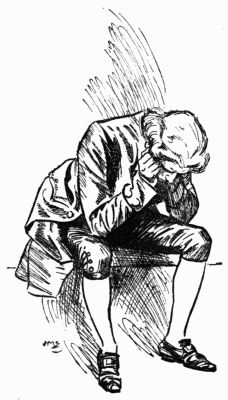
Hundreds of men, women, and children were massacred in the prisons of Paris on that day—it was a St. Bartholomew even more hideous than the last.
Maman was trying in vain to keep our thoughts fixed upon God—papa sat on the stone bench, his elbows resting on his knees, his head buried in his hands, but maman was kneeling on the floor with her dear arms encircling us all, and her trembling lips moving in continuous prayer.
We felt that we were facing death—and what a death!—O, my God!
Suddenly the small grated window—high up in the dank wall—became obscured. I was the first to[107] look up, but the cry of terror which rose from my heart was choked ere it reached my throat.
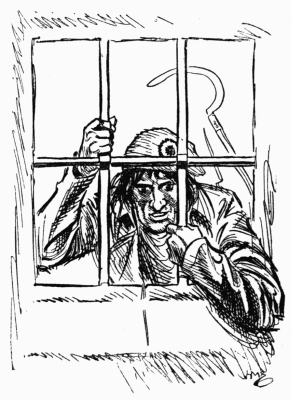
Jean and André looked up too, and they shrieked, and so did Marguerite, and papa jumped up and ran to us and stood suddenly between us and the window like a tiger defending its young.
But we were all of us quite silent now. The children did not even cry, they stared wide-eyed—paralysed with fear.
Only maman continued to pray, and we could hear papa's rapid and stertorous breathing as he watched what was going on in that window above.
Heavy blows were falling against the masonry round the grating, and we could hear the nerve-racking sound of a file working on the iron bars, and farther away below the window those awful yells of human beings transformed by hate and fury into savage beasts.
How long this horrible suspense lasted I cannot now tell you: the next thing I remember clearly is a number of men in horrible ragged clothing pouring into our vault-like prison from the window above; the next moment they rushed at us simultaneously—or so it seemed to me, for I was just then recommending my soul to God, so certain was I that in that same second I would cease to live.
It was all like a dream, for instead of the horrible shriek of satisfied hate which we were all expecting to hear, a whispering voice, commanding and low, struck our ear and dragged us, as it were, from out the abyss of despair into the sudden light of hope.
"If you will trust us," the voice whispered, "and not be afraid, you will be safely out of Paris within an hour."
Papa was the first to realise what was happening: he had never lost his presence of mind, even during the darkest moment of this terrible time, and he said quite calmly and steadily now:
"What must we do?"
"Persuade the little ones not to be afraid, not to cry, to be as still and silent as may be," continued the voice, which I felt must be that of one of God's own angels, so exquisitely kind did it sound to my ear.
"They will be quiet and still without persuasion," said papa; "eh, children?"
And Jean, André, and Marguerite murmured: "Yes!" whilst[108] maman and I drew them closer to us and said everything we could think of to make them still more brave.
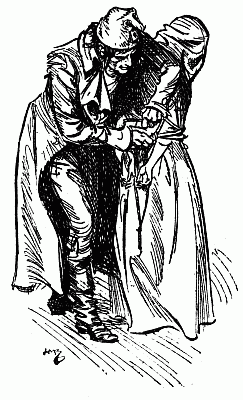
And the whispering, commanding voice went on after awhile:
"Now, will you allow yourselves to be muffled and bound? and after that will you swear that whatever happens, whatever you may see or hear, you will neither move nor speak. Not only your own lives, but those of many brave men will depend upon your fulfilment of this oath."
Papa made no reply, save to raise his hand and eyes up to where God surely was watching over us all. Maman said in her gentle, even voice:
"For myself and my children, I swear to do all that you tell us."
A great feeling of confidence had entered into her heart, just as it had done into mine. We looked at one another and knew that we were both thinking of the same thing: we were thinking of the brave Englishman and his gallant little band of heroes about whom we had heard many wonderful tales of how they had rescued a number of innocent people who were unjustly threatened with the guillotine; and we all knew that the tall figure disguised in horrible rags, who spoke to us with such a gentle yet commanding voice, was the man whom rumour credited with supernatural powers, and who was known by the mysterious name of the Scarlet Pimpernel.
Hardly had we sworn to do his bidding than his friends most unceremoniously threw great pieces of sacking over our heads and then proceeded to tie ropes round our bodies. At least I know that that is what one of them was doing to me, and from one or two whispered words of command which reached my ear I concluded that papa and maman and the children were being dealt with in the same summary way.
I felt hot and stifled under that rough bit of sacking, but I would not have moved or even sighed for worlds. Strangely enough, as soon as my eyes and ears were shut off from the sounds and sights immediately round me, I once more became conscious of the horrible and awful din which was going on not only on the other side of our prison walls, but inside the whole of the Abbaye building and in the street beyond.
Once more I heard those terrible howls of rage and of satisfied hatred uttered by the assassins who were being paid by the Government of our beautiful country to butcher helpless prisoners in their hundreds.
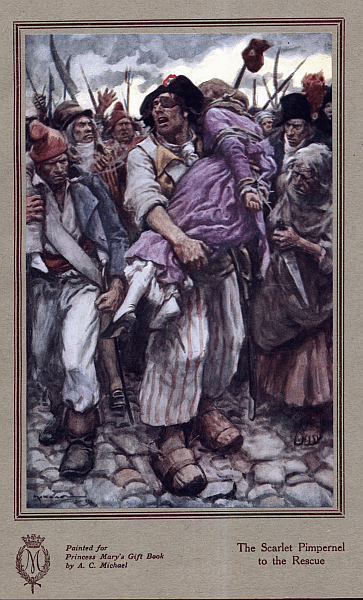
Suddenly I felt myself hoisted up off my feet and slung up on to a pair of shoulders that must have been very powerful indeed, for I am no light weight, and once more I heard the voice, the very sound of which was delight, quite close to my ear this time, giving a brief and comprehensive command:
"All ready—remember your part—en avant!"
Then it added in English; "Here, Tony, you start kicking against the door whilst we begin to shout!"
I loved those few words of English, and hoped that maman had heard them too, for it would confirm her—as it did me—in the happy knowledge that God and a brave man had taken our rescue in hand.
But from that moment we might all have been in the very antechamber of hell. I could hear the violent kicks against the heavy door of our prison, and our brave rescuers seemed suddenly to be transformed into a cageful of wild beasts. Their shouts and yells were as horrible as any that came to us from the outside, and I must say that the gentle, firm voice which I had learnt to love was as execrable as any I could hear.
Apparently the door would not yield, as the blows against it became more and more violent, and presently, from somewhere above my head—the window presumably—there came a rough call and a raucous laugh:
"Why! what in the name of —— is happening here?"
And the voice near me answered back equally roughly:
"A quarry of six—but we are caught in this trap—get the door open for us, citizen—we want to be rid of this booty and go in search for more."
A horrible laugh was the reply from above, and the next instant I heard a terrific crash; the door had at last been burst open either from within or without, I could not tell which, and suddenly all the din, the cries, the groans, the hideous laughter and bibulous songs which had sounded muffled up to now burst upon us with all their hideousness.
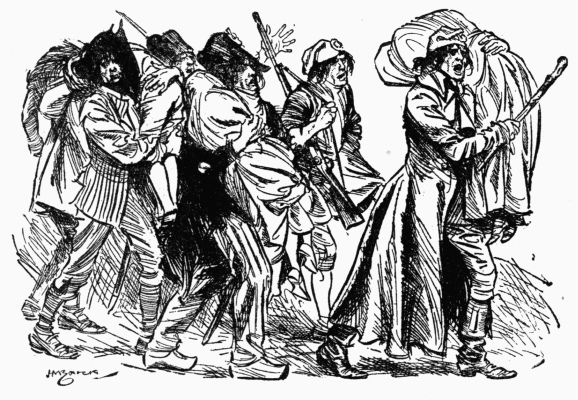
That was, I think, the most awful moment of that truly fearful hour. I could not have moved then, even had I wished or been able to do so, but I knew that between us all and a horrible, yelling, murdering mob there was now nothing—except the hand of God and the heroism of a band of English gentlemen.
Together they gave a cry—as loud, as terrifying as any that were uttered by the butchering crowd in the building, and with a wild rush they seemed to plunge with us right into the thick of the awful mêlée.
At least that is what it all felt like to me, and afterwards I heard from our gallant rescuer himself that that is exactly what he and his friends did. There were eight of them altogether, and we four young ones had each been hoisted on a pair of devoted shoulders, whilst maman and papa were each carried by two men.
I was lying across the finest pair of shoulders in the world, and close to me was beating the bravest heart on God's earth.
Thus burdened, these eight noble English gentlemen charged right through an army of butchering, howling brutes, they themselves howling with the fiercest of them.
All around me I heard weird and terrifying cries:
"What ho, citizens! what have you there?"
"Six aristos!" shouted my hero boldly as he rushed on, forcing his way through the crowd.
"What are you doing with them?" yelled a raucous voice.
"Food for the starving fish in the river," was the ready response. "Stand aside, citizen," he added, with a round curse. "I have my orders from citizen Danton himself about these six aristos. You hinder me at your peril."
He was challenged over and over again in the same way, and so were his friends who were carrying papa and maman and the children, but they were always ready for a reply. With eyes that could not see one could imagine them as hideous, as vengeful, as cruel as the rest of the crowd.
I think that soon I must have fainted from sheer excitement and terror, for I remember nothing more till I felt myself deposited on a hard floor, propped against the wall, and the stifling piece of sacking taken off my head and face.
I looked around me dazed and bewildered; gradually the horrors of the past hour came back to me, and I had to close my eyes again, for I felt sick and giddy with the sheer memory of it all.
But presently I felt stronger and looked around me again. Jean and André were squatting in a corner close by, gazing wide-eyed at the[111] group of men in filthy, ragged clothing who sat round a deal table in the centre of a small, ill-furnished room.
Maman was lying on a horse-hair sofa at the other end of the room, with Marguerite beside her, and papa sat in a low chair by her side holding her hand.
The voice I loved was speaking in its quaint, somewhat drawly cadence:
"You are quite safe now, my dear Monsieur Lemercier," it said. "After Madame and the young people have had a rest some of my friends will find you suitable disguises, and they will escort you out of Paris, as they have some really genuine passports in their possession, which we obtain from time to time through the agency of a personage highly placed in this murdering Government, and with the help of English banknotes. Those passports are not always unchallenged, I must confess," added my hero, with a quaint laugh, "but to-night every one is busy murdering in one part of Paris, so the other parts are comparatively safe."
Then he turned to one of his friends and spoke to him in English:
"You had better see this through, Tony," he said, "with Hastings and Mackenzie. Three of you will be enough: I shall have need of the others."
No one seemed to question his orders. He had spoken and the others made ready to obey. Just then papa spoke up:
"How are we going to thank you, sir?" he asked, speaking broken English, but with his habitual dignity of manner.
"By leaving your welfare in our hands, Monsieur," replied our gallant rescuer quietly.
Papa tried to speak again, but the Englishman put up his hand to stop any further talk.
"There is no time now, Monsieur," he said, with gentle courtesy. "I must leave you, as I have much work yet to do."
"Where are you going, Blakeney?" asked one of the others.
"Back to the Abbaye prison," he said; "there are other women and children to be rescued there!"
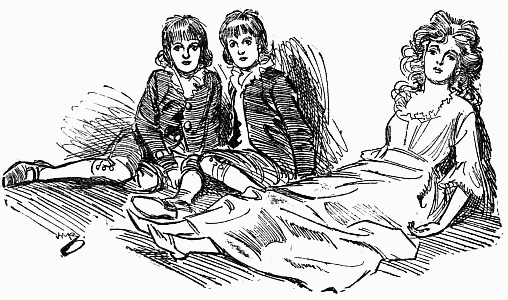
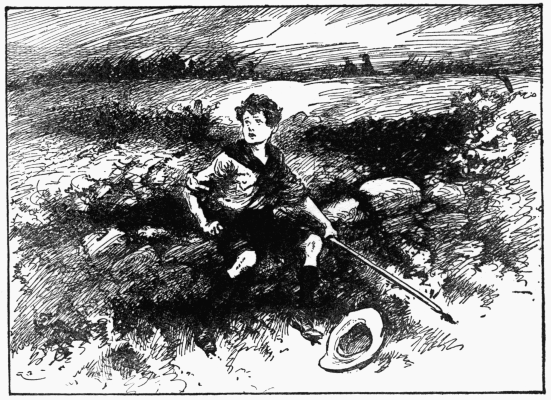
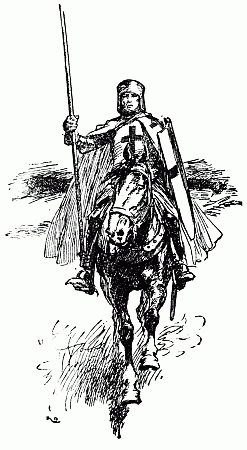
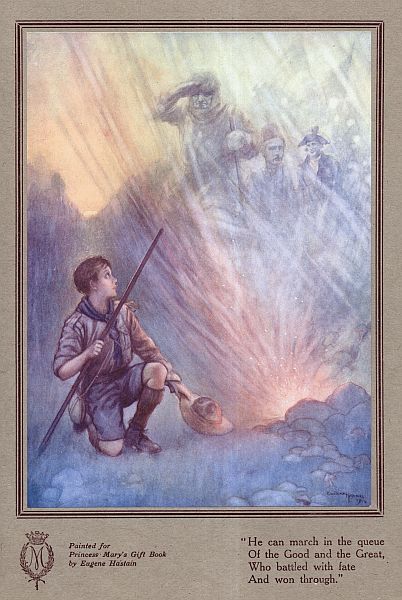
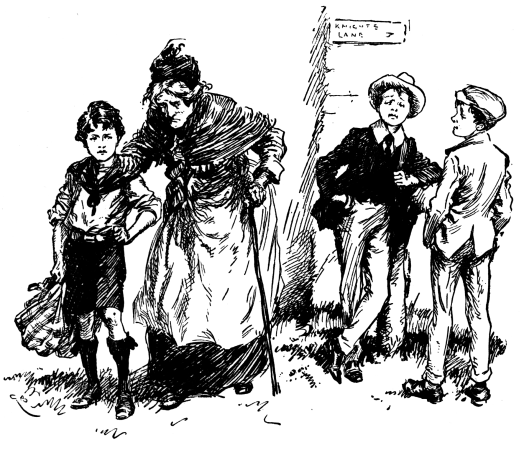
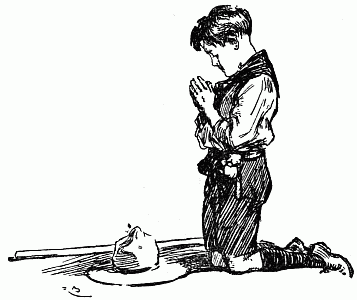
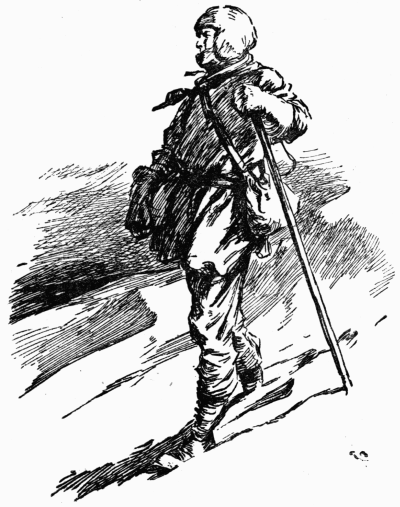
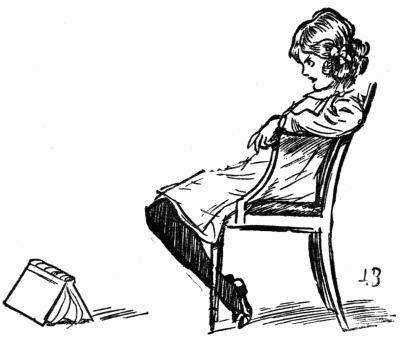
Some friends of mine have a daughter, and she——
Not very many years ago, I remember hearing——
Once upon a time—that is the proper way to begin this story—once upon a time there was a little girl, of about the usual age, who lived near to St. John's Wood Road Station, handy to Lord's cricket ground, and not far from the Zoological Gardens. You would think that any one who, in the summer, could look out of her window and see Mr. P. F. Warner batting, and in the winter was able to go any afternoon she liked, to watch the lions and tigers take high tea at four, ought to have been as happy as the days were long; cheerful even when the days were short. Yet she was not entirely satisfied; it may be said that her one failing was a spirit of discontent. When grown-ups are discontented, it is called ambition; but that is another matter.
On a certain Tuesday evening in November it happened that she felt quite pleased with the world until about seven o'clock. Seven in the evening was the hour that frequently made her peevish.
Nurse left her alone for a minute to see if everything was ready upstairs, and in that minute the little girl jumped on a chair and moved back the long hand. She was reading her picture-book with great interest when nurse returned.
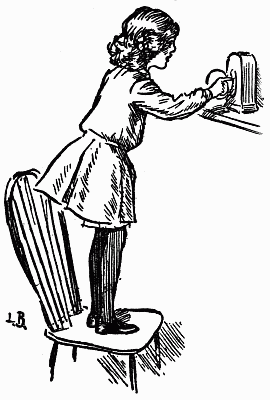
"Bless my soul!" cried nurse. "Quite thought it wanted ten to seven, and here it is only ten past six. I shall find myself in Colney Hatch before I'm much older."
The little girl wanted to assure Nanna there was no good reason to assume that mental decay had set in, but she did not do this at once, and afterwards it seemed too late. So nurse was allowed to chat on, and tell her very best story about the time when she was a child, and a good one at that, and when the clock, having been compelled to go over the ground twice, again gave the time as ten to seven, nurse said,
"Now my dearie!"
Upstairs, the little girl devoted a few minutes to instructing her dolly in the art of going off nicely to bye-byes.
She was left alone, with just a mere star of gas-light for company shining above the dressing-table, and at the moment when she was about to go to sleep conscience woke up. Conscience became wide-awake. Conscience insisted upon talking, and the little girl had to listen. She was aware it is useless to cry when one is by oneself with nobody looking on; not only useless but wasteful, because you may want those tears on more important and more public occasions. So the little girl did not weep, but, oh! she felt troubled. She did feel troubled.
"A silly, stupid world!" she cried aloud. "It ought—it ought to be changed. I'd very much love it to be altogether different."
A knock at her door, and she answered, "Please come in, Nanna!" Not nurse. Certainly the tall lady with diamonds sparkling in her hair, and a white chiffon kind of costume, and a long silver stick in the right hand, was as unlike nurse as any one could be. The little girl said, "Oh, I beg pardon!" in her politest manner.
"It is for me to beg yours," answered the tall lady with severity. "I am exceedingly sorry to disturb you."
"Pray don't mention it."
"I wish to mention it," insisted the lady. "I claim the right to mention it. I decline to allow any one to dictate to me what I shall or what I shall not mention. I am a good fairy."
The little girl opened her mouth with surprise.
"A good fairy, and I am here to do you a favour. When a good fairy wishes to do a favour, it is only necessary for a wish to be expressed, and——"
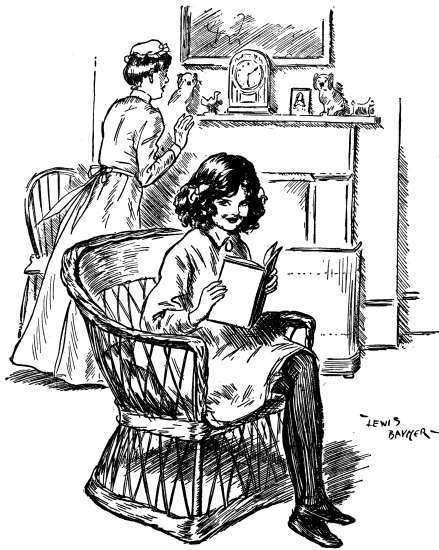 "Bless my soul!" cried nurse
"Bless my soul!" cried nurse
"Thank you," said the child nervously, "but really I would so much rather you did not take the trouble."
"The trouble," replied the good fairy, striking the floor with her silver stick in an impatient way, "is no concern of yours. You mustn't haggle."
"I don't know what that means," declared the other earnestly, "and if I did, I wouldn't do it, ma'am, I wouldn't really. Good evening, and, of course, thank you ever so much for calling."
"Dress!" ordered the good fairy.
On the instant something happened which the little girl had often thought about; more than once she had talked it over with nurse. She found herself, in the space of less time than it takes to click your finger and thumb, fully and completely costumed, boots laced up, hair taken out of curlers and properly brushed, hat set at the correct angle, parasol in hand, gloves buttoned, and everything ready for a walk out of doors. She gave a cry of delight and astonishment.
"I am about to give you the great treat of your life," said the fairy, "something that no one has ever yet experienced, something that will give you a subject to talk about for the rest of your days. Nobody will believe you, but that must be endured. You are about to see the world as nobody else has seen it. And if you ask me why you have been selected for this high and special honour——"
"Please, I don't!"
"My answer is," taking no notice of the interruption, "that you are receiving the award for your wonderful discovery."
"But I have discovered nothing."
"Nothing!" echoed the lady, with amazement. "You call it nothing to have found out the secret that has puzzled clever people for thousands and thousands of years? How often folk have said, 'If only I could live some part of my life over again!' and they never have been able to do it. You, child, were the first."
The staircase had always gone straight down until it neared the next landing, where it took a slight curve; now it was all curves and had nothing about it that could be called straight. It went up, it went down, it went to the left, it went to the right, so that wherever you put your foot expecting to find a step, you did not find it, and wherever you put your foot expecting to find nothing, you hurt your toes.
"This is very strange, ma'am!"
"That," replied the other, "should be its great attraction. Don't lag. We shall get to the end of the staircase in less than ten minutes."
Going out of the street doorway proved one of the most difficult[119] tasks. The fairy did not seem to mind, but the child found it extremely odd that when you pulled at the door it opened outwards, and that when you pushed at it it came in. The iron gate which led to the pavement had another form of behaviour. Determined not to be bothered here, she gave a touch with her boot, and instantly the iron gate offered her boot a pinch; she placed her hand upon it and the gate gripped it, much in the way that Uncle Henry did when he said "How do you do?" She put her back against it, and the iron gate gave her a clutch around the waist, and said, in rasping tones, as it waltzed to the pavement,
"Do you reverse?"
It was then that she perceived the fairy had left her.
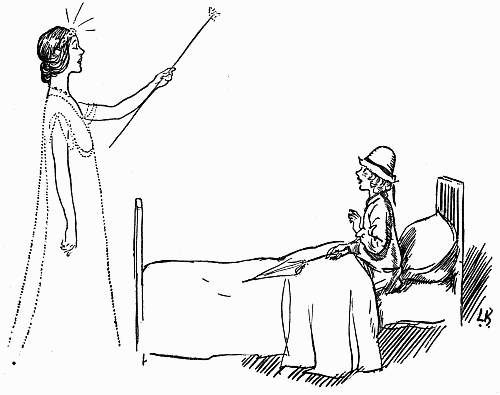
A pavement is expected to behave in a calm and demure manner; even when it takes you up-hill it does this in the gentlest way. But this pavement, so soon as the little girl set foot upon it, at once changed to something like a switchback, and a switchback, mark you, she enjoyed when seated on a trolley at Shepherd's Bush Exhibitions; it was less agreeable to try to walk up and down the uneven parts here. Other people did not seem to experience her difficulties, and this she failed to understand until she observed that they went along on their hands and toes, pretending to have four legs; she tried the same method and found it made her back ache; discovered, too,[120] that she could not see so much as when walking in the old way. Thus it was that she had reached the end of the road, where a steep ascent occurred that was like the side of a mountain, ere she noticed something strange and peculiar about the houses.
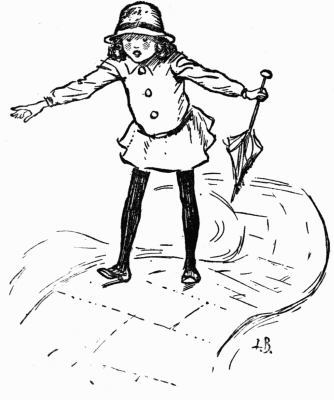
"How very foolish of them to build in that way!" she cried. "They must be out of their senses."
It was the more eccentric in that her own house so far as she had observed had not changed; thinking it over, though, she could not be quite sure. Here at any rate was every house upside down with the front door right away at the top, Virginia creepers growing downwards; at one house the painters were seeing to the front and their ladders came from the roof (which was the basement) nearly to the basement (which was the roof). A neat lawn hung out over the top of each house; it made her feel giddy to think of the risks of playing croquet there; she could not see how one would be able to make even the first hoop.
Other things claimed her attention.
There were carts with horses pushing them—she had often heard her father reprove her eldest brother for doing this in argument—the horses stood upright and wore silk hats in a rakish sort of way, sometimes lifting these on meeting another horse and taking cigars out of mouths. She spoke to a constable, who wore a helmet on each hand, and put an urgent inquiry.
"Miaow!" said the policeman.
"You didn't quite understand," remarked the little girl patiently. "I asked you if you would kindly tell me the way to get home to Wellington Road."
"Ba, ba!"
"Do please listen to me," she begged, "and tell me what I want to know. I think I've lost my way, and I'm so afraid that I'm going to cry."
"Moo—oo!" said the constable.
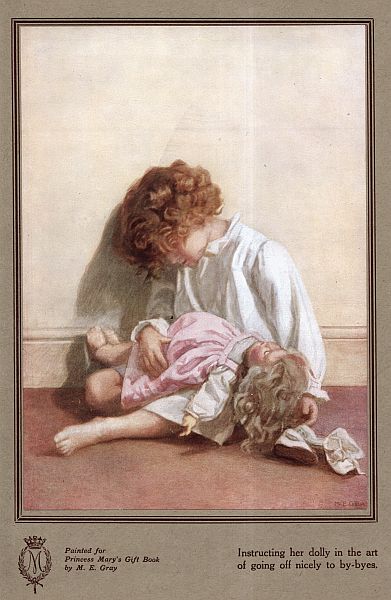
"Please, please," she cried, "please don't be silly. Why do you keep making noises like that instead of giving me a proper answer?"
"Missy," he explained, "I'm a comic policeman. I'm not here to tell folk the way or to lock them up, or anything of that kind; I'm here to make people laugh."
"You are not amusing me!"
"Not when I make a noise like a dog?" he asked, with surprise. "Why, that nearly always sends people into a good temper. You wait till I give you my imitation of a railway engine. Hark!"
He set his teeth together and began to say "Isha—isha—isha," but the little girl turned away. She felt so indignant that she determined to tell her father about it at the very first opportunity, and see whether something could not be done. More than once her father had helped to straighten out tangled matters by simply writing a letter to the newspapers, and signing himself "An Indignant Ratepayer."
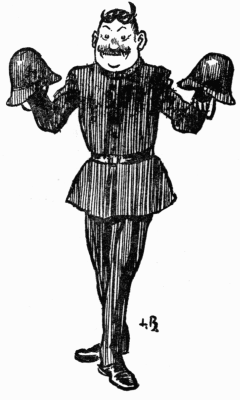
And at the very moment along came her father. He, too, walked on all fours as other people did, and the little girl thought it caused him to look particularly undignified, but she did not trouble about this, for, stout as he was, she was really glad to see him.
"How do you do," he said respectfully. "Can you give me a penny to buy some sweeties?"
"Daddie, dear!" she cried with distress. "Don't you begin to be funny, please."
"I'm not," he said.
"But you are my parent, you know."
"Yes," he sighed, "I'm aware of that. But under the new rules—you must have heard all about them—under the new rules parents have to be obedient to their children, and do everything their children tell them to do."
"Not a bad idea," decided the little girl, after giving it consideration. "I think if you don't mind I will get you to come along now to Finchley Road and buy for me the mechanical rocking-horse that has been talked about for some time."
"Under the old arrangement," he replied readily, "I should have been only too pleased, but the new rules say that children must buy presents for their father and mother."
"How can we," getting rather cross, "how in the world can we when we have no money?"
"I think," he said, "that it is expected you should go to work and earn some."
"Never heard such nonsense in the whole course of my life," she declared, using a grown-up remark. "It's perfect rubbish. Do you mean to say that I shall have to go to concerts and sing as mamma does?"
"That's the idea, I believe."
"But I can't sing. I can't sing nearly well enough to earn money."
"Well," said her father, after considering the matter, "what about going out as charwoman? You'd get two shillings a day and your lunch."
She stood there for a few minutes, not daring to speak, and overcome with cares and responsibilities. Some one touched her on the shoulder, and she looked up.
"Good fairy!" she cried.
"Do you like the altogether different you asked for?"
"No," she answered, "I don't like it at all. I wish now I hadn't put back the hands of the clock."
"You mean to say that that was how you did it? You dare to tell me it was nothing cleverer than that? Now, just to punish you," said the fairy, speaking with stern decision, "I shall send you away to the old sort of world, and you'll simply have to make the best of it."
The bedroom door opened, and nurse came in. The little girl, snuggling down into her warm, comfortable bed, kept her eyes shut.
"Bless her!" said nurse to herself. "Sleeping as sound as a top. That's what comes of having nothing on your mind to worry you!"
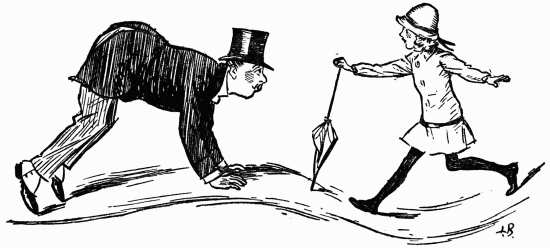
THE ESCAPEA GIRL'S STORY FROM GALLANT BELGIUM
BY ANNIE S. SWAN Drawings by HAROLD EARNSHAW | 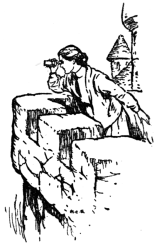
|
The old courtyard, with its tiled pavement, its cool fountain, and its cooing doves, the dog asleep in the sunshine, made a picture of perfect peace.
The house, once the Château of a great family that had fallen on evil days, was grey and old, and beautiful still, though now merely une pension de demoiselles.
It was August, when, as a rule, all the merry throng had scattered from the Château to their respective homes, leaving it to its former dignity and quiet. Mademoiselle usually went to England, perhaps seeking fresh pupils, or to enjoy the sea breezes on the Normandy coast.
La Royat, in the village of Coutane, was inland from the sea, about fifteen miles from Brussels. It was a sweet spot, beloved of the understanding traveller, and many came to look at the fine old church, whose spire and windows were among the treasures known to lovers of the beautiful all over the world. Mademoiselle Ledru had nothing to complain of in her lot, with which she had been hitherto content. Success had flowed in upon her earnest efforts, though looking at her anxious face that summer morning one would have thought her oppressed by care. She was an elderly woman now, with the remains of beauty still on her face. The place where she stood that morning, before her household was astir, was certainly unusual, being the square tower of the Château, from whose low ramparts she was sweeping the horizon with a powerful glass. It was all very peaceful and beautiful, a wide rolling plateau, with fields white to harvest, not a hint of approaching desolation on its smiling face.
It was very early, hardly an hour past daybreak, but already some of the thrifty peasants were busy in the fields. Far away on the red horizon there was a slight haze, regarding which Mademoiselle seemed more than a little curious. Again and again she focused her glass, until confident that the haze was not altogether stationary, but moved and[124] broke and thickened again. Then with a sickening apprehension at her heart, she turned and fled down the stairs and went to open the big door of the Château. Jules, the fat and sleepy porter, was undoing the bolts as she got down.
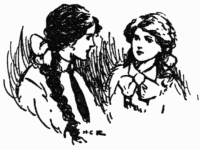
"Bonjour, Mademoiselle. Some one is at the gate, an early visitor." He chuckled as he undid the last bolt, and threw wide the door. When he would have hobbled across the courtyard to open the gate his mistress was before him. When she undid the bolts the Curé, bareheaded, stood before her.
"Ah, Mademoiselle, it is bad news," he said in a firm voice, though his face was tense with apprehension. "They come, the barbarians. I have information, now it behoves us to consult what we will do."
Mademoiselle whitened to the lips, and drew him in and shut the door. She signed to Jules to depart, but the Curé intervened.
"Let him stay. It will save a twice-told tale. I have certain news that they are not more than a couple of hours' march away, and for sure they will come this way to Brussels. What shall we do?"
"I will remain at my post," answered Julie Ledru firmly. "I have no fear for myself, but my charges, Father—Rosalie and Biddy, with whom their English parents have trusted me. My spirit fails! What must we do with them?"
"It will not be safe to leave them here, Mademoiselle, nor even for you to stay. We will take you to the crypt of the church, where, with a little food and drink, you will be safe until they have passed through. We have no treasure here in Coutane, and are simple folk. Perhaps we shall be beneath their notice."
Julie Ledru clasped her hands in an ecstasy of apprehension. They had been without newspapers for four days, but chance travellers from the East had brought strange and appalling tales of the invaders' desolating march. They told of ruined villages and burning homes, and helpless people mercilessly shot down in places as simple and as unimportant as Coutane. Julie Ledru looked round her little domain with a kind of sad pride. It did not contain many treasures, it is true, but it was her home, enshrined by many sweet memories. It contained her all.
"Now, Father?" she asked feverishly. "Do you think we should come now?"
"Without a moment's delay," he answered. "Go and get your charges roused and bring all with you; a little food also in a basket, lest you have to stop there several days."
"You will be with us, Father?" said Julie anxiously.
He shook his head.
"My place is in the open street with such of my people as feel strong and brave in their innocence and faith. But you have English charges. If it was known, Mademoiselle, believe me, nothing would save them or you. Their fury against the English is so great."
"Shall we take Jules? Besides him, there is only our faithful Babette."
Before the Curé could reply Jules intervened, scratching his old grey head.
"I hide not from them, Mademoiselle; I will stay and guard the Château and keep them out, if I can, barbarians that they are, making war on women and children."
"They will shoot you, Jules, if you are so foolish," his mistress reminded him. His answer was a shrug of the shoulders.
"A man dies but once—that is to say, a good man, who has faith in God and does his duty."
So saying, Jules went back to take up his waiting duty.
The Curé departed the way he had come, and Julie Ledru, with a feeling of strange calm upon her, hurried indoors to make her few simple preparations. Babette, the elderly servant, one of the best of the old Brabant type, was cool and ready for any emergency, and in an incredibly short time they had packed some food and a few necessaries in two considerable baskets. Then Mademoiselle Ledru essayed the task she dreaded—that of awaking her two young charges, and preparing them for the ordeal through which they had to pass.
They were still asleep, in two beds side by side, in one of the pleasantest rooms of the Château. Rosalie Bentham, fair and rosy, like an English flower, her golden hair lying on her pillow like an aureole, and Biddy Connaught, the dark-eyed Irish girl, whose long black lashes swept her cheek, while her dimpled chin was in her open palm, as she smiled over some passing imagery of her dream. Something caught Julie Ledru's throat as she regarded these two pictures of innocence and beauty, and reflected on the greatness of her charge. Both were only children, entrusted to her care in the holidays, because their parents, both in the exercise of duty, could not take them home. But with a strong effort she controlled herself and awakened them gently. It was a process of some length, because the sleep of youth is sound and deep, but at last they were sitting up, drinking in her news.
"We have to run away and hide in the crypt until the Germans have marched through the village. Do you hear, Biddy?" called[126] Rosalie, as she sprang from her bed and began to get into her clothes. "But how ripping! What lots we shall all have to write about and to tell them when we get home!"
Julie Ledru faintly, tremulously, smiled, and with her own hands she assisted them to make a hasty toilet. Some coffee was ready for them downstairs, for Babette was a methodical person, not easily upset. Thus fortified, they left the Château presently, leaving Babette and Jules in charge. Babette made the same excuse—some one must stay to guard the place, and surely when they found nobody but two simple old servants they would pass on.
Julie had no time to argue; perhaps even she did not fully realise the peril to which these two faithful souls thus willingly exposed themselves. She looked back on their serene faces as she passed through the gate, and it was the last time she was to look on them in life. She never saw them again, nor found them. They disappeared in the ruins of La Royat as many had disappeared in other ruins, leaving no trace behind. At the church, which was but a few paces off, they found the Curé busy arranging shelter. It was a very tiny village, and the number of those willing to accept the shelter he offered and, indeed, advised was comparatively few. For though a simple they were a brave people, nor could they conceive of a wickedness and barbarity that would seek to destroy innocent souls who had naught to do with war. So they went about their ordinary avocations as usual, a trifle more apprehensively perhaps, but none the less bravely, and the morning wore on.
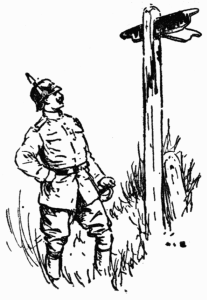
The Curé took his charges, about twenty souls in all, down the narrow stairs to the crypt, where he had already provided light and such small comforts as he could spare from his own store.
"Isn't it ripping, Biddy?" asked Rosalie, but perhaps her young voice had lost a little of its gallant ring. But Biddy, who had the imaginative temperament of her race, shivered a little, and burst into tears. It was strange and ominous to come in out of the warm, hopeful sunshine to this place of tombs, an adventure with which the child could very well have dispensed. The church was very old, and many who had been born in Coutane had never seen the crypt. Its very existence was unknown to a large number, and the entrance to it was so cunningly arranged, and so difficult of access, that it was of all hiding-places in the village the most secure.
Then there was always the belief, founded on all precedent of war, that the sacred things would be respected, and sanctuary in God's house left undesecrated.[127] The hours seemed long down there and the stillness profound. Not a sound from the upper air penetrated to that strange hiding-place. Though sure of their sanctuary, it seemed natural to lower their voices, to move softly, and even to watch apprehensively. Even the two girls, usually so high-spirited, found themselves naturally becoming quiet. It was only the very little children, of whom there were five, who, unconscious of danger, crowed and laughed and babbled in their usual glee. These little ones provided incessant interest and occupation for the two girls, and Julie Ledru smiled as she watched their pretty efforts to amuse and keep them quiet. She had brought her watch, and it pointed to nine o'clock at the moment when they heard a dull thud several times repeated, which caused them all to start and look at one another in quick alarm.
"It is the guns," said old Monsieur Rollin, whose legs were twisted with rheumatism, so that they had half-carried him down the steps of the crypt. "They have come, and are starting their fiendish work."
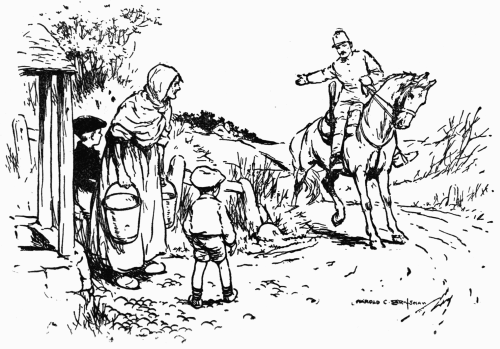
No one could gainsay him, and for the next half-hour they had to listen to a repetition of the same sound gradually getting nearer and nearer. Presently their terror was increased by the deafening roar of artillery much nearer and the sound of falling masonry, indicating that the church itself, cradle and sanctuary of the life of Coutane for centuries, had not been respected. The two English girls, now thoroughly frightened, clung together fearfully, and the whole little company, some of them on their knees, did not exchange a word. After a time the firing ceased, and they were left to absolute stillness. But[128] none of them moved, or offered to go up to discover what had actually happened in the village.
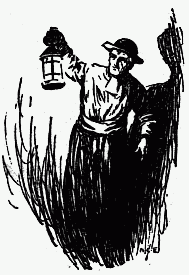
After what seemed an interminable interval—in reality it was not more than a couple of hours from the moment the din ceased overhead—the door of the crypt was cautiously opened, and the Curé looked in. He was all dishevelled, his face blackened with smoke, and his whole appearance that of a man who had seen some terrible and haunting vision.
"Ah, there you are, my children," he cried as they crowded round him; "I think you may come up presently, but be prepared to have your hearts broken. A regiment of the enemy has passed through, and left nothing behind. Mademoiselle, the Château is in flames, and the beautiful spire of the church has been blown to pieces, and at the Mairie the devastation is complete. But, above all, we mourn the death of so many helpless people—I myself escaped by a miracle."
"Have they gone?" asked Mademoiselle, with a shivering breath.
"They have, and I think that they are pursued, and that this was the hurried work of destruction prompted by hatred and revenge. Will you come up now and see for yourselves, or remain here in safety through the night? Alas! you will find no other refuge, Mademoiselle, for your home is in ruins."
Such fear was upon them that with one accord they determined to remain in the crypt until the dawn of another day.
Even the natural gaiety and high spirits of youth were not proof against the terror which all felt might swoop down upon them again at any moment.
They had arranged themselves as comfortably as possible to pass the night, when they were suddenly disturbed by the grating of a door and the swinging of a lantern. All scrambled to their feet, some of them shrieking and hiding their eyes, certain that there had been a fresh arrival of the invaders, and that instant death would meet them.
But once more the Curé smiled upon them reassuringly.
"Courage, my children! Our trouble is for the moment at an end. Our own brave soldiers have arrived. It is as I said—they are in pursuit, but part of them will camp here to-night. Alas! we have little or no food to offer them, for the barbarians stripped the village of everything."
Then Julie Ledru, hurriedly throwing on her cloak, said she would ascend with the Curé and give what stores she could from the Château.
"But it is no more, my daughter. You have forgotten how I told you yesterday that they have burned it to the ground."
"But my stores are hidden in the grotto in the garden, and there is a secret passage to it. I think, Father, they had not time, or did not take it, to explore, and we shall find things there. I have been putting them away since the war began."
So in the pearly dawn, a strange sight was to be seen in the trampled, desecrated garden of the Château behind its smoking ruins.
Led by Julie Ledru, the Commandant of the troops that had halted in the village found stores sufficient to help assuage the hunger of his men. He was profuse in his thanks.
"What can I do for you in exchange, Mademoiselle?" he asked, as he stood at the salute. Instantly Mademoiselle pointed to her charges, who, still shivering a little with fear, yet profoundly, poignantly interested in the extraordinary scene of desolation, in what but a few hours ago was one of the fairest spots in Belgium.
"These are my English children. Get them to their parents, Monsieur le Capitaine, and I shall be amply repaid."
The officer shook his head.
"Easier said than done, Madame; but leave it, and I will see what can be done. How is it you have been so indiscreet as to remain here? You ought to have removed yourself, and them, while there was still time."
Mademoiselle shook her head.
"We imagined we were of no account, and we have had no news for several days. We were assured that the tide of battle had flowed in a different direction."
"It is everywhere, Mademoiselle—an evil flood, rolling over the whole of our country. But, look you, I will see what can be done."
He was as good as his word, and that evening after dark, in an armoured motor-car, Julie Ledru and her charges were driven for hours and miles by tortuous ways which kept them out of danger, until they reached Ghent, where it was still possible to get a train for Ostend.
Two days later, she landed in England with Rose and Biddy, herself utterly ruined, her home gone, one of the most pitiful of the refugees.
But she was welcomed warmly and gratefully by Biddy's father, and in a few days' time was safe in a warm, comfortable home on the Irish coast, where Rose, too, was made welcome, until her own relatives in India could be communicated with.
It was an experience the two girls would never forget, one which will remain with them through life as a very poignant personal experience of the Great War.
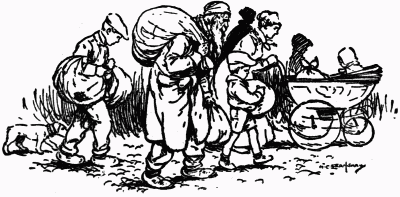
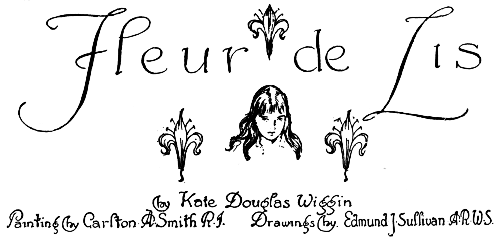
Fleur-de-lis had first opened her eyes in a very humble chamber, but it was large enough to hold a deal of sweet content, which grew all the sweeter when she came to share it. There were only two rooms for father, mother, and child, and these were in a dreary tenement house, for Pierre Dupont, a stranger in a strange land, was having a desperate struggle with poverty. On being discharged from the hospital, where he had passed through the dangerous illness that left him a maimed and broken man, he had to begin the world all over again, and begin it single-handed, in very truth. There were few things to which he could turn his one hand; one of them was the crank of a street-piano, and in a modest example of that modern instrument of torture he accordingly invested the last of his savings. He was much too good for it, but by regarding it distinctly as a hated object which should be discarded the moment something better appeared, he mastered his aversion, and, by wheeling it through the streets from morning till night, he managed to live, for there were always people who wanted to hear it, and others who did not, so that between the two classes he scraped together enough for his frugal needs.
Marie was young and pretty and loyal, and when affairs were most desperate she offered to take the baby Fleur-de-lis and accompany her husband, gathering the pennies in a tambourine, while he ground so-called music from the piano with the left arm, that grew so weary in the monotonous service. But there was not a trace of the mountebank in Pierre Dupont, nor a drop of beggar's blood in his veins. He was poor and crippled, but he had still the self-respecting pride of the peasant whose people had served noble families, and who know what true nobility is. He could injure the dead-and-gone Rastignacs, if he must, by trundling about a second-hand street-piano, but he could at least spare them the insult of adding a monkey or a woman to the procession. So Maman Marie, loving him more than ever for his chivalrous regard of her, took up an almost forgotten pastime of her girlhood, and fell to making artificial flowers, which she sold to an old woman who stood on the street corners and offered them to the passers-by.
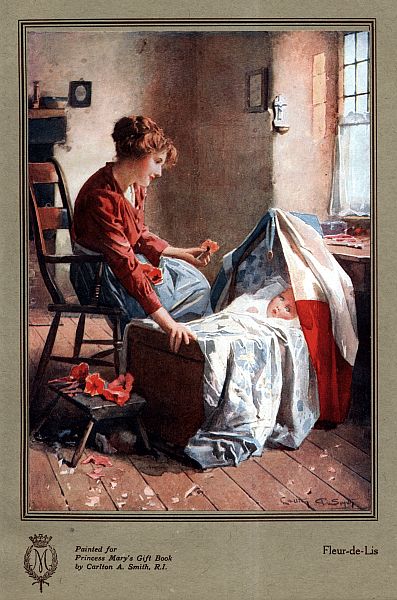
The two rooms in the tenement house were as neat as care and thrift could make them. The windows opened only into the court, it is true, but Pierre and Marie did not need to look out of doors to get a pleasant view, for they could look at each other, and at the baby; besides, the glass was spotlessly clean and hung with equally spotless curtains. The floors were uncarpeted, but there was never a speck of dust on them. The little kitchen where Marie worked had a not unappetising fragrance from the pot-au-feu that simmered on the stove; it had also a gleam of sunshine in it for a few hours each day. Sometimes when Pierre left his incubus for half an hour and ran home for a mouthful of bread and soup, he looked at Maman Marie sitting by her table in the sunshine, her scissors gleaming among the paper-flower petals, and at Fleur-de-lis, sitting at her feet playing with the rainbow-coloured scraps, and then he fell on his knees beside them, and, putting his arm about them both, forgot that it was the only one he had, forgot that he was poor and crippled, and that the future was all uncertain, remembering only that he had home and wife and child, and that life, with all its hardships, was inexpressibly dear to him. For it happens, sometimes, that a poet's soul is lodged in a very humble tenement, and a love that would do honour to a knight blossoms and flourishes in the midst of mean and pitiful surroundings.

Fleur-de-lis's cradle had curtains made of a bit of tricolour, and from the centre of the canopy there hung a medal of the Virgin swinging on a narrow ribbon of blue. The cradle itself was a wooden box, and Marie, with a maternal ingenuity that surmounted the lack of ordinary[132] materials, had lined the inside of the hood with tissue-paper flowers; white and blue fleurs-de-lis to match those on the faded satin coverlet, a fragment of ancient grandeur where the Rastignac coat-of-arms was intertwined with the Bourbon lilies of France. And when the baby's vagrant gaze wandered to the flowery heaven above her head, and her pink fingers reached to touch it and to stroke the soft counterpane, Maman Marie would tell her the name of the posies; and so after a time, when she discovered that people and things possessed names, Marie Hortense Amélie, Mademoiselle Bébé, elected to call herself Fleur-de-lis. It was the first word she lisped, and she attached it to herself with the utmost complacency. It was appropriate enough, for she looked as if she might have been originally intended for a flower, and then somehow a soul had strayed into the flower, and it had fluttered down to earth as a child—a curious blossom to come from lowly stock, a kind of tender and beautiful miracle wrought out of common clay by the fashioning and refining power of love. At times, when Marie sat at her work and looked at Fleur-de-lis cooing and smiling under her tri-coloured curtains, she forgot the strange land outside the windows, and the Babel of strange tongues in the crowded tenement, and as her deft, brown fingers shaped the tissue flowers, she saw in fancy the poppies and the wheat and the lilies of her native Breton fields. She saw the sun shining on the old château, her mother hanging a chaplet on the baron's tomb in the little oratory, the aged baroness walking sadly in the pleasance. All, all were gone. The château was dismantled. The proud old family, rooted for centuries to the soil of Brittany, had gradually lost its land and its riches, till now there was only one frail old dame, poor and childless, to maintain the ancient title. All these memories, half sad, half sweet, flitted in and out of Marie's mind as she snipped and trimmed and twisted and shaped, her head on one side to view the result, like a little brown pheasant regarding a berry; and if Fleur-de-lis slept, she hummed a Breton lullaby as she twined her paper nosegays. What wonder, then, that there was a French air about them that attracted purchasers?

So "hope clad in April green" made life worth living for father and mother; and, as for Fleur-de-lis, she was a child; and she had love, and that was enough, and it is sad when we grow so old that it does not suffice for us. But these days, so full of care and anxiety, of weariness and self-denial tinged with happiness, came to an end; for when Fleur-de-lis was two years old, Maman Marie, young and strong, passionately in love with life, desperately needed by husband and child,[133] had to leave them, to journey on alone to another far country, having just grown wonted to this.
Then the light went out of the two little rooms that had been home; indeed, it seemed to go out of the world altogether. Hard times and yet harder ones descended upon poor Pierre Dupont. Marie's earnings no longer helped to swell the slender income, and there were no willing woman's hands to cut and plan and save, to contrive and embellish. Added to this, the piano suddenly grew uncertain, and subject to grave musical lapses, attacks of aphasia in the middle of some tunes, and of asthma in the middle of others; so that the hoot of the stony-hearted bystander and the ruffianly small boy became familiar to Pierre's ears; for he could not afford to buy new cylinders to fit into the old instrument, and to keep it up to the demands of the street, which is always delighted if you "cannot sing the old songs," and wishes the latest melody to the exclusion of everything else.
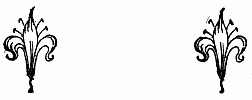
Fleur-de-lis had been left in the care of a woman for many weeks after Marie's death, but the sight of her tear-stained face at night, the tender frenzy with which she lifted her arms to her father when he came in, the sob of joy with which she buried her head in his coat, the sigh of content with which she stroked his cheek between every mouthful of bread and milk as she sat on his knee eating her meagre supper—all this was too much for his loving heart. He had a small sum of money that he had been hoarding to attach "Annie Rooney" and "Comrades" to his unfashionable instrument, that he might appease the public by the gratification of its darling wishes, and withdraw the Boulanger march from its sated ears. This money he took and went to a carpenter's shop in the neighbourhood. After many explanations in his broken English, and many diagrams rudely drawn on paper, the carpenter succeeded in building a primitive sort of baby-carriage on one end of the street-piano. It had two wheels of its own, and moved somewhat in harmony with the ancient instrument, which had its difficulties of locomotion nowadays, as well as its musical weaknesses. It had a drawer in which Fleur-de-lis's playthings were kept—a battered doll, and boxes of her favourite scraps of bright tissue-paper, the top of an old cotton umbrella, and a square of rubber cloth like that which covered the piano when it rained. Here Fleur-de-lis sat for many hours each day, happy and content. Pierre would often take her out, and let her toddle by his side until she was tired, when she would ascend her throne again. She wore a faded corduroy jacket and an old woollen cap, but the flower-face that smiled above the[134] one, and the shower of chestnut hair that fell from beneath the other, made you forget the poverty of her raiment. She was always clean and sweet and comfortable, for Pierre, with the gentleness and patience of a woman, washed and even mended, in a rough sort of a way, that the child might not wholly miss a mother's care.

Matters were going on in this way, rather from bad to worse, when one November day father and child turned off a side-street, and trundled into one of the fashionable avenues of the city. Pierre did not often wheel his piano in front of brown-stone houses; it was too old and wheezy to commend itself to localities accustomed to Seidl's orchestra and the Hungarian band; but he scarcely knew to-day whither his aimless feet were carrying him. For two weeks he had gone out in the early morning and evening, leaving Fleur-de-lis asleep, and had spent an hour or two in a vain quest for employment. But his speech was broken, and he had only one arm—small wonder that he failed when hundreds of men with two arms and nimbler tongues were seeking the same thing and failing. People generally told him that he ought to have stayed at home in his own country, where he belonged; but that, as he had not done that, his next best plan was to get back there at the earliest possible moment. If they had had time to hear his justification for cumbering the earth of this free country, he might have told them that he left France a strong young man, with a strong young wife, and nearly fifteen hundred francs for the inevitable rainy day; but that the rainy day had turned out to be a continual downpour. He was wondering in a dull, vague sort of way, as they rattled along over the cobblestones, why there was not bread for the mouths that needed it. He wondered why, through no fault of his own, he should have been maimed and crippled, why the loss of wife should have followed the loss of limb, why there was not enough work in the world for the people who were willing to do it, why the children in the luxurious carriages that swept past him should be swathed in furs while Fleur-de-lis's hands were blue in her ragged mittens.
The universe was a mystery to Pierre Dupont. Search it as he might, he could find no key to its curious distribution of miseries and injustices. It seemed to him that, if some people would be content to take a little less, there might be a little more for him; but he was by no means certain of the soundness of this comfortable theory. A little less gold plate on that harness, for instance, a yard less of lace on the gown of that lady just stepping into her brougham, a single diamond from her marquise ring—no, that superficial and snarling philosophy[135] did not help Pierre; there was neither envy nor rage in his heart as yet; only a dull despair, a groping in the dark for a reason. Many of these fortunate people, he supposed, deserved their fortunes, and had earned them. They were cleverer than he, and had friends and opportunities not vouchsafed, perhaps, to him. But why, since he was not clever, and since he had neither friends nor opportunities, should he have been deprived first of his principal means of self-support, and then of his consolation, his courage, his other and braver self?

And now it was the anniversary of Marie's death. That made the day even harder to bear; for in some subtle way the remembrance of certain hours or moments in a dear dead past is always more bitter when we say to ourselves with a sigh, "It was just a year ago." Nature was in no buoyant mood. A cold, drizzling rain, which ought to have been snow, fell from time to time. The chill dampness made people draw their wraps closer, and look drearily at the sky. Even the children appeared less joyous than usual. Men turned up the bottoms of their trousers and the collars of their coats, and hurried past one another with a gruff nod that would have been a smile on a sunny day. The bare branches of the trees shivered in the wind, and a few snowbirds huddled themselves together cheerlessly here and there, as if even they wished themselves farther south.
Pierre took out the rubber-cloth to cover his piano, and as he did so he saw two children at the second story of a fine house near by. He expected to be ordered away by a butler in livery at the moment he disclosed the limitations of his musical instrument, but one could never tell, the butler might be wooing the parlour-maid, so he drew up in front of the drive-way. Fleur-de-lis had just walked several blocks, and, on being lifted into her carriage, hoisted the dilapidated cotton umbrella and wrapped her doll in an extra bit of calico. Pierre turned the crank; the piano began on "Love's Young Dream." It seemed to him that, with every revolution of the handle, he twisted the chords of his aching heart, and that presently it would break, as the battered old cylinders threatened to do, and for the same reason; because, alas! too many tunes had been played upon them. When ill-fortune descends too thick and fast upon the human spirit, unless it can draw fresh accessions of strength from within, from without, from above, it sinks inevitably into despair. Man may be conscious that he is made in the image of God, fitted to endure, to conquer, all things, but for the time he is common human clay, he faints and dies, or falls into a cowardly lethargy that is worse than death. Such a moment had come to Pierre Dupont. In his first crushing blow he had had a wife to stand[136] shoulder to shoulder with him. He had now his passionate devotion to his child; but in cold and weariness, in hunger and friendlessness, ill-fortune and despair, would love be able to keep itself pure, noble, self-denying, hopeful? There were ways of forgetting, of dulling one's self, of blotting out memory for hours together.
His wants were comparatively simple; but, since he could not realise them, why not give up the struggle? He did not wish for a carriage or a palace; he wished to give up his vagrant life for some labour by which he could maintain himself and give his child a start towards honest womanhood. That was not extravagant, surely, and if God were indeed in His heaven, and all were indeed right with the world, it seemed to Pierre that it was none too much to ask.
He finished "Love's Young Dream," and began the "Boulanger March." A young girl of eighteen or nineteen, with an open book in her hand, joined the children at the window. She had a beautiful, rather serious face, and it brightened into amusement, and then into earnestness, as she caught sight of the quaint vehicle, of the child under the faded umbrella, and of the empty sleeve of the musician. Pierre ground on mechanically; it was "I dreamt that I dwelt in Marble Halls" now, and he hoped that a dime would be flung from the window before he came to "Within a Mile of Edinboro' Town," for that was the weakest part of his repertoire. The group still stayed at the window, and the crisis could not be delayed. The piano jerked through several bars, stopped and repeated, wheezed and returned to the "Boulanger March," then bounded again to "Edinboro' Town," and, after several ineffectual attempts to finish it, made an asthmatic dash into "No One to Love." Pierre looked anxiously under the porte-cochère for the resentful butler; but the children shrieked with renewed delight, and the young girl, going away from the window, presently appeared, running down the drive-way, and slipping on her jacket as she came. She approached the edge of the side-walk, for there was no group about the piano, and, after a brief interview with Pierre, she left a piece of silver with him, and went upstairs to her mother.
Janet Gordon was a great anxiety to her family. She was possessed of the most extraordinary ideas, and no one could tell whence they came, unless she became infected by them in some mysterious fashion, as one is by microbes; at all events, she had never inherited them in the legitimate way. At present, it is true, she had not been introduced to society, but unless a great change of heart should make itself apparent in a few months, she threatened to be no ornament to her set, and no source of pride to an ambitious mother.

"Please look out of the window, mama," she said, bringing a breath of raw air into her mother's flower-scented sitting-room.
Mrs. Gordon rose languidly, her tea-gown trailing behind her. "What is it? Anything more than an organ-grinder who has been rasping my nerves for five minutes? Oh, I see what you mean; what an extraordinary combination—a child in one end of the machine! Tell Héloise to give the man a dime, dear."
"I have given him a quarter myself, and have had a little talk with him; he is quite different from the ordinary organ-grinder, mama."
"Oh, of course," said Mrs. Gordon good-naturedly; "all your geese are swans, dear; a dime was quite enough for him."
"But he has only one arm, you see, mama."
"Of course, they never have; that is one of the tricks of the trade. They bind one arm down to the side, and then slip the coat over it. If you notice the man to-morrow he will have the left sleeve hanging empty, and be playing with the right arm—it is more effective."
"I'm sure there is no deception in this case, mama."
"Well, have it your own way, child; but pray don't take off his coat to investigate, or you'll be catching some dreadful disease. It does seem strange that poor people should always be so odiously dirty, when water costs nothing."
"This man is as clean as possible, and so is the baby. Her name is Fleur-de-lis; is it not quaint?"
"Just what I should expect; the dirtier and commoner they are, the more regal and fanciful are the names they give their children. I suppose your Fleur-de-lis is redolent of garlic, like the Pansies and Violets of her class."
"No, she is not. She is as sweet as a rose; but her face is almost blue with cold."
"Of course; what can the man expect if he trundles her about in this weather? But I suppose he does it to enlist public sympathy. I wonder why foreigners choose this particularly obnoxious way of getting a living; and, if they must do it, why they go about with a decrepit old instrument like that."

"Yes, his piano is very old, but he cannot afford to rent a better one just at present. He said, in his broken English, 'I had not the "Marche Boulanger," neither "Comrades," ma'mselle; it was then I had what you call bad luck, and now, mon Dieu! it is that I have not "Ta-ra-ra-boom-de-ay."' And, as for the child, he does not allow her[138] to take the money. I was dropping the quarter into her hand, when he touched his cap, and said, 'Pardon, give it to me, ma'mselle, s'il vous plaît. You see, if ze monees keep putting in her hand she will grow up one leetle beggair; she does not make ze muzeek, she does not push ze piano—bien, she s'all not take zee monees."
"Extraordinary!" murmured Mrs. Gordon satirically, as she fitted the cushions to her back more luxuriously; "you must repeat that speech to your father. I actually believe that a new order of philosophic mendicant is springing up to match the new charity. The new charity does not wish to pauperise poverty, and the new poverty does not wish to be pauperised; it is really very amusing."
"He is forced to take the child with him, because she has no mother," explained Janet.
"Of course she has no mother; they make it a point to have no mother, or, if they have, they say they never knew who she was nor where she is."
"They know where this mother is," said Janet gravely, "for she died a year ago to-day."

"Really, Janet, you exasperate me beyond measure, talking with these low people, and allowing them to fill your mind with their falsehoods. What is it you wish to do? You have given the man a quarter already; that will quench his thirst for the present—Héloise, don't take Fifine out without her blanket; she has been shivering on the rug before the fire. Go back to your books, Janet. There will always be poor organ-grinders, and most of them will have lost some of their arms or legs, and all of them will have motherless, or worse than motherless, children. It's the way of the world, and if you had the wealth of the Indies you could never set things right—and, Héloise, come back a moment; tell Madame Labiche that all three gowns must be sent home to-morrow; and that I shall give her no more orders if she copies any detail of my costumes for her other customers; and don't forget the American Beauties, two dozen, the longest stems, and give that piano-child at the gate ten cents more as you pass—I know it is not right, Janet, but you are so insistent. The societies tell you never to bestow alms without first looking into the case and finding whether it is really deserving; but I am too weakly benevolent, and too lazy, besides, ever to restrain—Janet, are you mad? Close that window at once!" And Mrs. Gordon almost shrieked as she held down her frizzes with both hands to shield them from the raw wind that rushed in from outside. She would not have spoken so peremptorily had it not been for the effect of the damp air on her coiffure. When her front hair was crimped[139] and protected from the assaults of the atmosphere she was an amiable woman and could discuss any subject with calmness; but, deprive her of twenty little gold-wire hair-pins daintily darned into her auburn frizzes, and the invisible hair-net that Héloise pinned on with such nicety, and she would not have listened to any argument in the world, even if it concerned the salvation of her own soul.
"I was only going to speak a word to the man, mama," said Janet apologetically.
"I believe you've been reading Tolstoi," returned her mother, going to a mirror to repair damages. "Heavens! what a fright you've made me! I wish those Russians would keep their universal brotherhood ideas, and their cholera germs, at home."
"Dear mama, I scarcely know who Tolstoi is, except that he wrote a novel about Anna somebody that you will not let me read. I do not know what Tolstoi thinks about the wrong in the world, or how he means to right it. I am not as sentimental as you and papa seem to fancy. I am not certain that I ought to wrap that cold little child in my new seal jacket, and run bare-headed by the side of the organ collecting pennies for the poor one-armed man. I know that if I should go down into the slums I should find a thousand others, and that if I worked from year's end to year's end, and spent papa's entire fortune, I could not make them all comfortable. But don't you believe, mama, when, once in a while, need, poverty, and sorrow seem to come directly in contact with plenty and riches and happiness, that it means something, and that we ought to stop and think out something special?"
"Oh, I'm sure I don't know, child; you confuse me so with your persistence, and I can't think of anything while he sticks fast in the middle of 'Edinboro' Town.' Give him half a dollar, if you like—anything to get rid of him, though he succeeds wonderfully in amusing the children."
"I don't want to give him any more money, mama," said Janet, with a sigh. "I only feel as if I must not lose sight of the child—there they are going!"
Pierre covered his piano, pinned the rubber-cloth more tightly round Fleur-de-lis's throat, and was preparing to move off in the direction of home, when Janet darted into the nursery, and, flinging open the window in front of the children, called impetuously in her clear young voice; "Bon soir, Fleur-de-lis! Bon soir, monsieur! Revenez bientôt, je vous prie!"

Pierre's face lighted with surprise and pleasure, and, as he took off[140] his cap he stammered excitedly, "Dis bon soir, bébé! Je vous remercis mille-fois, ma'mselle; je reviendrai!"
He wheeled his piano to the shed where he kept it under cover at night, and carried Fleur-de-lis home on his arm. After he had undressed her and laid her in her crib, he took a crucifix from a drawer where, in a moment of bitterness, he had hidden it the day before, and, kissing it, restored it to its accustomed place above the head of his bed.
And the anniversary of Marie's death did not go out in utter blackness after all; nor was it entirely because of the two pieces of silver that had unexpectedly swelled the day's receipts. He had felt the magic of a friendly voice; the beautiful little lady had spoken to him in his native tongue; she had drawn a fragment of his story from him, and thus relieved the weight at his heart; she had smiled on the child, and kissed her; she had asked him to come again. And as he fell asleep he whispered, "Merci, mille-fois, ma'mselle; je reviendrai."
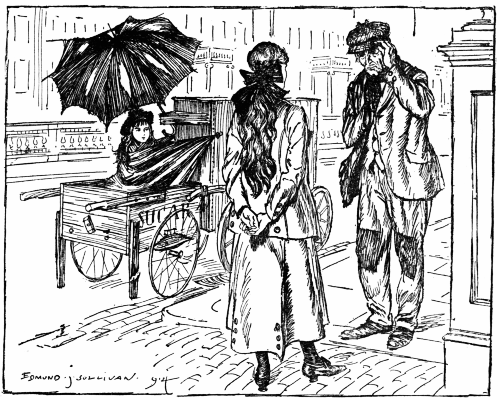
Obvious punctuation errors repaired. Some of the images of the paintings were moved from their original locations in the text to positions where the actual stories occur. Below is a list of the pages that the paintings originally followed:
| Charlie the Cox | page 12 |
| Ant Lion | page 44 |
| A Spell for a Fairy | page 92 |
| Fleur-de-Lis | page 124 |
Page 56, "abear" changed to "bear" (I can't bear)
Page 125, "their" changed to "there" (there is only our)
Page 125, "Barbette" changed to "Babette" (Babette, the elderly)
Page 138, "air" changed to "hair" (her front hair was)
End of the Project Gutenberg EBook of Princess Mary's Gift Book, by Various
*** END OF THIS PROJECT GUTENBERG EBOOK PRINCESS MARY'S GIFT BOOK ***
***** This file should be named 39592-h.htm or 39592-h.zip *****
This and all associated files of various formats will be found in:
http://www.gutenberg.org/3/9/5/9/39592/
Produced by Chris Curnow, Emmy and the Online Distributed
Proofreading Team at http://www.pgdp.net
Updated editions will replace the previous one--the old editions
will be renamed.
Creating the works from public domain print editions means that no
one owns a United States copyright in these works, so the Foundation
(and you!) can copy and distribute it in the United States without
permission and without paying copyright royalties. Special rules,
set forth in the General Terms of Use part of this license, apply to
copying and distributing Project Gutenberg-tm electronic works to
protect the PROJECT GUTENBERG-tm concept and trademark. Project
Gutenberg is a registered trademark, and may not be used if you
charge for the eBooks, unless you receive specific permission. If you
do not charge anything for copies of this eBook, complying with the
rules is very easy. You may use this eBook for nearly any purpose
such as creation of derivative works, reports, performances and
research. They may be modified and printed and given away--you may do
practically ANYTHING with public domain eBooks. Redistribution is
subject to the trademark license, especially commercial
redistribution.
*** START: FULL LICENSE ***
THE FULL PROJECT GUTENBERG LICENSE
PLEASE READ THIS BEFORE YOU DISTRIBUTE OR USE THIS WORK
To protect the Project Gutenberg-tm mission of promoting the free
distribution of electronic works, by using or distributing this work
(or any other work associated in any way with the phrase "Project
Gutenberg"), you agree to comply with all the terms of the Full Project
Gutenberg-tm License available with this file or online at
www.gutenberg.org/license.
Section 1. General Terms of Use and Redistributing Project Gutenberg-tm
electronic works
1.A. By reading or using any part of this Project Gutenberg-tm
electronic work, you indicate that you have read, understand, agree to
and accept all the terms of this license and intellectual property
(trademark/copyright) agreement. If you do not agree to abide by all
the terms of this agreement, you must cease using and return or destroy
all copies of Project Gutenberg-tm electronic works in your possession.
If you paid a fee for obtaining a copy of or access to a Project
Gutenberg-tm electronic work and you do not agree to be bound by the
terms of this agreement, you may obtain a refund from the person or
entity to whom you paid the fee as set forth in paragraph 1.E.8.
1.B. "Project Gutenberg" is a registered trademark. It may only be
used on or associated in any way with an electronic work by people who
agree to be bound by the terms of this agreement. There are a few
things that you can do with most Project Gutenberg-tm electronic works
even without complying with the full terms of this agreement. See
paragraph 1.C below. There are a lot of things you can do with Project
Gutenberg-tm electronic works if you follow the terms of this agreement
and help preserve free future access to Project Gutenberg-tm electronic
works. See paragraph 1.E below.
1.C. The Project Gutenberg Literary Archive Foundation ("the Foundation"
or PGLAF), owns a compilation copyright in the collection of Project
Gutenberg-tm electronic works. Nearly all the individual works in the
collection are in the public domain in the United States. If an
individual work is in the public domain in the United States and you are
located in the United States, we do not claim a right to prevent you from
copying, distributing, performing, displaying or creating derivative
works based on the work as long as all references to Project Gutenberg
are removed. Of course, we hope that you will support the Project
Gutenberg-tm mission of promoting free access to electronic works by
freely sharing Project Gutenberg-tm works in compliance with the terms of
this agreement for keeping the Project Gutenberg-tm name associated with
the work. You can easily comply with the terms of this agreement by
keeping this work in the same format with its attached full Project
Gutenberg-tm License when you share it without charge with others.
1.D. The copyright laws of the place where you are located also govern
what you can do with this work. Copyright laws in most countries are in
a constant state of change. If you are outside the United States, check
the laws of your country in addition to the terms of this agreement
before downloading, copying, displaying, performing, distributing or
creating derivative works based on this work or any other Project
Gutenberg-tm work. The Foundation makes no representations concerning
the copyright status of any work in any country outside the United
States.
1.E. Unless you have removed all references to Project Gutenberg:
1.E.1. The following sentence, with active links to, or other immediate
access to, the full Project Gutenberg-tm License must appear prominently
whenever any copy of a Project Gutenberg-tm work (any work on which the
phrase "Project Gutenberg" appears, or with which the phrase "Project
Gutenberg" is associated) is accessed, displayed, performed, viewed,
copied or distributed:
This eBook is for the use of anyone anywhere at no cost and with
almost no restrictions whatsoever. You may copy it, give it away or
re-use it under the terms of the Project Gutenberg License included
with this eBook or online at www.gutenberg.org
1.E.2. If an individual Project Gutenberg-tm electronic work is derived
from the public domain (does not contain a notice indicating that it is
posted with permission of the copyright holder), the work can be copied
and distributed to anyone in the United States without paying any fees
or charges. If you are redistributing or providing access to a work
with the phrase "Project Gutenberg" associated with or appearing on the
work, you must comply either with the requirements of paragraphs 1.E.1
through 1.E.7 or obtain permission for the use of the work and the
Project Gutenberg-tm trademark as set forth in paragraphs 1.E.8 or
1.E.9.
1.E.3. If an individual Project Gutenberg-tm electronic work is posted
with the permission of the copyright holder, your use and distribution
must comply with both paragraphs 1.E.1 through 1.E.7 and any additional
terms imposed by the copyright holder. Additional terms will be linked
to the Project Gutenberg-tm License for all works posted with the
permission of the copyright holder found at the beginning of this work.
1.E.4. Do not unlink or detach or remove the full Project Gutenberg-tm
License terms from this work, or any files containing a part of this
work or any other work associated with Project Gutenberg-tm.
1.E.5. Do not copy, display, perform, distribute or redistribute this
electronic work, or any part of this electronic work, without
prominently displaying the sentence set forth in paragraph 1.E.1 with
active links or immediate access to the full terms of the Project
Gutenberg-tm License.
1.E.6. You may convert to and distribute this work in any binary,
compressed, marked up, nonproprietary or proprietary form, including any
word processing or hypertext form. However, if you provide access to or
distribute copies of a Project Gutenberg-tm work in a format other than
"Plain Vanilla ASCII" or other format used in the official version
posted on the official Project Gutenberg-tm web site (www.gutenberg.org),
you must, at no additional cost, fee or expense to the user, provide a
copy, a means of exporting a copy, or a means of obtaining a copy upon
request, of the work in its original "Plain Vanilla ASCII" or other
form. Any alternate format must include the full Project Gutenberg-tm
License as specified in paragraph 1.E.1.
1.E.7. Do not charge a fee for access to, viewing, displaying,
performing, copying or distributing any Project Gutenberg-tm works
unless you comply with paragraph 1.E.8 or 1.E.9.
1.E.8. You may charge a reasonable fee for copies of or providing
access to or distributing Project Gutenberg-tm electronic works provided
that
- You pay a royalty fee of 20% of the gross profits you derive from
the use of Project Gutenberg-tm works calculated using the method
you already use to calculate your applicable taxes. The fee is
owed to the owner of the Project Gutenberg-tm trademark, but he
has agreed to donate royalties under this paragraph to the
Project Gutenberg Literary Archive Foundation. Royalty payments
must be paid within 60 days following each date on which you
prepare (or are legally required to prepare) your periodic tax
returns. Royalty payments should be clearly marked as such and
sent to the Project Gutenberg Literary Archive Foundation at the
address specified in Section 4, "Information about donations to
the Project Gutenberg Literary Archive Foundation."
- You provide a full refund of any money paid by a user who notifies
you in writing (or by e-mail) within 30 days of receipt that s/he
does not agree to the terms of the full Project Gutenberg-tm
License. You must require such a user to return or
destroy all copies of the works possessed in a physical medium
and discontinue all use of and all access to other copies of
Project Gutenberg-tm works.
- You provide, in accordance with paragraph 1.F.3, a full refund of any
money paid for a work or a replacement copy, if a defect in the
electronic work is discovered and reported to you within 90 days
of receipt of the work.
- You comply with all other terms of this agreement for free
distribution of Project Gutenberg-tm works.
1.E.9. If you wish to charge a fee or distribute a Project Gutenberg-tm
electronic work or group of works on different terms than are set
forth in this agreement, you must obtain permission in writing from
both the Project Gutenberg Literary Archive Foundation and Michael
Hart, the owner of the Project Gutenberg-tm trademark. Contact the
Foundation as set forth in Section 3 below.
1.F.
1.F.1. Project Gutenberg volunteers and employees expend considerable
effort to identify, do copyright research on, transcribe and proofread
public domain works in creating the Project Gutenberg-tm
collection. Despite these efforts, Project Gutenberg-tm electronic
works, and the medium on which they may be stored, may contain
"Defects," such as, but not limited to, incomplete, inaccurate or
corrupt data, transcription errors, a copyright or other intellectual
property infringement, a defective or damaged disk or other medium, a
computer virus, or computer codes that damage or cannot be read by
your equipment.
1.F.2. LIMITED WARRANTY, DISCLAIMER OF DAMAGES - Except for the "Right
of Replacement or Refund" described in paragraph 1.F.3, the Project
Gutenberg Literary Archive Foundation, the owner of the Project
Gutenberg-tm trademark, and any other party distributing a Project
Gutenberg-tm electronic work under this agreement, disclaim all
liability to you for damages, costs and expenses, including legal
fees. YOU AGREE THAT YOU HAVE NO REMEDIES FOR NEGLIGENCE, STRICT
LIABILITY, BREACH OF WARRANTY OR BREACH OF CONTRACT EXCEPT THOSE
PROVIDED IN PARAGRAPH 1.F.3. YOU AGREE THAT THE FOUNDATION, THE
TRADEMARK OWNER, AND ANY DISTRIBUTOR UNDER THIS AGREEMENT WILL NOT BE
LIABLE TO YOU FOR ACTUAL, DIRECT, INDIRECT, CONSEQUENTIAL, PUNITIVE OR
INCIDENTAL DAMAGES EVEN IF YOU GIVE NOTICE OF THE POSSIBILITY OF SUCH
DAMAGE.
1.F.3. LIMITED RIGHT OF REPLACEMENT OR REFUND - If you discover a
defect in this electronic work within 90 days of receiving it, you can
receive a refund of the money (if any) you paid for it by sending a
written explanation to the person you received the work from. If you
received the work on a physical medium, you must return the medium with
your written explanation. The person or entity that provided you with
the defective work may elect to provide a replacement copy in lieu of a
refund. If you received the work electronically, the person or entity
providing it to you may choose to give you a second opportunity to
receive the work electronically in lieu of a refund. If the second copy
is also defective, you may demand a refund in writing without further
opportunities to fix the problem.
1.F.4. Except for the limited right of replacement or refund set forth
in paragraph 1.F.3, this work is provided to you 'AS-IS', WITH NO OTHER
WARRANTIES OF ANY KIND, EXPRESS OR IMPLIED, INCLUDING BUT NOT LIMITED TO
WARRANTIES OF MERCHANTABILITY OR FITNESS FOR ANY PURPOSE.
1.F.5. Some states do not allow disclaimers of certain implied
warranties or the exclusion or limitation of certain types of damages.
If any disclaimer or limitation set forth in this agreement violates the
law of the state applicable to this agreement, the agreement shall be
interpreted to make the maximum disclaimer or limitation permitted by
the applicable state law. The invalidity or unenforceability of any
provision of this agreement shall not void the remaining provisions.
1.F.6. INDEMNITY - You agree to indemnify and hold the Foundation, the
trademark owner, any agent or employee of the Foundation, anyone
providing copies of Project Gutenberg-tm electronic works in accordance
with this agreement, and any volunteers associated with the production,
promotion and distribution of Project Gutenberg-tm electronic works,
harmless from all liability, costs and expenses, including legal fees,
that arise directly or indirectly from any of the following which you do
or cause to occur: (a) distribution of this or any Project Gutenberg-tm
work, (b) alteration, modification, or additions or deletions to any
Project Gutenberg-tm work, and (c) any Defect you cause.
Section 2. Information about the Mission of Project Gutenberg-tm
Project Gutenberg-tm is synonymous with the free distribution of
electronic works in formats readable by the widest variety of computers
including obsolete, old, middle-aged and new computers. It exists
because of the efforts of hundreds of volunteers and donations from
people in all walks of life.
Volunteers and financial support to provide volunteers with the
assistance they need are critical to reaching Project Gutenberg-tm's
goals and ensuring that the Project Gutenberg-tm collection will
remain freely available for generations to come. In 2001, the Project
Gutenberg Literary Archive Foundation was created to provide a secure
and permanent future for Project Gutenberg-tm and future generations.
To learn more about the Project Gutenberg Literary Archive Foundation
and how your efforts and donations can help, see Sections 3 and 4
and the Foundation information page at www.gutenberg.org
Section 3. Information about the Project Gutenberg Literary Archive
Foundation
The Project Gutenberg Literary Archive Foundation is a non profit
501(c)(3) educational corporation organized under the laws of the
state of Mississippi and granted tax exempt status by the Internal
Revenue Service. The Foundation's EIN or federal tax identification
number is 64-6221541. Contributions to the Project Gutenberg
Literary Archive Foundation are tax deductible to the full extent
permitted by U.S. federal laws and your state's laws.
The Foundation's principal office is located at 4557 Melan Dr. S.
Fairbanks, AK, 99712., but its volunteers and employees are scattered
throughout numerous locations. Its business office is located at 809
North 1500 West, Salt Lake City, UT 84116, (801) 596-1887. Email
contact links and up to date contact information can be found at the
Foundation's web site and official page at www.gutenberg.org/contact
For additional contact information:
Dr. Gregory B. Newby
Chief Executive and Director
gbnewby@pglaf.org
Section 4. Information about Donations to the Project Gutenberg
Literary Archive Foundation
Project Gutenberg-tm depends upon and cannot survive without wide
spread public support and donations to carry out its mission of
increasing the number of public domain and licensed works that can be
freely distributed in machine readable form accessible by the widest
array of equipment including outdated equipment. Many small donations
($1 to $5,000) are particularly important to maintaining tax exempt
status with the IRS.
The Foundation is committed to complying with the laws regulating
charities and charitable donations in all 50 states of the United
States. Compliance requirements are not uniform and it takes a
considerable effort, much paperwork and many fees to meet and keep up
with these requirements. We do not solicit donations in locations
where we have not received written confirmation of compliance. To
SEND DONATIONS or determine the status of compliance for any
particular state visit www.gutenberg.org/donate
While we cannot and do not solicit contributions from states where we
have not met the solicitation requirements, we know of no prohibition
against accepting unsolicited donations from donors in such states who
approach us with offers to donate.
International donations are gratefully accepted, but we cannot make
any statements concerning tax treatment of donations received from
outside the United States. U.S. laws alone swamp our small staff.
Please check the Project Gutenberg Web pages for current donation
methods and addresses. Donations are accepted in a number of other
ways including checks, online payments and credit card donations.
To donate, please visit: www.gutenberg.org/donate
Section 5. General Information About Project Gutenberg-tm electronic
works.
Professor Michael S. Hart was the originator of the Project Gutenberg-tm
concept of a library of electronic works that could be freely shared
with anyone. For forty years, he produced and distributed Project
Gutenberg-tm eBooks with only a loose network of volunteer support.
Project Gutenberg-tm eBooks are often created from several printed
editions, all of which are confirmed as Public Domain in the U.S.
unless a copyright notice is included. Thus, we do not necessarily
keep eBooks in compliance with any particular paper edition.
Most people start at our Web site which has the main PG search facility:
www.gutenberg.org
This Web site includes information about Project Gutenberg-tm,
including how to make donations to the Project Gutenberg Literary
Archive Foundation, how to help produce our new eBooks, and how to
subscribe to our email newsletter to hear about new eBooks.